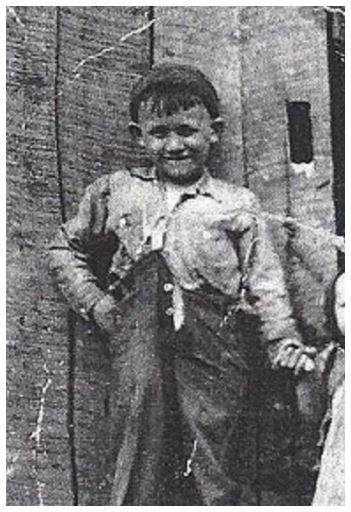
Tater:

By Carl L. Thoburn
With Nancy Thoburn and Beth Thoburn Fitch
Web version adapted by Steve Thoburn
© 2014
Jump to Section: |
|
|
|
|
Dedication
This book is dedicated to my sister, Jean Rinkes. Jean is two years older than me, and is my closest sibling. She was married to Dean Rinkes just as I entered my senior year of high school. She and Dean moved into the large homestead where she still lives today, in the farmhouse where we were born eighty-some years ago. Over the last six decades a lot has changed, with modern conveniences and remodeling and décor, but one thing has remained the same: Jean's hospitality to all of us, our children, grand-children and great-grandchildren. Jean has hosted many family reunions over the years, and whether there were two visitors or two hundred, she always had that favorite raspberry pie waiting just for me.
Acknowledgements
Many thanks to my wife Nancy; and our children, Steve, Beth, and Anne; who kindly offered encouragement and assistance when it was needed. Steve helped with historical research and wrote the Foreword, Beth typed and edited my rough draft, and Anne helped in many practical ways such as driving us to appointments and bringing meals to us when we were laid up after injuries or illness.
On April 5, 1806 President Thomas Jefferson took up his quill pen and signed a large number of Land Patents transferring huge swaths of Federal lands in the Ohio Territory to private ownership. It was undoubtedly tedious work, as each deed had to be signed individually. (Congress amended the law in 1835 to allow an agent to do it in the President’s stead after President Andrew Jackson complained that his gimpy arm, which had been injured in a gunfight in 1813, made this task intolerable.)
Ohio was the first truly American state. In addition to the thirteen original colonies, the states of Vermont, Kentucky and Tennessee had been carved out of land seceded from existing states. Ohio, the 17th state, was the first state to be intentionally created by an act of the United States Congress, the others merely being recognized as states after the fact. The surveying methods used to divide the land into sections would also prove to be the model for future states during the westward expansion of the country.
Of the many deeds signed that day by President Jefferson, one section, part of the Steubenville Land District and located in the Northeast Quarter of Section 10, Township 8, Range 4, was eventually purchased by a man named Jacob Meyers, who is listed as a carpenter in the history of the early settlers of Cadiz, Ohio. He apparently invested in a larger section of land than he needed for himself since he almost immediately sold a portion to a man named John Fuller. It took men of some means to buy federal land in those days, as the smallest parcel made available by the government was 320 acres in size. It would appear that both Meyers and Fuller settled part of their land and sold off the rest in order to pay off the loan from the government more quickly.
With the loan on the land paid in full, John Fuller sold a 110-acre section to a man named John Nicholson on September 6, 1808. The land would remain in the Nicholson family, passing from generation to generation, for the next 87 years. Tax records indicate that it was John Nicholson who built the brick farmhouse which has been continuously occupied for approximately 200 years. Though the farm was typically used for growing crops and raising livestock, census forms show that the Nicholson family also operated a cooper business for a while. The farm was sold after the death of a descendant (also named John Nicholson) to a man named Thomas J. Gillespie on December 17, 1895 for the sum of $2,400. His son, John L. Gillespie subsequently purchased the land from his mother on April 1, 1902 after the death of his father.
John L. Gillespie sold the land to Robert M. Francis and his wife Viola on October 30, 1909 for $11,000, who kept the land until it was sold to a man named Albert G. Wolfe on February 28, 1927. Though the sales price was listed as being only $10, there is record of a mortgage taken at the Adena Commercial & Savings Bank on January 24, 1922 (subsequently transferred to the Ohio-Penn Joint Stock Land bank of Cleveland, Ohio) which was not fully satisfied until February 15, 1935. It would seem that in addition to the $10 listed on the deed, Albert Wolfe also assumed the mortgage payments. It is also interesting to note that at the time of the sale, Robert and Viola Francis had the deed notarized in Los Angeles County, California, indicating that they had decided to seek their fortunes out west.
Apparently, Wolfe rented the land out, as he is listed as a resident of Smithfield Village in Jefferson County, Ohio. In 1927 he took on a new tenant named Ralph W. Thoburn along with his wife Gertrude. The Thoburns bought the property from Wolfe on May 7, 1932 for the sum of One Dollar and assumed the remaining $4,500 on the mortgage with Ohio-Penn. Five weeks after the sale was closed, they welcomed their 9th child to the household, a baby boy they named Carl Lemoyne Thoburn.
1932 saw the 200th anniversary of the birth of George Washington. Prohibition had another year to run before repeal. Franklin Delano Roosevelt was elected for the first of his four presidential victories, replacing Herbert Hoover, and was inaugurated the following March. Unemployment during the Great Depression was 23.6%, just below the peak of 25% it would reach the following year. On July 8, 1932 the DOW dropped to 41.22, its lowest point during the entire depression era.
In Japan, a group of junior military officers assassinated the Prime Minister, ushering in an era of military rule which would continue until the end of World War II. Adolph Hitler applied for and was granted German citizenship, allowing him to run for president against Hindenburg. Though he lost, the Nazi party claimed enough seats in the election that Hitler became a major power broker in the new government, leading to his being named Chancellor in January of the following year.
Not everyone in the US noticed these foreign events. Jack Benny was on the radio for the first time. The Winter Olympics was held in Lake Placid, New York in February, followed in July by the Summer Olympics in Los Angeles. Former Olympic swimmer Johnny Weissmuller starred in the first of his twelve Tarzan films, though MGM’s Grand Hotel would win Best Picture honors. Louis Armstrong, Bing Crosby, Duke Ellington, Rudy Vallee and Fred Astaire had the top five hit songs in music. Babe Ruth “called his shot” in the 5th inning of Game 3 of the World Series that October.
It was on this small farm and into this changing world that Carl Lemoyne “Tater” Thoburn was born on June 9, 1932. He will tell you his story in his own words on the following pages.
Steve Thoburn
Westlake, Ohio
June 9, 2014
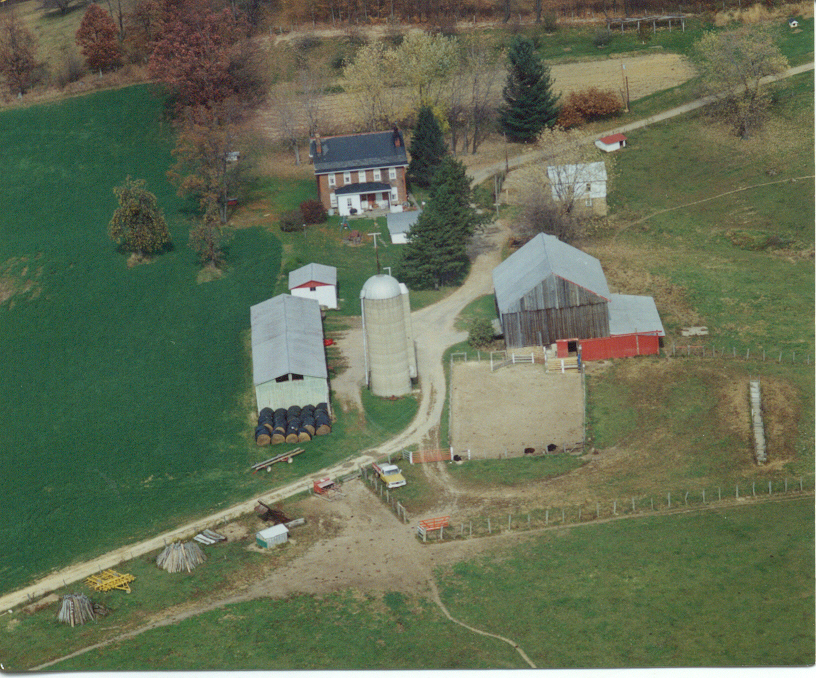
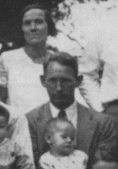
Age 1, with my parents
I was born in the living room of the family farm ten miles southeast of Cadiz, Ohio on June 9, 1932, to Ralph William and Gertrude Eliza Goff Thoburn. I was the ninth of ten children born in the family. My parents named me Carl Lemoyne, after two neighbor farmers, whose names were Carl M. and Lemoyne S. I guess when you have nine children you have to get creative with the names. However, for some reason, the doctor had written the name of 'Ralph Thoburn, Jr.' on my original birth certificate. It wasn’t until 1976 that my mother had it officially changed to Carl Lemoyne. I'm very glad she did this, or I would have had difficulty later in life, for example, in 1994, when my wife and I traveled to Japan to see my daughter Beth and her family. Of course, I could have tried collecting two Social Security checks, and voting twice…just kidding! For a while, my nephews on the farm got a big kick out of calling me “Uncle Ralph”.
My mother was one of twelve siblings, and my father one of fourteen. My father was born on October 25, 1896, and my mother was born on March 22, 1898. My father’s first wife, Lavenia, died in 1924 of leukemia, leaving my dad with my three oldest siblings. Lavenia Maude was seven, Ethel Jeannette was five, and James William was three. His wife Lavenia was an organist in the local church and my father was at one time a Sunday School Superintendent. My father was only twenty-eight years old when he lost his first wife, and in later years I came to believe that he really never got over her death.
My father married my mother in 1926. My mother had one child, Doris Mae Hanson, who was five years old at the time. This made them a family of six from the start! Between 1927 and 1938, my parents had six more children: Harold Kenneth, b. April 24, 1927; Gertrude Elizabeth (Betty), b. April 24, 1928; Robert Loren, b. May 19, 1929; Carolyn Jean b. September 9, 1930; myself in 1932; and six years later Nancy Lee was born on October 3rd , 1938.
I never had an aunt or uncle that I didn't like. For a boy with too many of them to count, that's saying something! It was always fun to have them visit the farm. My uncle J.D. was a big teaser. One time he went with me and my brother Bob, along with a neighbor girl who was around twelve, to go swimming in the old strip mine, which in some places was very deep. The neighbor girl didn't know how to swim, so she just put her feet in the water. He told us boys to be quiet and not say a word. He kept saying he wished he could swim. We knew he was a good swimmer, as he had swum across the Ohio River several times. Finally, after repeating he wished he could swim, he grabbed her and said "Let's just go in anyhow!" As he took her into the water, she began screaming, and he took her way out in the deep area and just floated there. After a little while he brought her back to shore. I don't think she wanted to go swimming with us again!
We often played cards with some of our uncles, and there were times when we played all night and then we boys went out to do the morning chores. This was when we didn't have to go to school the next day. My mother was an excellent card player, especially in Euchre (pronounced "yoo-ker"). My Uncle Doc (Albert) was great at playing horseshoes. I don't know where he got the nickname Doc, because he didn't go to college. I'm not sure if he even finished grade school. They say close only counts in horseshoes, but after playing with him I don't necessarily believe that. If I would throw a ringer, he would either throw two ringers, or he'd knock mine off and throw a ringer. When I threw two ringers, he'd also throw two on top of that.
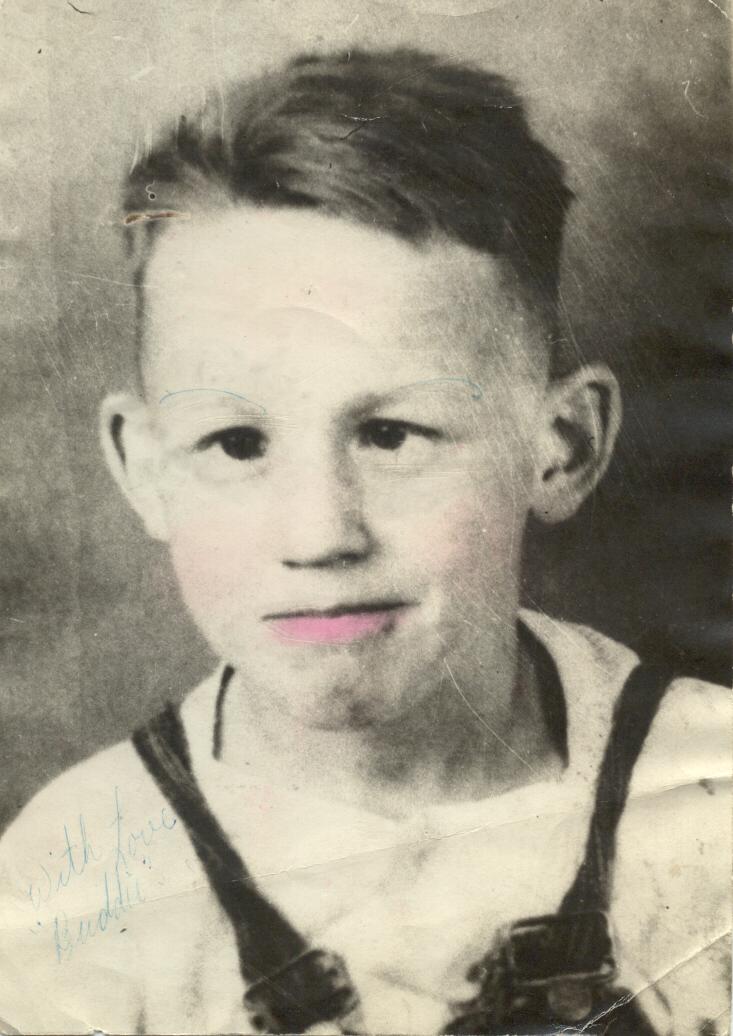
Country Kid.
Being a country boy, born during the Depression, I didn’t have all the material benefits that children enjoy today. We didn’t have any indoor plumbing, furnace, telephone, or electricity, among other things. We burned coal and wood in some of the fireplaces in the 8-room house. We had a coal stove in the kitchen to cook and heat that part of the house. The house also had a large attic and a big basement cellar, which was used to store coal, wood, and the hundreds of jars of home-canned vegetables and fruit. It was the coolest place to be in the hot summer, but we didn’t go there to relax because of the dark and dreary place that it was.
In addition to being a farmer, my dad was a mechanic and a coal miner. He had a good job being the oiler on a steam shovel. The largest steam shovels at that time were located in that area. I don’t believe my dad worked on any of those, however. I did go back with my wife and young children, over thirty years later, and see the one called “The Silver Spade”.

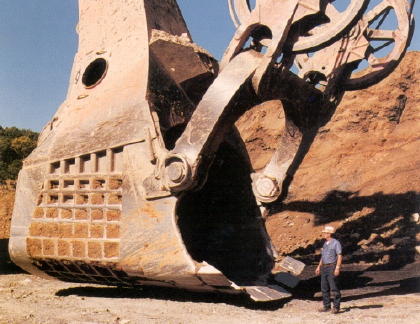
The Silver Spade:
Over 12 Stories Tall; Operating weight - 14,000,000 lb
Capacity - 105 cubic yds; 350,000 lbs dirt per scoop; 13,500 hp
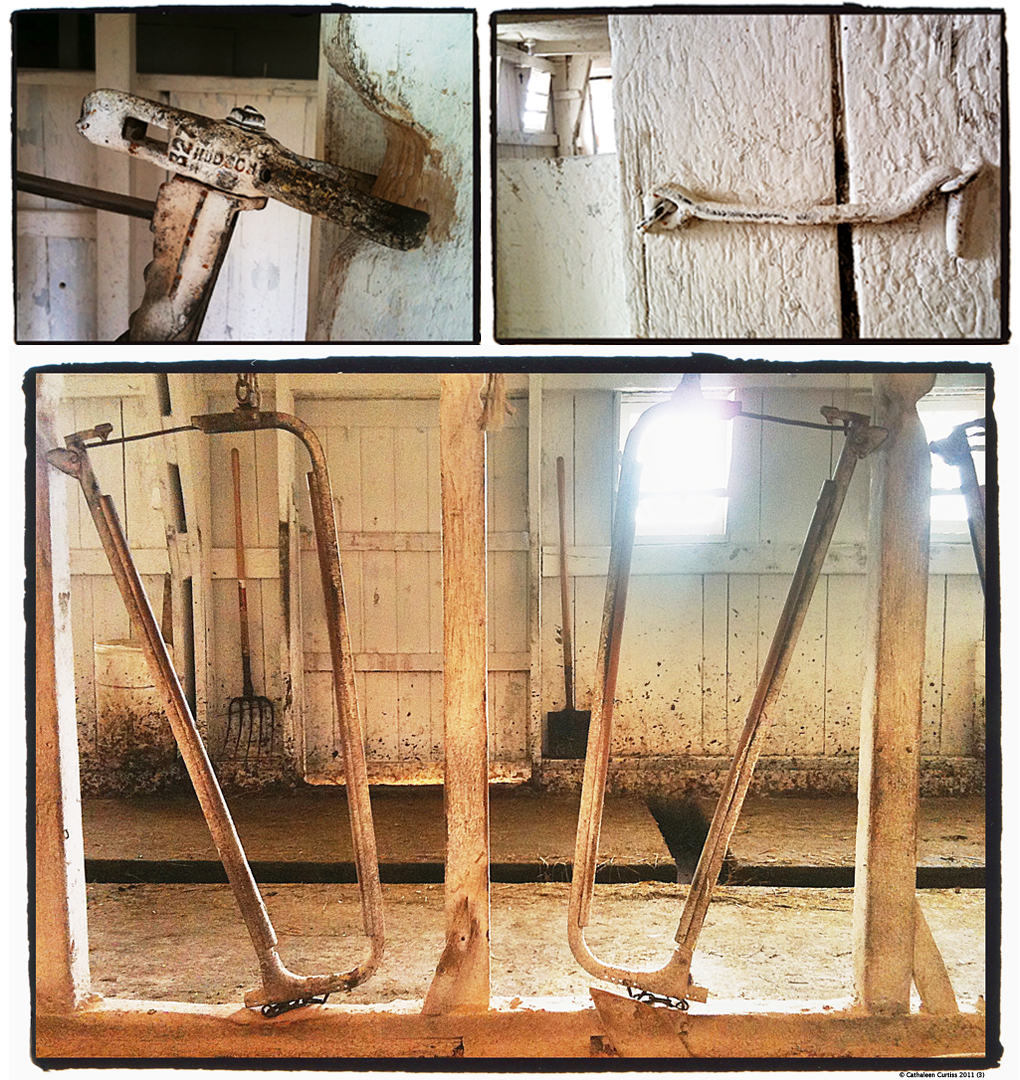
Stanchions in our barn
(Used to keep cattle in place while milking)
My father had a dairy farm where we milked up to 16 cows by hand, each morning and evening. We gave many of the cows special names, like 'Snowball', or 'Seven' for the one with a seven on her forehead. I even called one 'Goofy' because of her eyes. Shame on me. We had a mixture of Holstein, Guernsey, and Jersey cows. Holsteins are noted for their quantity of milk, while Jerseys are known for having more butterfat in theirs.
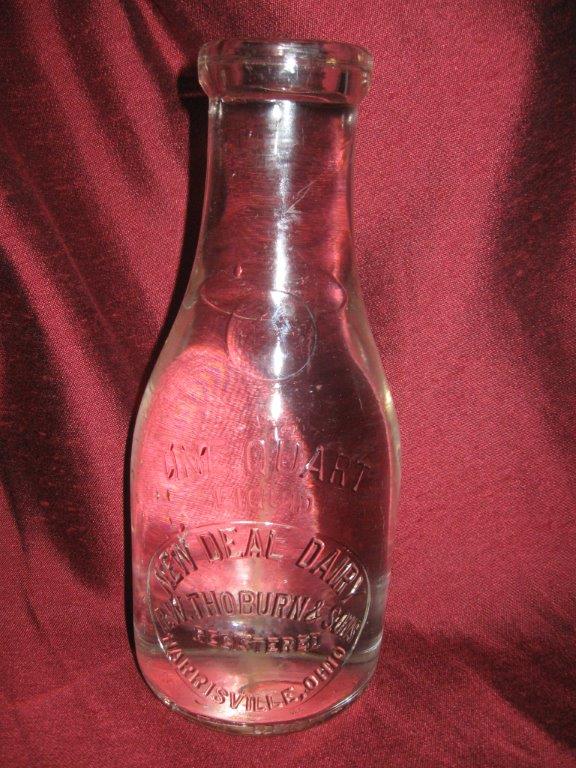
Milk Bottle
We sold milk in five or ten gallon cans, to a dairy where they pasteurized the milk and sold it to consumers. I mention the size of the cans because we had to carry them out to the main road, three-tenths of a mile. It was a narrow lane and the milk truck wouldn't come down it. It also had two hills, one of which was very steep. Many times in the winter we would get stuck going up that hill and had to dig ourselves out. It took two of us to carry those cans out to the highway. When I was 65 I was diagnosed with a degenerative disc. The specialist said it was a long time coming. I told him it probably was because of carrying those milk cans, and he said I was probably right. Dad named his dairy "The R.W. Thoburn and Sons NEW DEAL Dairy", after President Roosevelt's programs. He also had a milk route where he delivered milk to different families in the nearby area. I often had to go with him to take the milk up to the porch. I remember when it was payday, I would ask for some candy, and my dad usually got me a sack of what we called "hardtack". It lasted a good while, which made it all the better.
As years wore on and we all grew up with kids and grandkids of our own, those old milk bottles with the Thoburn Dairy imprint grew scarce. The few that were around were sought after by many family members, and I had not been able to come by one. A few years ago, when I was back on the farm, my nephew Gary said he had a present for me. This was very unusual and I thought it might be a joke, since I know he likes to tease. Of course, my family knows I don't like to tease. Ha ha! I'm glad I took him seriously, though, because in the bag was one of those old quart milk bottles. It is a gift that I will cherish for the rest of my life; thank you again, Gary!
We had a garage built close to the house, made of blocks. It was big enough to house two cars. It had a separate room for a spring house. The spring house was in the back, and consisted of a concrete portion built like a big bathtub. This was fed by cool spring water, in which we stored milk and butter to keep them cool in warm weather. It did a rather good job, considering we didn't have a refrigerator or ice box back then. There were several beautiful fresh water springs on the farm, but some of them disappeared after the strip mines came through mid-20th-century.
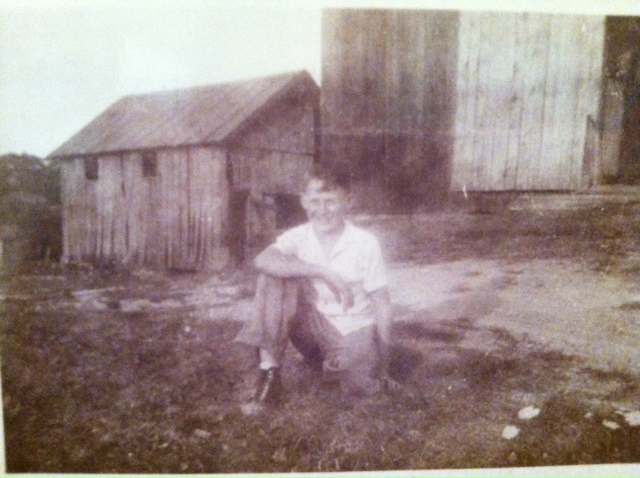
Tater By the barn
Other buildings on the farm included a large barn on stone and concrete foundations, two sheep barns, a corncrib, and a two-story chicken house. The chicken house looked a lot like a real house, and it seems that it may have been a servant's or hired help house in its earlier days. My children and grandchildren loved to climb the steps to the upper story, and gather eggs. Carolyn, my oldest granddaughter, has an early memory of doing that with "Great-Nana", as she called my mother. In more recent times, my daughter Beth has kept chickens of her own, and so has granddaughter Ginny.
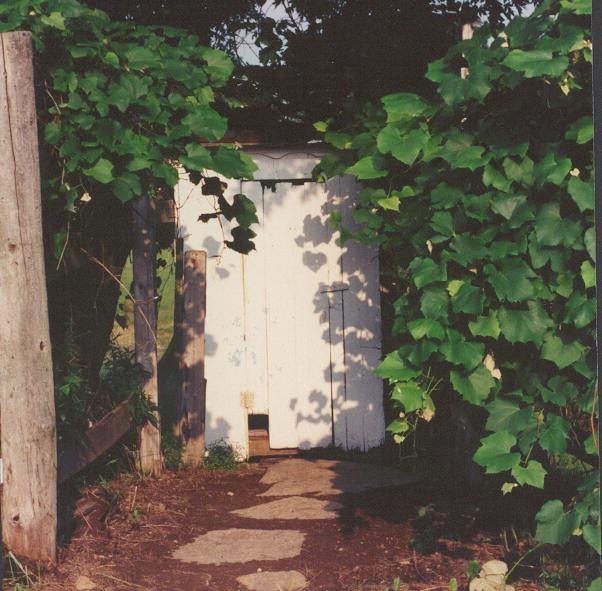
Relief Station - A Two-Seater!
At times we would play in the top part of the corncrib around the opening where the tractor was kept. Many times, I would play in the dirt underneath the corncrib. Guess what I played…I played I was a farmer. It certainly was more fun than real farming, though not very productive! One evening, out by the barn, my brother and I fell out over something and he hit me on the forehead with a board, which unfortunately, had a nail in it. I ended up at the doctor's getting stitches and my brother was in trouble with my dad. I felt grateful later that God spared my good eye.
Down in the valley, at the far end of the farm, a coal train ran past regularly. In fact the railroad company had twelve acres there, between the tracks and our farm, which they let us use. Later it became ours to keep. Now, when I go home, I miss the sound of the train running down the tracks. One day, as a young lad, I got up on the wooden rail fence to see the train going down the railroad. I fell off the rail and landed in the elderberry bush. I still have the scar over my right eye.
When we had to go to the bathroom, we either had to use the outhouse, or, if it was night, a chamber pot. Later in life I referred to it as ‘the relief station’. I often wondered why there were two holes to sit on in the outhouse, as only one of us would be in there at a time. Maybe it was for my mother to use when she was training us to go on our own. I do know that if you went there at night you had to be careful where you put the flashlight! The outhouse was still in working order when my kids were growing up, and they thought it very handy for long summer days playing outside.
We may not have had a lot of material things, but we always had plenty to eat, and God’s wonderful nature to enjoy. The farm had these rolling, green hills and valleys with two large pastures for animals to graze. Close to the farm house was a natural spring with good cool water to drink. Running through both pastures were small streams where the farm animals could drink and for children like me to play and wade in. It was fun catching tadpoles and frogs and going back to the house all dirty and wet.
As for food, we had a huge vegetable garden where we raised sweet corn, potatoes, green beans, lima beans, carrots, onions, radishes, peas, lettuce, cabbage, turnips, tomatoes and other delicious vegetables that God so bountifully supplied. We also had plenty of fruit throughout the summer. We had strawberries and cherries in early June. The cherries I loved the best were the Queen Annes. Today they are called Rainier. We picked the sour cherries and mother made delicious, and I mean delicious, pies.
One of my favorite delights as a young lad was climbing ‘way up in the cherry tree and eating those beautiful, tasty cherries. One day, I saw my mother and her friend come out of the house to look at the cherries. Her friend, who I always called Aunt Wacker, must have been seven feet tall, because she could just reach up and pick cherries off the branches. Of course, being a nice young lad as I was, I had to dispose of the seeds from the ones I ate, so I tried my best to spit them out and let them fall on her head. I heard her tell my mother that she should hurry and pick the cherries before the birds eat them. My mother just smiled and said, “It is a two-legged bird alright, and I know his name!” My, did I get quiet until they went back in the house! I didn’t get a spanking later. All I can remember is that in the end, we all had a big laugh, and I promised never to do that again.
I can’t say I have never broken a promise, because in my heart, I know I have. My mother did have a way of handling this ornery, hay-seed boy. At times, all she would have to do is look at me, and I would be silent. Her discipline was very gentle, but very effective.
Cherries and strawberries weren’t the only fruit we enjoyed, though. Around the Fourth of July came wild raspberry picking time. I enjoyed getting up at the crack of dawn and going raspberry picking around the fences and other places, even if there was dew on the grass and I got my pant legs wet. When we came in from picking, you could tell I loved black raspberries just by looking at my mouth. To this day, my favorite pie is black raspberry pie.
Then, in August, came blackberry picking time, and also peaches, pears, plums and apple trees. God blessed us with a wonderful variety of fruits and vegetables to enjoy, and I’m thankful for the taste buds God gave me! Too often we overlook these blessings.
We also had meat from our livestock: pigs and chickens and eggs to enjoy. We cured ham and bacon, which we had during the cold winter months. I remember the grinding of meat into hamburgers and sausages in the kitchen. Our Sunday dinner often consisted of having chicken as the main meal. When I was old enough, I had to go catch a rooster or a chicken. Then I crossed their wings together and stretched out their necks and cut their heads off. The chicken would flop around a little after that. I thought about leaving this part out of the story, because now I don’t know if I could do it! But back then it was part of our livelihood.
We always enjoyed our mother’s homemade bread and buns, made with wheat we raised and had milled, topped off with churned butter that we made. She also made cottage cheese that we referred to as ‘smear dab’. She would make it in a pillow case and hang it on the clothes line until it was ready to eat. My, did it taste good! In addition to homemade butter we also made apple butter. To top this off, we had plenty of milk to drink. Many a night, I would break up a slice of bread and put it in a glass with sugar and milk in it for my snack before going to bed.
In addition to all the fresh fruit and vegetables we had to enjoy, my mother did a lot of canning. Among the items she canned were tomatoes, beans, peaches, cherries, raspberries, blackberries, pickles and beets. She also made blackberry and raspberry jam. For school lunch I almost always had a jam or peanut butter sandwich when I was in elementary school. No complaints here!
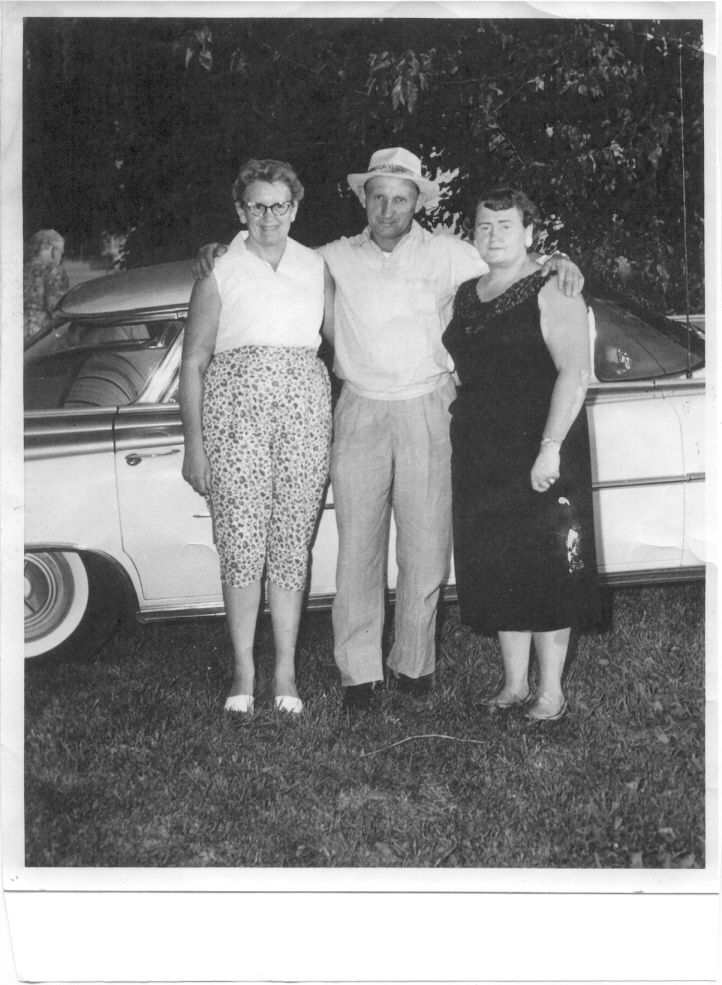
Venie, Jim, Ethel In 1959
Until recent years, the only time I saw my sister Lavenia, or 'Venie', as she preferred to be called in later years, was when I was in the fourth grade and she came to visit. Her visit was very short. In the 1990s she came back to a couple of family reunions.
Ethel, my next oldest sibling, was always nice to me and enjoyed coming to the farm with her husband. When our brother Jim died, Ethel received his two Purple hearts. They were very close, and he was living with her at the time of his death. Ethel and her husband, Charles, raised two daughters and I enjoyed knowing them. One of her daughters died in middle age of cancer and their other daughter now lives in Florida with her husband. Ethel is now deceased.
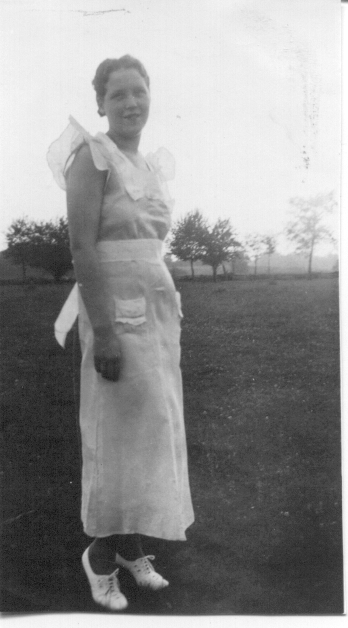
Doris Mae, 1936 age 15
Doris Mae was another one of my siblings that I really didn't get to know as a young lad, as she left home after finishing high school. She got a job in Martin's Ferry, Ohio, which is located along the Ohio River across from Wheeling, West Virginia. I was only seven when she left home to work in the city. She worked as a telephone operator. Back in those days the operators had to take messages, and she spent her work hours at the switchboard, pulling out and putting in plugs so that people could communicate with each other over the telephone. You needed to be careful what you said on the phone back then, as you probably were on a "party line", which meant that you shared your telephone line with other households. Doris Mae married Jack Frantz, and they raised two adorable daughters. When I was a senior in high school I often went to their home on the weekend.
When, after Pearl Harbor, the United States entered the Second World War in 1941, my oldest brother Jim joined the paratroops. He was twenty years old. He did service in Europe as a member of the 101st Airborne Division, which was one of the best fighting divisions in the Army. He was wounded jumping out over the Rhine River in Germany, and after recovering from his wounds, he went back, and was wounded a second time. He was rewarded with two Purple hearts. As a young kid I was mighty proud of him! After the war, Jim had no desire to further his education. I believe the war had had a terrible effect on him. He died at the age of fifty, from a heart attack.
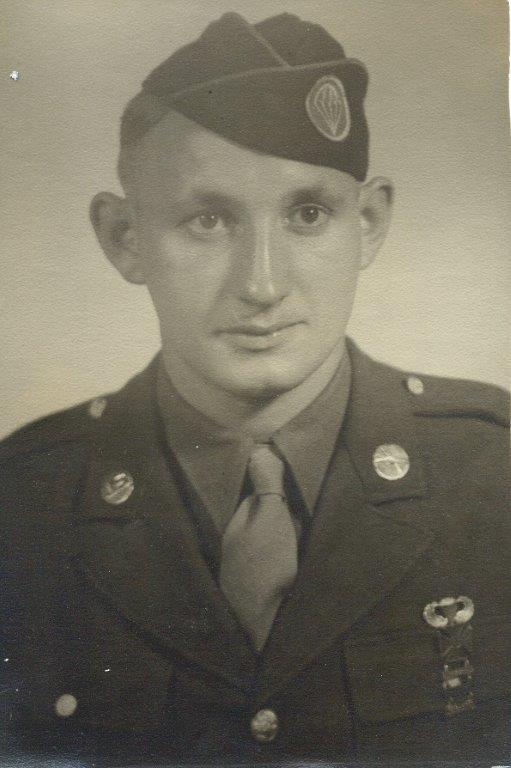
Jim - WWII Paratrooper
I must say that all of my dad's children from his first wife liked their stepmother, my mother, very much. My mother was a devoted Christian who lived her life by her example. I don't remember any unkind word that she said about anybody. She worked hard all her life doing her best to make us children and others happy. My mother would be up at the crack of dawn working. Many times when I got up I would look out the upstairs window and see her either picking vegetables out in the garden, or hoeing weeds. Even in the hour that she went to heaven to be with Jesus she had put a load of laundry in the wash. I miss that most about my mother, her wonderful example and her big smile even when things seemed to not go right. She would say, "God will provide", and He certainly did make a way for us.
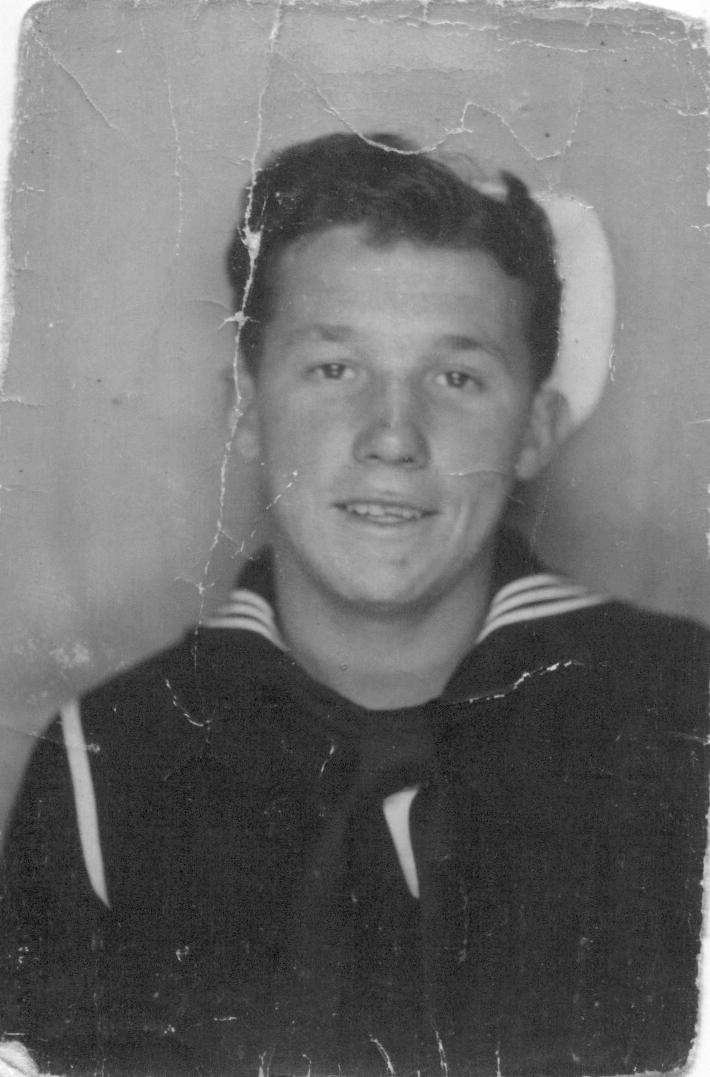
Harold Thoburn WWII
My second oldest brother Harold, born in 1927, was reserved and sincere. He was a very humble and spiritual person. He was also one of the "greatest generation"; he enlisted in the Navy in April 1945, while he was still in high school. The Superintendent of Schools informed us that if he had to leave before he graduated, he would still get his diploma. It turned out that he had to be in Richmond, Va., at 1 p.m. the day after graduation, in order to be inducted. I remember sitting in the kitchen the night before, because he was leaving immediately after graduation, and catching a train in Wheeling, W. Va. By this time, Germany had surrendered, and then Japan surrendered just as he was finishing boot camp at Great Lakes in Illinois. He served on the U.S.S. Corregidor, most of that time as the secretary to the Commander. He had been given that job because of his ability to type. He would come back from the service, marry his childhood sweetheart, JoAnn, go to college on the G.I. Bill, and have three stair-step children, just ahead of our three kids.
Harold became the county agricultural agent for Lorain County, Ohio, and was responsible for planting hundreds of trees all over the town of Medina, where he lived. The City of Medina, Ohio, page online includes the story: "Following retirement from the Ohio State Extension Service he [Harold Thoburn] was wondering what his next days would hold. As a devout Christian, he prayed asking God for direction. A short time later he woke up in the night (with) a vision of a tree lined street, which led up to heaven….This was the foundation for his many efforts over the next decade…Harold was instrumental in re-establishing the Shade Tree Commission. The Medina Kiwanis Club, of which he was a member, provided much of the labor for the project. In 1981, Medina received its first "Tree City USA" award and celebrated its 20 th year as a recipient in 2001.
It is fitting that a trail in the park there has been named in his honor, "The Harold Thoburn Memorial Trail".
Over sixty years later, my wife's nephew told her that there were two books on the genealogy of her family. If she was interested, he would contact the relative in Indiana and have him mail her the books. They came C.O.D. When the man sent the books, he noticed that her married name was Thoburn, which was the same name as someone who'd served on the same ship he had in the 1940s. He had been an officer on the Corregidor! I got his email address and sent him a picture of my brother, Harold. He wrote back that indeed, he knew my brother. His name was Robert Shoemaker. He had grown up about forty miles away from where I was reared! He recently sent a copy of a letter that he had sent to my brother after Harold left the Navy. The letter came with a recommendation of what a wonderful person my brother was. What an amazing turn of events, to find out that my wife was a relative of an officer of this ship over forty years ago! I will always cherish this letter, especially since my brother Harold passed away some time ago.
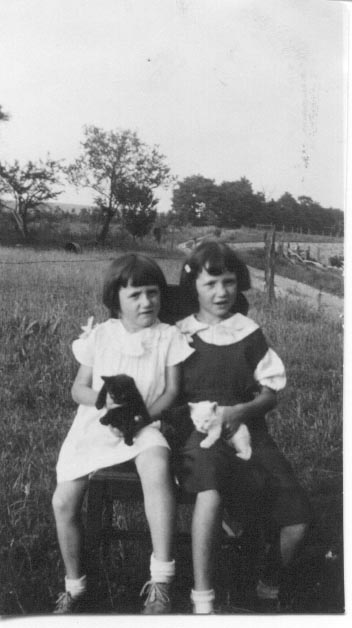
Jean and Betty
My sisters were all good to me and a blessing in my life. My sister Betty was born exactly one year after my brother Harold was born. They share their birthday with Shirley Temple. As a student that enjoys mathematics, I don't know the probability of two siblings sharing the same birth date.
Betty was a wonderful sister and I always enjoyed her company. Even in recent years we talked often on the phone. Betty got married soon after high school and raised six kids with her husband in a four-room cinderblock home built into the side of a mountain, with no running water inside. Betty's husband, Frank Zamski, was a coal miner. My wife Nancy met her around the time she was expecting her sixth child. When her children grew up, and her husband passed away, she bought a double-wide trailer to live in on the mountainside.
Betty's children were prosperous in life and enriched hers greatly. She loved flower gardening and spent countless hours in her gardens, which was evident as you drove by her home. Even when she was eighty years old, she loved riding her Harley with her friend Tony. Betty always told me that 'if you eat your Mother's Oats you wouldn't need to go to the doctor or take a lot of pills. She lived a happy and healthy life until she passed away in March 2011 at nearly eighty-three years of age.
Carolyn Jean, who went by her middle name, was born in 1930. She was born in the family farm house and still lives there today. I can't imagine living in the same place for my whole life! Since I married Nancy in 1956, we lived in eight different houses before settling in Arlington, Virginia, where we spent forty years and raised our children. Jean was always an extremely hard worker. After she married Dean Rinkes, they rented the farm from my mother. My younger sister, Nancy Lee, helped Jean and our mother keep the home fires burning. They were excellent cooks and were always busy either canning produce or taking care of the various farm chores. Dean rose early to do farm work, then went to a second job in the coal mine later in the day.
While I was in college, my mother asked if any of us boys wanted to come back and run the farm. None of us did. We agreed that she should sell the farm to Jean and Dean. This turned out to be a great thing, as my sister and her husband did a great job taking care of the farm and making improvements over the years. Jean was equally competent caring for livestock and helping with the men's work when necessary.
Also, what a blessing to be able to keep the farm in the family! What a joy it is to be able to go back every year and walk the fields and to stroll over the old paths that I walked as a boy. It brings tears to my eyes just to think of the wonderful times I had growing up there.
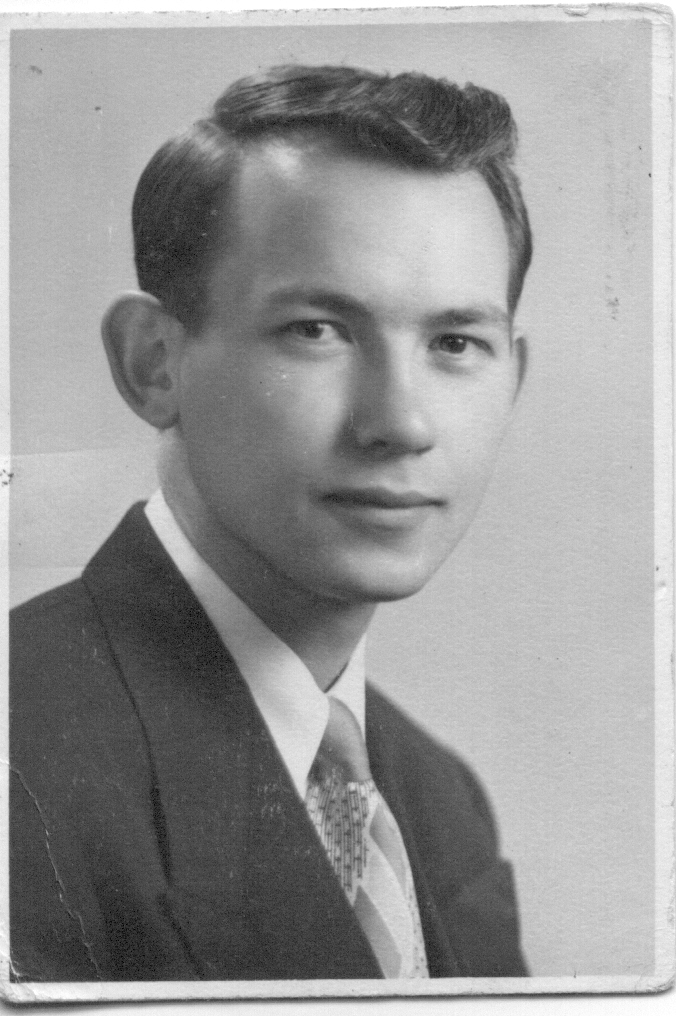
Robert Thoburn
HS Graduation
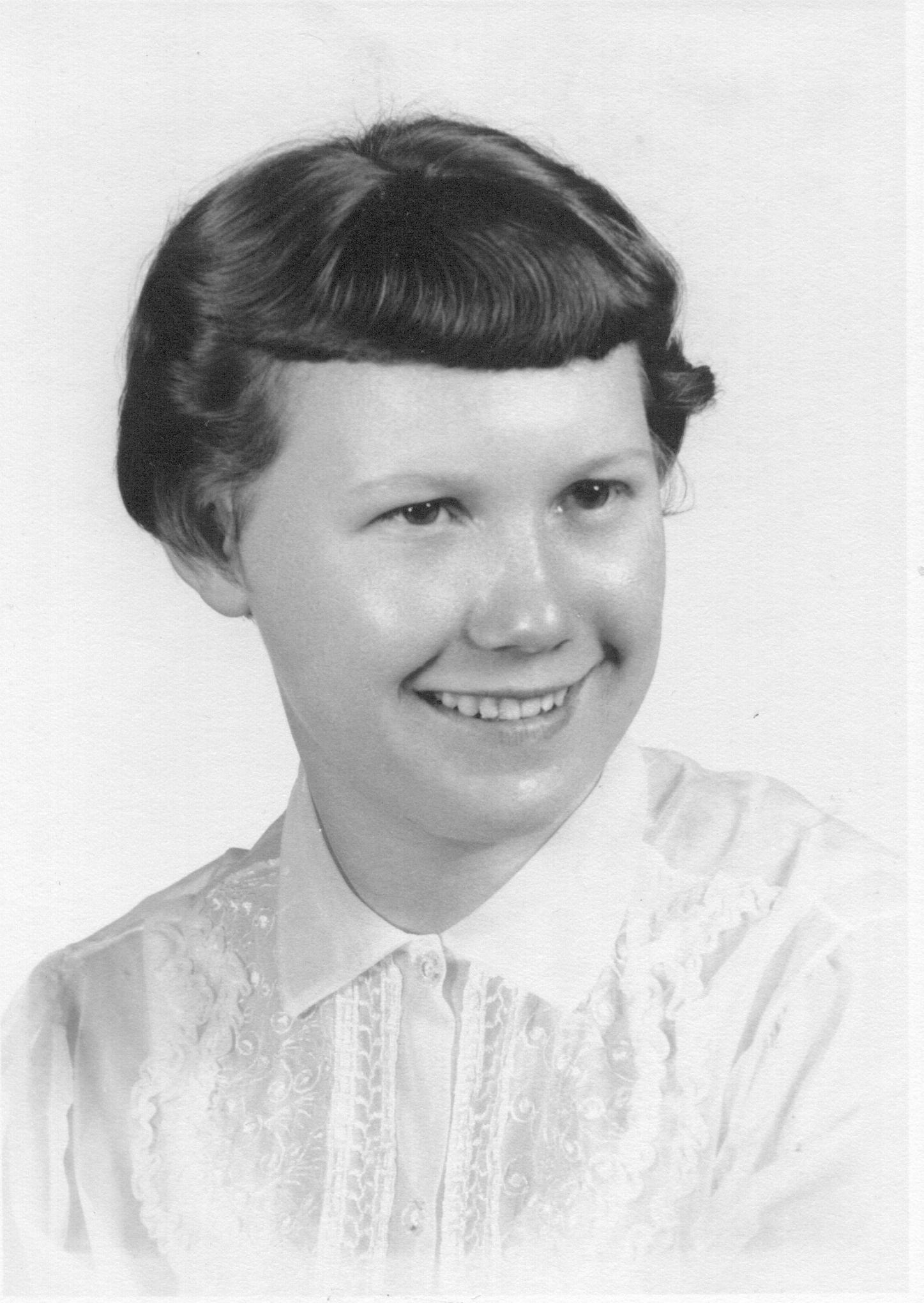
Nancy Lee Thoburn
HS Graduation 1956
Six years after I was born, my younger sister Nancy arrived. When she started school I had the responsibility of looking out for her. Later, when we were older, Dean and Jean were very good to her as well, seeing that she and my mother were well taken care of. Nancy was a good worker on the farm, too, and a great help with Dean and Jean's children, until she moved to Columbus after high school graduation in 1956.
Nancy got a job in a bank, and soon met her husband, Bob Crace. Bob was a genuinely Christian young man, and very kind. Nancy had grown up to become a wonderful Christian woman, and she and her husband Bob were great friends to me and my wife. My wife Nancy writes of her, "Nancy Lee was in high school when Bud and I were married. She was a little Scottish girl with truly red hair. I loved her from the beginning. She was my little sister, too. When she graduated from high school, she got a job in the "big city" where I was raised, Columbus, Ohio."
As I look back, I realize how fast those years pass by. It was good to be able to go back for family reunions. I even had the privilege of going back to my 50 th high school reunion and seeing many of my classmates again for the first time since graduation. There were thirty-nine in my graduating class, and all but seven were still around. Twenty-two showed up for our class reunion! Of course, the reunion I am most looking forward to is the one in Heaven, where I shall meet my Savior face to face, along with all the saints who have gone on before. I look forward to being reunited with friends and relatives, and especially my dear mother. When I think of how beautiful the farm was all those years ago, and then think of the beauty of Heaven, with all its splendor, it is a wonderful thought.
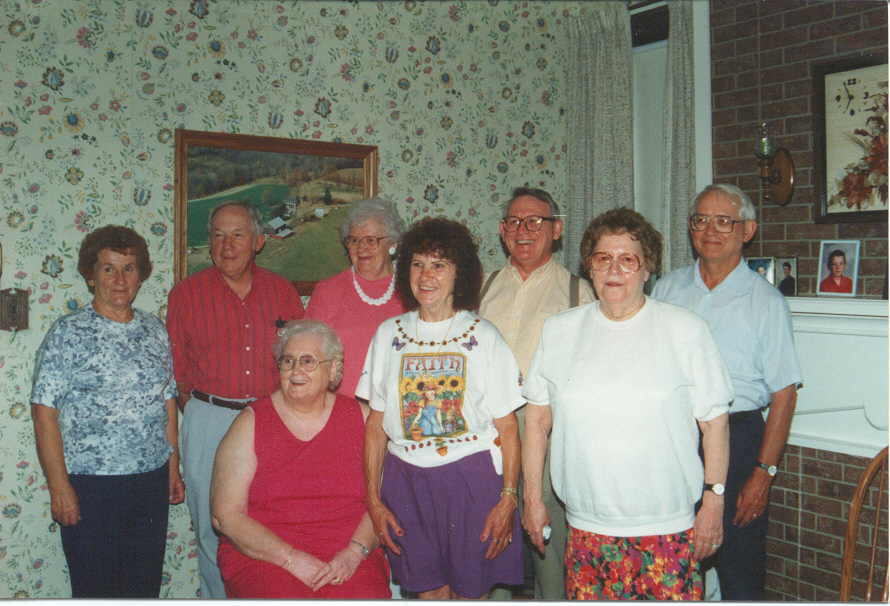
This hayseed boy was born with a lazy left eye, which was the common name for amblyopia, and one eye had strabismus, or was crossed. When I was entering the first grade, the local doctor asked my parents about having my eye straightened. My parents refused to have it done, because they felt that there wasn't enough modern medical equipment to warrant the chances that I might go blind in that eye.
Later on, when I was in college, I was asked by the student health services if I would be willing to allow several doctors from across the country to look at my eye. From situations like mine they hoped to learn what to do with this in the future. I agreed to go to the Ohio State University Hospital and spend several hours with these doctors. They all agreed that my parents did the right thing at the time, to not allow the surgery. They were very appreciative of my coming to be seen by them.
I never wore glasses until I was out of college and working. When I was a freshman in high school, I was given a free eye exam and a pair of glasses. I hardly wore them, and they got broken. Don't ask me how they were broken! I never got a replacement. I wonder why?
Life for me went along rather well in my early school years. When I finished the fourth grade at the age of ten, two of my older brothers decided to have a little fun when we were out at the spring. With that very cold, natural running water, they pushed me in. I wore those wet clothes for the rest of the day. From this, I got pneumonia, and spent close to a month in bed. I was so weak that they brought a bed downstairs to the living room. The doctor told my parents that I probably wouldn't make it through the night. Back in those days, the doctor made house calls. Now they take you to the hospital. But I had two of the best nurses you could ever have, and the Lord was watching over me. My mother and my sister Doris Mae took turns staying up beside my bed. They put cool compresses on my forehead to bring the fever down. As I was looking out the window, I saw my father drive into the lane in a shiny new red pickup truck. It was my 10th birthday. As I recovered, I knew that God wasn't finished with me, and I came to learn later that He had a wonderful plan for my life. God is good all the time, and all the time, God is good!
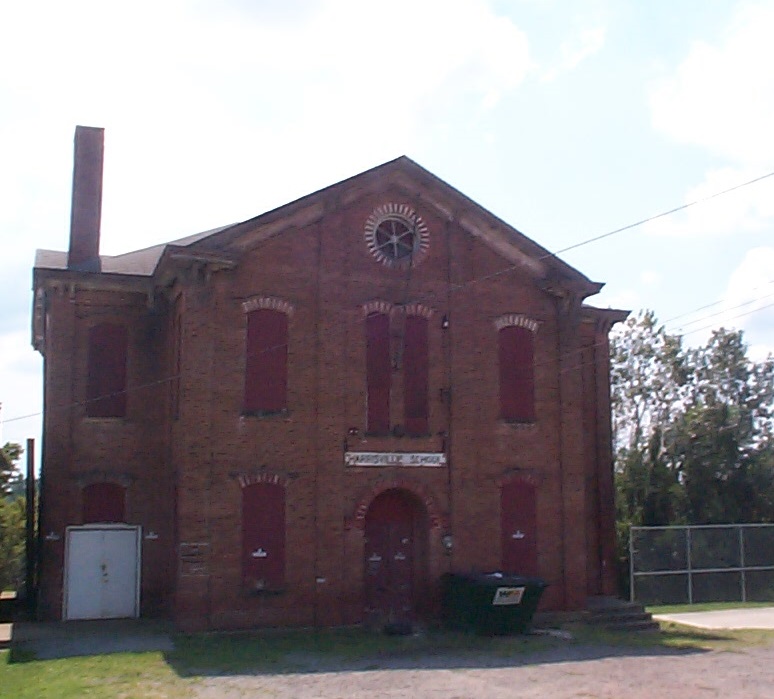
Harrisville School
My siblings and I all attended a four-room school during our first eight years of education. Each room housed two grades. They had a furnace which the custodian came to fire up early in the morning. Then the teachers had to keep them going the rest of the day. I remember passing out in class one day in the first grade when we got our diphtheria shot. Miss Mercer was my teacher. I still remember her!
I also remember my fifth grade teacher, Mr. Price. Behind his back, we called him Dumpy Price, but were always respectful in front of him. My seat was right in front of his desk. I guess this was because I was such a nice boy…you probably know differently! One day, he fell asleep in class and the recess bell rang. Halfway through recess he woke up. He scolded me for not waking him up when the bell rang. Looking back, I should have told him that it wasn't me who put him to sleep!
In elementary school we had two recess periods of fifteen minutes each, and an hour for lunch. Not having a gym to play in, we had to play outside. In the spring and fall we often played softball, and kick-through, or kick-ball. Other times we played marbles. One game we used marbles for was called "bellyhole". In this game, you had to shoot your marbles through a series of holes we made in the dirt. One part of the game was hitting your opponent's marble, making it go further from the next hole. The goal was to shoot your marbles in all the holes, so you'd become 'poison'. Then, when you hit another player's marble, you captured it. You played until someone was the winner.
On the farm, we often played Cops and Robbers. We sometimes used corn cobs as pretend weapons. You would throw a corncob and try to hit the other person. Nowadays, kids are not allowed to play games like this in school. Of course, kids today have video games to play. Who knows what they view or hear on these that are more detrimental than the games we played?
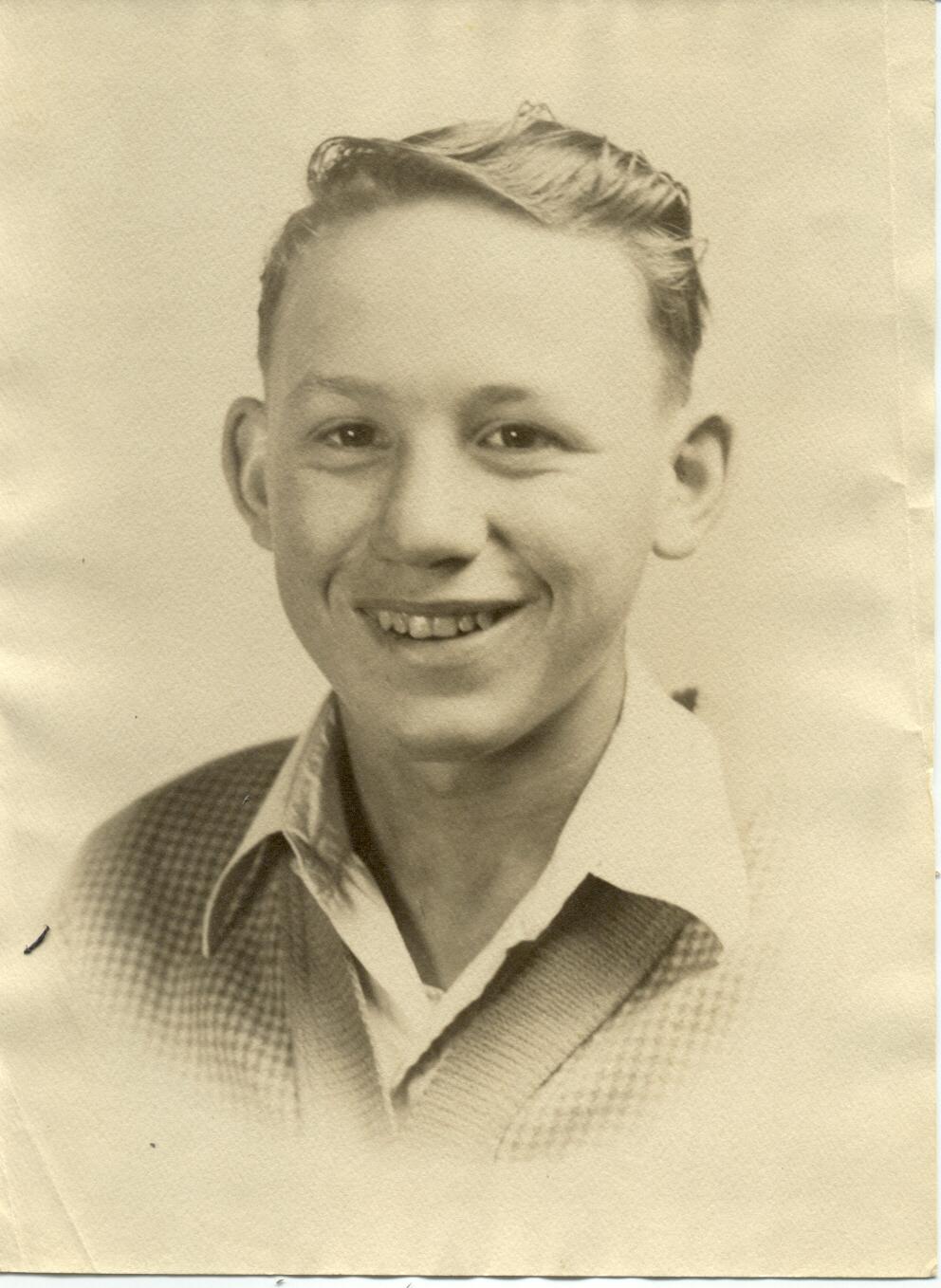
Tater in the 8th Grade
Mr. Grant Thaxton was the principal, and also taught the 7th and 8th grades. For the most part, I enjoyed my time in elementary school. Since I hardly had any sight in my left eye, I was often chosen last when picking sides for games at recess or lunch. However, I don't remember being called "cross-eyed" very many times in my youth. I really never felt sorry for myself because of my eye. I realized later in life that the hearing loss I experienced was probably due to the pneumonia. From the time I had it, I had a problem with what we called a "running ear". Mr. Thaxton made us school kids work very hard. He was a very strict teacher, to say the least. We had to keep a notebook in every major subject. I wasn't the smartest in my class of thirteen, having to compete with Mr. Thaxton's daughter and another boy, a neighbor, who was the smartest kid in class and later became a doctor. I got my one and only spanking in school in the 7 th grade, when I was accused of holding the smart boy's hand down so he couldn't raise it to ask a question. To this day, I know I was innocent. I can still feel that spanking at times. If I had been quick enough to say, "Why couldn't he just hold up his other hand?" I might not have been spanked. When I got home, I told my mother about it. Her answer to me was that I had probably deserved it for something else that I had done some other time, and hadn't been caught.
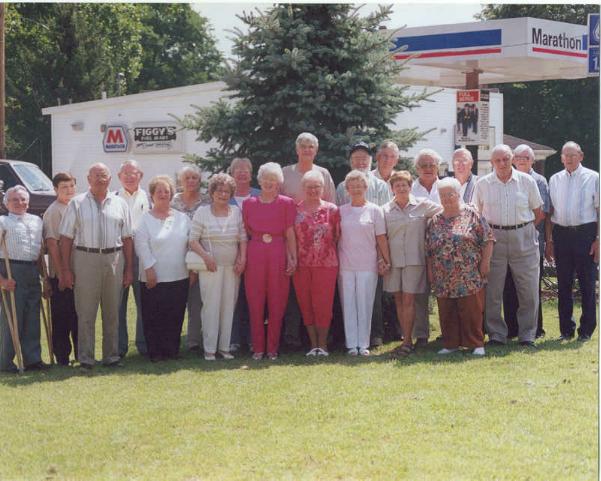
50th High School Reunion
When I attended my 50th high school reunion, I told Mr. Thaxton's daughter that I thought at the time that her dad was the meanest teacher I had ever had. Later, though, when I was teaching, my students would ask me if I had a favorite teacher when I was in school, and I was quick to tell them it was my 7th and 8th grade teacher, Mr. Thaxton. My remarks brought tears to his daughter's eyes, and she said that her dad's heritage lives on. I pray that I have given my best to help my students, and for them to speak well of me, and most of all, remember that it wasn't me, but God working through me.
In those years we had speed tests in Mathematics. Mr. Thaxton would send us to the blackboard and give us twelve to fourteen problems to work on, and when the first one was done, the rest had to stop. Most of the time, I not only finished first, but I had all the problems correct! If a slower person got 10 correct, they could still receive a 100 for the speed test. Math was one subject that I could excel in. I didn't know at the time that the Lord would call me to teach Math.
We also had spelling bees, in which I did well, too, often first, second or third. I enjoyed the speed tests and spelling bees because it gave me a feeling of self-satisfaction. I believe they helped me during the difficult time when my parents divorced.
I was in the 7th grade when my parents divorced. My dad had become extremely mean to my mother. She had no recourse but to have him leave. I felt a lot of relief when my dad left, because we didn't know what he might do to us children or our mother. In my father's defense, I must admit he was a good farmer and a good mechanic, even helping neighbors fix their machinery. Also, he never made us work on Sunday, unless threatening weather dictated that we bring crops in so they wouldn't be destroyed. The hay was the chief concern, especially if it was already raked into winnows or shocks. Before he left, he had a sale, leaving us with some of the dairy cows, horses, chickens and other farm implements. There were six of us still at home for my mother to assume responsibility for by herself.
One summer evening, when my mother and siblings were not at home, I went over to my neighbors' to visit my friends. As dusk approached, I saw a car go into our lane. Of course, I wondered who it might be, since I didn't expect the rest of the family to be home yet. When the car started back out of the lane, I went down the road and waited at the end to see who it was. It turned out to be my father. As we were talking, I heard the sound of chickens in the trunk. I still get a kick out of the memory of those chickens in the trunk, going "cluck-cluck". I immediately challenged my dad for stealing, but he drove away with the chickens anyway. The next day my mother went to court to have him barred from the farm forever.
After my father left, not giving my mother any support money, but leaving her with the farm instead, it became a fear that she might lose the farm because of the mortgage owed on it. In today's market it would seem like a small amount, but then it was a real burden for my mother. She never complained about it, but as I look back, I think she always trusted that God would provide.
As a boy twelve years old, there were times when I thought that we might have to move. I loved the 112-acre farm and all the benefits it provided for us, despite the hard work. One day, when I stopped at the local pool hall, an elderly man started talking to me, and said he understood that my mother might lose the farm. With a downcast look, and my heart sinking, I said that she probably would. He told me to tell my mother that he wanted to speak to her. Knowing that he had a lot of money, I hurried home as fast as my feet would take me, my heart beating with excitement. I relayed the message to my mother. Since we had no phone, she went to see him. He loaned her the money, and his only request was that she make the interest payments, which she managed to do. I don't know how she did it, but I know that God was in it.
I didn't realize it at the time, but God was using this Depression boy in helping my mother keep the farm. I am so grateful today, for His help, for my mother and my siblings. When we grew up we all tried to make her life more pleasant.
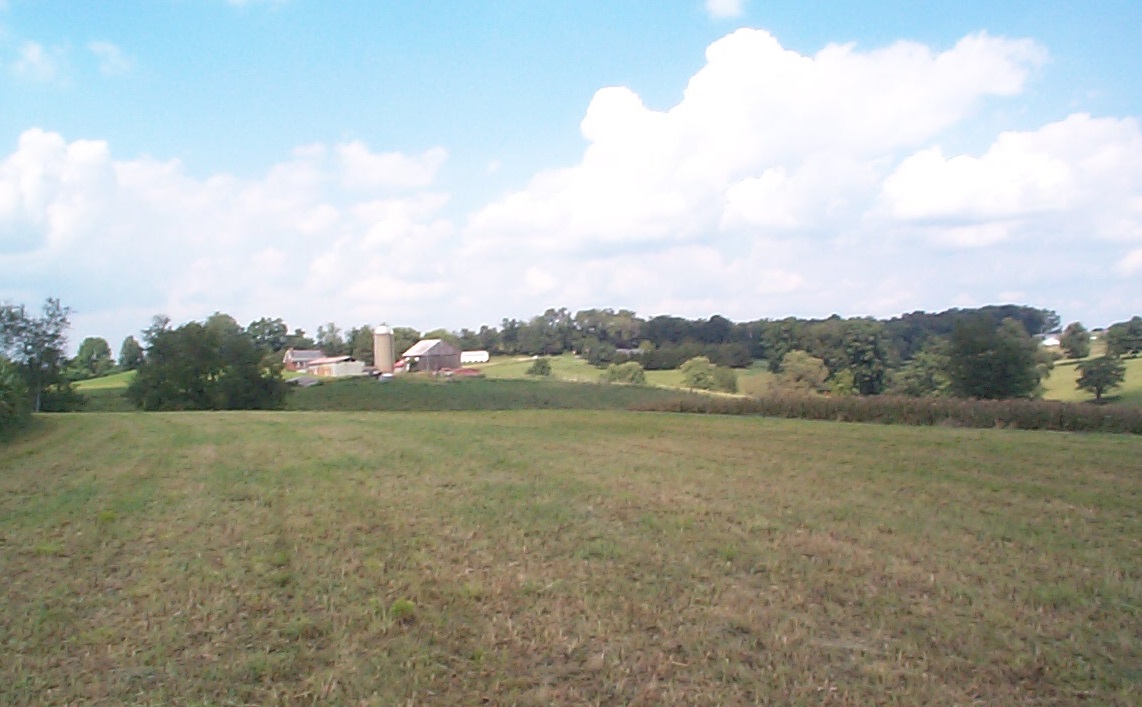
Our Beautiful Farm
On the lighter side, Mom was a good euchre player. I was always happy for her to be my game partner. We boys didn't dare fight over the cards, because we knew by experience that she would just pick them up and throw them in the fireplace. We couldn't afford to keep an extra deck around, and would have to wait until we could get to town to buy another deck.
When harvest time came, I enjoyed the threshing of wheat and oats. This involved hiring help. I had to carry water out to the field and barn for the men. We had a water well and pump just outside the kitchen next to the porch, on a concrete slab. We didn't mind taking a drink from the dipper after others had used it! In later years, my children were fascinated by that old pump, which was still functioning when they were growing up.
When it came to dinner, my mother would feed us younger children first, then the hired help. Back in those days, meals were called breakfast, dinner, and supper. The dinner meal was as big as the supper meal. It was good to see the men eating a big, home-cooked meal with pie for dessert.
During World War II the government formed the Civil Conservation Corps, called the CCC, to help farmers improve their land. They set up a kitchen in the garage to feed the CCC men. They came to our farm and built a new fence between our pasture and crops. They also planted pine trees where crops were hard to grow. In addition, we started contour farming, which is more commonly called strip farming. This is where you would have strips of hay fields planted between the corn, wheat and oats, to help prevent erosion.
There were times when I was in the far pasture rounding up the cows for milking in the barn, when I would hear one of Carl Mercer's boys going up the railroad track yodeling. I tried to yodel several times, but was nowhere near as good as he was.
I enjoyed riding horses on the farm and would sometimes ride one to round up the cattle. One horse, called Pat, was very fast, and I rode that one the most. Sometimes I rode Pat around the neighborhood. We had three other horses at the time. The oldest was named Flora. Her daughter was Nellie, and Nellie's son was called Bob. Here were three generations of horses. Bob got his name because he was born on my brother's birthday. Flora died at an old age when I was in high school. The others were still living when I left home at 18.
Probably the best birthday I can remember was my 13 th . My mother and siblings had a surprise birthday party for me. To get me out of the house, my brother told me that we were invited to go to the movies with the neighbors. When we'd almost gotten there, he said he'd forgotten something and we had to go back home to get it. When we got home, I went into the living room, and there were many of my friends! It was an enjoyable evening, and we had a lot of fun.
I don't remember much from the party except that we played a game called "Post Office". In this game, one person had to go into the other room and then call another person to come in. While in there, you might get a hug or even a kiss on the cheek. A neighbor girl named Laura called me in, and I got a kiss. I guess she had a lot of experience since she was five years older than I. Being the birthday boy, I got picked a lot. Laura's kiss is all that I remember from that party, though. Later, I would define a kiss as "A mouthful of nothing that tastes like heaven".
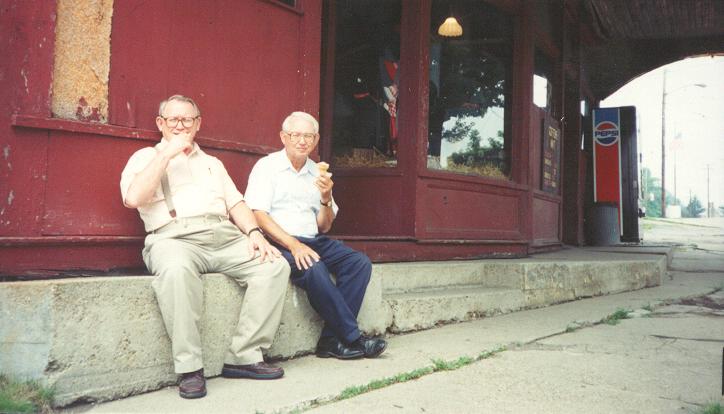
Tater & Bob at Giffens
When my sister Jean was in high school she worked at J.B. Giffen's Ice Cream store in Harrisville, the tiny town up the road from our farm. His ice cream became very famous, and I must say it is the very best I have ever eaten! Of course, I am prejudiced! But Everett E. Keener states, "In 1942 the Giffen confectionery sold 48,000 gallons of ice cream, averaging out to about 10,000 cones sold each Sunday…however July of 1927 was the over-all banner month with a sale of 8,000 gallons of ice cream. It was this same year that The Confectionary Journal gave the Giffen store the distinct honor of doing the largest retail ice cream business in the United States, which then meant it to be a world record". 1 I was told that even Henry Ford would stop there on his journey through on Rt. 250. Rt. 250 extended from Richmond, Virginia, to Cleveland, Ohio, as mostly a two-lane highway. On the weekend folks would come to Giffen's from near and far, just to enjoy an ice cream cone, sundae or milkshake.
Since Jean had to work until ten or eleven some evenings, it was my responsibility to be there when the store closed so she didn't have to walk the 1.3 miles down the country roads alone. I was proud to be her bodyguard, although I believe she could handle herself very well.
At times J.B. Giffen would give me a free cone or maybe even a milkshake. Even though I could get a cone for a nickel, it was hard at times to come up with the money. An experience I will never forget was once, as a young lad of around 13, I was in his store and I overheard a couple of men telling dirty jokes. Another man there, Jackie Lamb, was a Christian. He said he had a story to tell and he got a page out of the newspaper, and told a story about a Christian lady and her husband who wasn't a Christian. I didn't get any of the bad jokes, but to this day I remember the story he told. I listened and watched from a distance everything he said and did. As he told his story he cut the newspaper up. As he told it, he unfolded the pieces of newspaper, and at the end, the last one was in the shape of a cross. When he had finished all the other men had gotten quiet. That put an end to their dirty jokes.
I have told this story to many of my students over the years. I found that at Easter time was the best time to tell it; on the day we were going to start our Easter Break. Of course, they don't call it that anymore, they call it Spring Break.
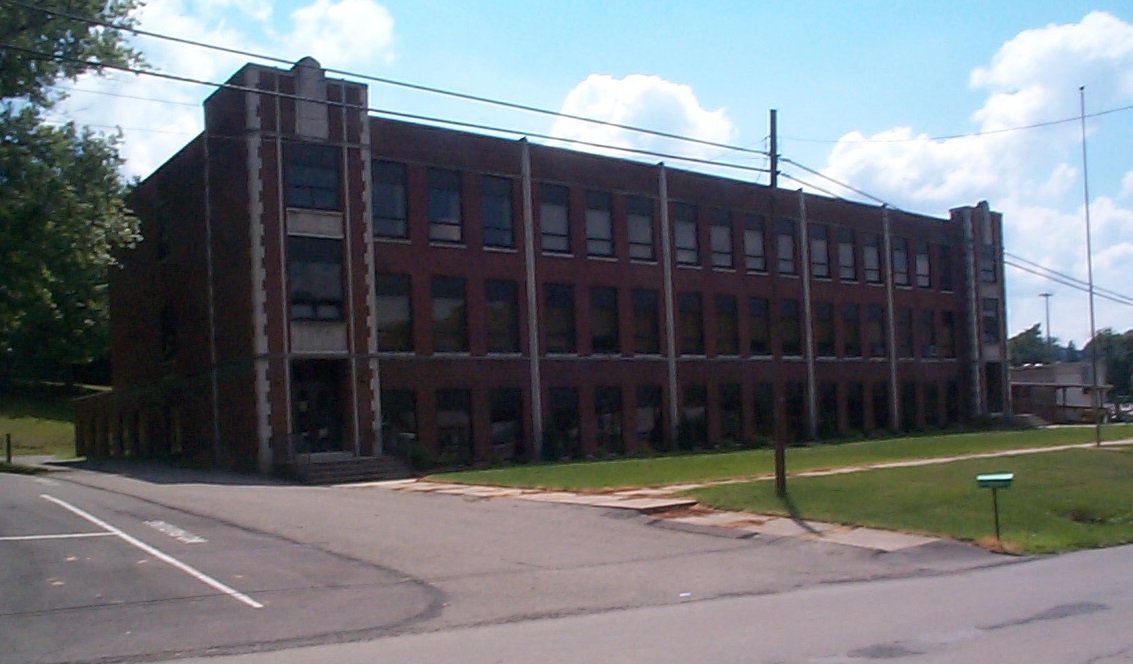
Adena High School
I entered the 9th grade in 1946 at Adena High School. World War II had ended the year before. Living through the Depression and the war taught me what it meant to be patriotic. Having two brothers and other relatives serving their country in war and being too young to go, I learned early in life a deep appreciation for our service men and women. For many years I have made it a practice when I see a person in military service or a veteran, to shake their hand and thank them for their service to our country.
Having several siblings who had already graduated from high school, and my sister Jean entering the 11th grade, and brother Bob entering his senior year, all I could hear was, "Here comes another bookworm". To my brother Bob's credit, he became valedictorian of his class. We were all proud of him and his accomplishments. When he was in the 8 th grade, he'd received the tenth highest score on the State Boxwell Test. Many thought he'd become a lawyer or doctor. When he chose the ministry, most folks thought he was wasting his talents. He proved them wrong. He went on to establish The Fairfax Christian School, in Fairfax, Virginia. He started it in 1961, with his wife Rosemary. Today it is located in Vienna, Virginia, and is run by one of his six sons, David, and his wife, Jo.
I always liked high school. Maybe one of the reasons was that schoolwork was easier than farm work. I remember when I was fifteen, and I had to pitch hay in the summer. My back would hurt most of the time. I think some of my siblings believed that I was trying to get out of work, but that wasn't the case. I am thankful to this day that I had a mother who impressed upon me the willingness to get up early and do my morning chores. I still like getting up early. I feel that morning is the best part of the day, and that I am more alert and energetic then. My mom did not have to come and make me get up, for I knew at the time it was my responsibility.
As I entered the 10th grade, Bob was off to college and Harold was in the Navy. Betty had gotten married so that left me and Jean to do the chores with Mother. Getting up early in the morning to milk the cows and do other farm chores, it was good to work together with Mom and Jean. Jean was a real trooper when it came to doing farm work. She could do most things a man could do, and I have often said that she worked harder than a lot of men.
I also liked school because I got to be around my classmates more. Living five miles from my high school and having to do farm work prevented me from getting involved in many school activities. Nowadays, kids have cars and better transportation to be able to take part in school functions. Not being an athletic person, and liking sports, I did the next best thing, and became the sports editor of our school newspaper. My most memorable time was when we had to play a team that I didn't recall ever having to play before. It was an away game, and I was told that their field was more like a cow pasture, and it should be an easy win. In a pep rally at school, I made the prediction that we would win 20 to 0. The Superintendent decided he would challenge me in his inspirational speech, that we would win 27 to 0. At least I was closer than he was, since the game ended up 20-0, their favor! In my senior yearbook, I was predicted to become a sportswriter, but a few years later, I knew that this was not in God's plan for my life.
I also joined the Drama Club, and in my senior year, had the lead part in three plays. These were small productions of short works, which we presented to the other students at assemblies during the year. I can't even remember the names of the plays. I really enjoyed acting, but had no desire to become an actor in life. According to some of my grandchildren, I am an actor. I will leave that up to them. But I still like to make friends and family laugh, and I am never shy around strangers!
Many of the happy times during my childhood and youth were when kids came out from the town, Harrisville, and other neighbor kids came, to join in to play on Sunday afternoon. In the fall we played football, and in the winter it was basketball.
Spring and summer found us playing softball. In this sport, we often had the girls playing too. Sometimes we played at our neighbors', the Sokols. They had several children in their family, too.
We never had the money to buy a good basketball or football. Thankfully, the neighbor had them, and so did some of the boys in town. We did have a softball, since those were cheaper. When the cover started to come off, we just covered the ball with electrical tape. It wasn't the best, but we could still have fun with it.
Back in those days, my siblings and I discovered some creative ways to enjoy games when we didn't have any equipment to play with. Up above the opening of the garage, I made a basketball hoop using a tea kettle that my mother had thrown out because it had gotten a hole in it and rusted out. I simply took the rest of the bottom off and nailed the tea kettle upside -down onto the garage. We used our softball for the basketball. When I played with my brother Bob, we would dribble from one hand to the other hand. When we stopped, we then had to shoot. It was great fun.
My mother always welcomed anyone to our home. On Sundays, after we went to church, she often had homemade butter and buns for us to eat. Sometimes, there would be homemade jam and apple butter to put on the buns. As I look back, I believe that my friends enjoyed her buttered buns just as much as playing games. My mouth is watering as I write this! I can still imagine their tastiness to this day. Often, my mother made pancakes for breakfast, and once she said I could have as many as I wanted. They were full-size pancakes, too. I believe I set a record, since I ate 29!
Once, at school, my best friend, Fred, challenged me to see which of us could eat the most slices of bread with butter on them. It wasn't homemade, it was Wonder Bread, but it certainly tasted good. The cooks told us that as long as we ate them, we could have as many as we wanted! Of course, they only gave us each one slice at a time. Each time Fred ate one, I would go back and get another slice, so I would keep one slice ahead of him. After 14 slices, he conceded. I think my 15 slices of bread is the only record I attained in high school!
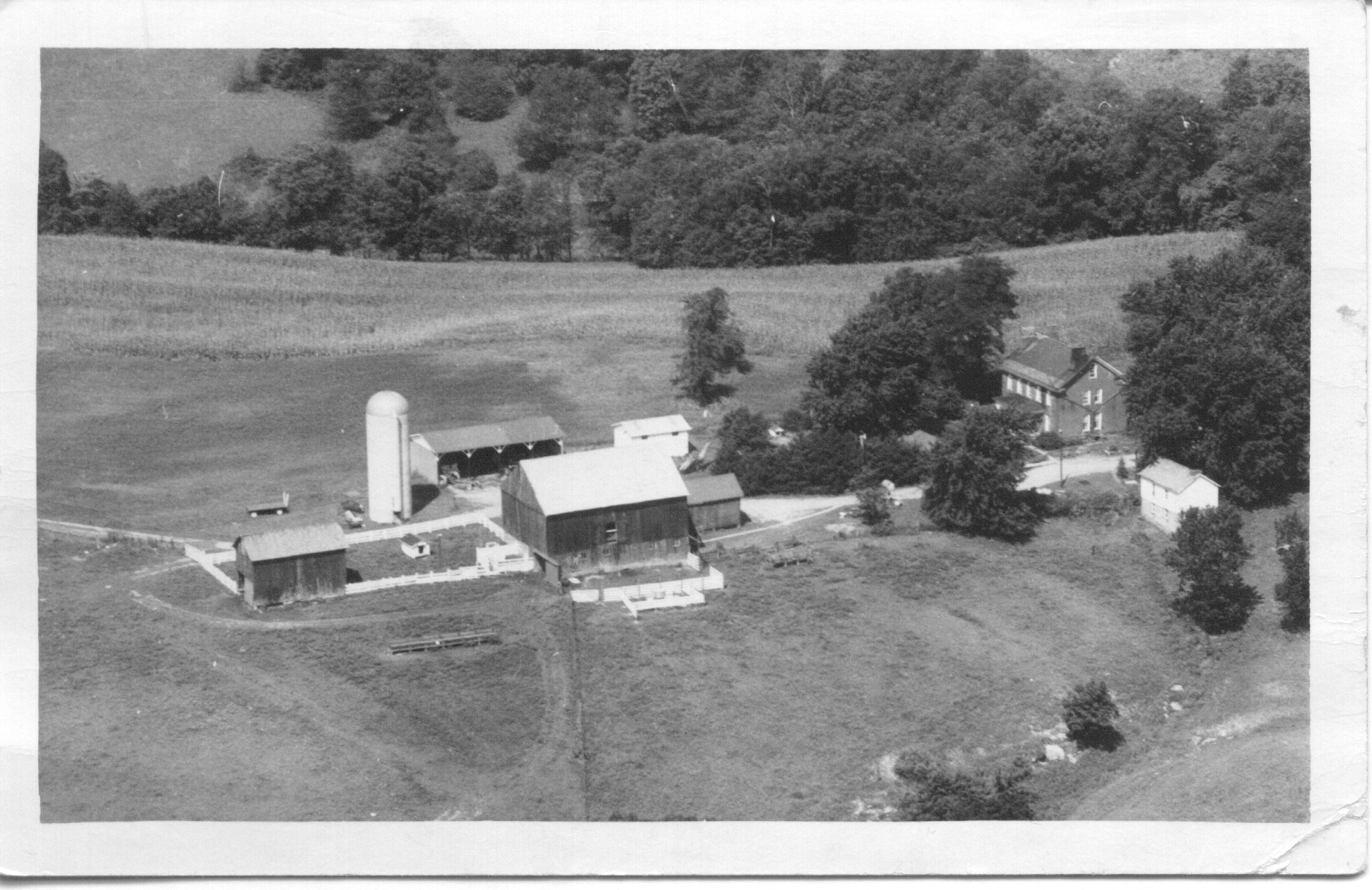
Our Farm
There were times when we had a wiener and corn roast on the weekend, too. This was usually at night, and we would build a big bonfire and play games. One popular game was called, "Wahoo", when we would choose up sides and one of the sides would go out and find hiding places on the farm, while the other stayed back by the fire. Then, like a combination of Hide n' Seek and Marco Polo, the second team set out to find the others by calling "Wahoo" loud and often. You could hear several long calls of "waaaahooooooo" echo through the darkness. When someone was found, they had to return to the fireside. Some liked to hide with their girl or boyfriends out there.
As a boy I had a dog who I named Teddy. Teddy was a medium-sized yellow Lab and unknown mixed breed. He had big brown eyes. He would often go along with me when I walked to Harrisville. The doctor in town took a liking to him and sometimes when I was about to go home, Teddy would be nowhere to be found. He was visiting the doctor! One time, Teddy got out on the two-lane highway and was hit by a car. A neighbor boy and I took him home in a washtub, and then we transported him to the doctor, who wanted to see if he could fix his leg. He ended up with a front leg that couldn't be straightened. From that time on, Teddy was often called "Crip" because he walked with a limp. That would seem very cruel now, but back then in Harrisville, nicknames had a way of sticking with folks.
For example, once someone had a party, and when one fellow went to use the bathroom, his friends filled his plate up with chicken bones, to make it appear that he'd eaten a lot of chicken. From that day he was called "Chicken". He had a son who grew up, and somebody started calling him Turkey. Among the local names used were "Pud", "Squint", "Goofy", "Hot Shot", "Peely", "Duck", "Ozzie", "Wally", "Tiny", "Fatty", "Cow", and many others. Of course, my siblings and I had nicknames, too! One of my sisters was called "Toby", short for Thoburn. Other siblings were called 'Corny' (Bob), 'Show', or 'Red' (Harold). I still hear of funny nicknames when I am back visiting in Ohio nowadays.
I remember a kid who was known as "Goofy". He was older than me, and one time, when he came out to the farm, we decided to go "snipe hunting". Since I had been reared on the farm, I was willing to go with him down to the bottom of a valley, and show him how to hold the grain sack to catch the snipe, while the rest of the gang would chase the snipes down the valley. After a few minutes, I told him that I was going up the hill to help chase the snipes down, and to wait there. I told him he needed to be real quiet if he wanted to catch them. Of course, when I went back up the hill, I joined the others who had already headed back to the house! Later, poor Goofy came back up to the house and discovered we had pulled a big prank on him. I am sure he wasn't very happy with what we did!
I had several nicknames just to myself: "Bricktop", "Carrot-Top", and the most common one, "Bud", which my family still uses today. In my teens, my sister started calling me "Tater". She did this because I would go out to the garden, dig up a potato, rub the dirt off on my jeans, and eat it raw. When my second grandchild, Rebekah, was a toddler, she and her sister and mother lived with me and Nancy for a while. She liked to crawl up on my lap and go to sleep. Since she didn't have a lot of hair yet, and she had eye trouble as a baby, too, friends used to remark that she looked a lot like me. Her Aunts and Uncles started calling her Tater Tot, and today, in her thirties, she has a license plate with her nickname! Thank goodness, she doesn't still look like me! She was recently married and was a lovely bride. Funnily enough, she grew up to be very good at Math and she is now a teacher, too.
When I was a junior in high school, we picked our school motto, school flower, and other items. I nominated the motto, "Tonight we launch, where shall we anchor?" which was selected. Little did I know then where God would lead this ornery boy who had no idea of what he wanted to do in life!
For the class flower, I nominated buttercups. Mrs. Maude, the homeroom advisor, told me to leave the room. I really thought buttercups were a nice choice, since I used to pick them down in the swamp, to give to my mother. My friend Fred asked her what was wrong with buttercups. She made him leave the room also! We went to the boys' restroom and stayed there out of sight of the principal. We just enjoyed the rest of the period talking. The advisor must have thought we were being funny, but I was actually serious at the time!
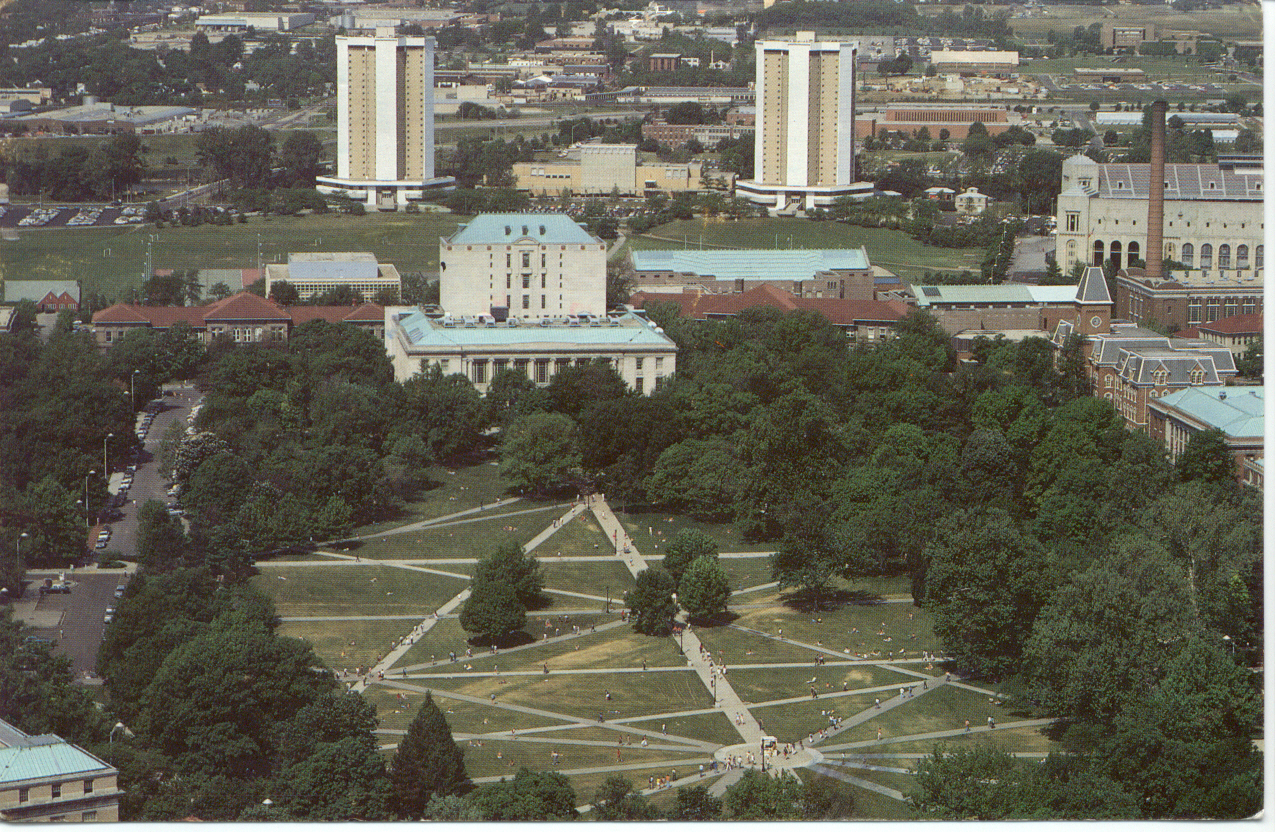
THE Ohio State University
During the summer of 1950, after I had received my high school diploma, my brother Harold approached me about going to the Ohio State University. He had gotten out of the Navy and started working in the coal mines. He married his childhood sweetheart, JoAnn. He didn't like working in the mines, and decided to take advantage of the G.I. Bill and had enrolled at OSU, majoring in Agricultural Education. Having been out of high school for four years, he waited until his sophomore year to take his two college math courses, in hopes that I would attend OSU, too, and then I'd be there to help him. Looking back, I realize now that this was just a part of God's plan for me.
My brother, Bob, had just finished his junior year at Muskingum College, a Presbyterian college in New Concord, Ohio.
Harold had just finished his freshman year, and he brought an application to Ohio State and practically forced me to fill it out and send it to the university. I had no money for my tuition. Nobody had taught me to save any. What little money I had was from working for farmers and mowing lawns. I spent it about as fast as I made it! Dean, my brother-in-law, said he would pay me for helping him on the farm, but I would have to wait until the corn crop was harvested in the fall. Again, as I look back, I believe that God was in this, as he knew I probably would have spent that money too. Maybe Dean knew that as well. I wasn't really looking for him to pay me, since I was living at home and they were supporting me as well as my sister Nancy.
Harold said he would loan me the money for my tuition the first quarter until I got the money from the sale of the corn. I left home in September with ten dollars and fifty cents in my pocket, and a big borrowed suitcase with all of my clothes in it. Dean drove me ten miles to the main highway in St. Clairsville. From there, I hitch-hiked to Columbus, 130 miles away. I felt lost in the city, a country boy who had never left home before. I felt homesick already!
My brother had given me instructions on what buses to catch once I got to the city. I exchanged buses down in the heart of Columbus, across from the F & R Lazarus department store. Little did I know that I would spend my college years there, working at a part-time job! After exiting the second bus in Northeast Columbus, I met my brother there, waiting for me at the bus stop. I had been able to call him from downtown to tell him I was about to board the second bus. It sure was good to see him! We drove to the trailer court where he and JoAnn lived, and where we lived for the next year. My bed was the sofa, in that small trailer. I had to admire and appreciate Harold's wife, for putting up with me. She certainly was good and kind to me!
Since Ohio State was on the quarter system, school didn't start until late in September. The only thing I didn't like about that system was that the third quarter didn't end until in June. Harold took me to the campus the next day and had me finish enrolling and signing up for my classes. My very first class was College Algebra, which was in University Hall, the oldest building on the campus. It has since been torn down and replaced in the same location, by a building with a similar look.
Sitting next to me in that Algebra class was my brother, Harold. We often did our homework together, and were soon joined by a friend of his whom I also helped. When the course ended in December my brother went to see the professor to find out his grade. He couldn't wait until the grades came in the mail! After she gave him his grade, she told him that his brother did quite well, receiving a 100 on every test, including the final. To God be the glory! When you are unselfish and help others, it comes back to you in great measures.

F & R Lazarus
The day after enrolling at OSU, my brother took me downtown to apply for a job at F & R Lazarus, the largest department store in the state of Ohio. It was located just one block from the State Capital building. The store covered about a block and had eight floors, plus an annex and a parking garage. I got a job in the receiving department working 25 hours a week, which soon became 27 ½ when I started working in the mail room on Saturday. The boss in the receiving department was also in charge of the mailroom, which had a supervisor in it. Mr. Klarman, the head boss, was a fellow about seven feet tall, and he seemed to really like me.
The day after I was hired by Lazarus, I told my brother I would like to go home until school started. Being a wise brother, he didn't approve of it, and of course, I didn't have any money. I didn't get to go home until we went home for Thanksgiving. I believe that was the longest eight weeks of my life!
Carrying a full class load and working kept me very busy. That was alright, an idle mind is the devil's workshop. I had very little to no time for a social life. I had enrolled in agriculture education like Harold, but later, I switched to engineering because I decided I didn't want to be an agriculture teacher. Besides, I had a greater love for mathematics. I later learned that my brother wasn't all that fond of teaching. He taught for four and a half years after college, then he was offered a County Agent position in Lorain County. It wasn't long until he was hired as the county agriculture agent in Medina County. He was County Agent there for over thirty years, and was really well liked.
We lived in the trailer park for only two weeks, and then we moved to the fairgrounds, where Harold and JoAnn had lived until they had to move while the State Fair was going on. I agreed that I would pay for my food while I was living with them. I wanted to do my part as much as I could. JoAnn was a good cook. I must admit, it would be hard to beat my mother's cooking, but my mother had the advantage of more experience and living on a farm. I was happy to pay a little room and board. It helped me to become more responsible. I was thankful, too, for the guidance my brother was giving me.
Leaving home with little money and working my way through college really taught me the work ethic. I learned that I didn't need to rely upon the government or someone else to supply my needs. This doesn't mean that there aren't situations when someone should receive help. But it didn't take long for me to learn that our free enterprise system is the best system in the world. It isn't perfect, but neither is any other.
During my freshman year in college, I had to take my Chemistry courses at night in order to work at Lazarus. I would attend a two-hour lecture on Wednesday night, and then on Thursday I would have an hour of recitation followed by three hours of lab, which ended at 11 p.m. Often, during recitation, we would have a quiz before discussing the lecture from the previous night. This left me with little time to study on those days. It was my Chemistry professor who really taught me how to study and take down notes. He made a simple statement at the beginning of the first lecture: "If I come in here and say 'Good evening', you should write it down". After the first quiz, I'd gotten his message!
I will never forget that Chemistry professor, though I can't remember his name. Around 120 students met for his lectures in a big auditorium. The first night, he said he graded on the curve system, with 10% getting A's, 20% getting B's, 40% getting C's, 20% getting D's and 10% getting E's, which was failing. I believe there were others besides me who were looking around to see if there were 10% who looked dumber than we did.
Once the professor started his lecture, he would move from left to right over the very long blackboard. I had a hard time keeping up with him and listening at the same time. When he filled up the blackboard, I thought I'd have a chance to catch up, but to my surprise, he pushed a button and that blackboard disappeared and another one appeared for him to write on. At the end of the hour he gave us a ten minute break. "Now," I said to myself, "I can catch up, instead of taking a break". But another surprise occurred when a custodian came in and washed all the boards for the next hour! I soon learned how to take notes in shorthand.
During my freshman year I was asked to come to the health center on campus. They wanted to discuss my physical exam, which I had to take when I entered college. I was told that my blood showed a low white cell count, and I should be very careful if I got a cold. They told me I probably should get penicillin shot to ward off any serious illness. I don't know whether it had anything to do with the fact that I had pneumonia when I was ten years old. To be honest, I didn't let it bother me. I felt later that God had healed me of the low white cell count, as I didn't have any trouble with it again.
At the end of my freshman year, my brother sold his trailer and rented an upstairs apartment. It had a kitchen, living room, bathroom, and two bedrooms. My room was in the back next to the kitchen and had a stairway that went down to the backyard. After not having running water or a bathroom, it was a blessing to have them when I went to college. At that time, I didn't know that my future wife lived just a block away on the same street! We wondered often, later, if we were ever both at the bus stop at the same time.
One of the courses I had to take in my first two years at college was R.O.T.C. (Reserved Officers Training Corps).I didn't get an exemption from these courses, even though I had bad eyesight in my left eye, and hearing loss in my right ear. I learned a lot in ROTC, even though I must admit that I didn't like it when I was taking it. I especially didn't like the marching drills we had. The entire department put on a program on the oval each spring, and to my surprise, when I was a sophomore, our platoon won the top award for the best drill team. Everybody else must have been in line, except for me!
Later in life, I realized that ROTC taught me a lot of discipline, respect for authority, and an even greater appreciation for our service men and women and their families. Not fond of seeing blood, I wondered how I would get through watching the war movie, where they would show actual results of men being killed or wounded in action. Some students had to leave, and some even passed out. I just lowered my head at times. To this day, I don't like the sight of blood, especially my own, haha! However, I am trying to be braver about it. My one regret about my ROTC days is that I don't have any picture of myself in my uniform, even though I know some were taken.
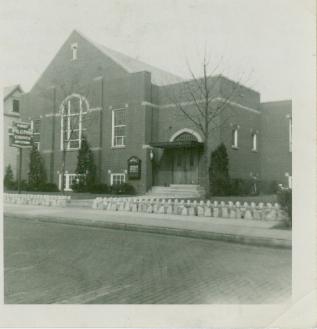
First Pilgrim Holiness Church
Occasionally, I would go to church with my brother and his wife. Most Sundays, I would sleep in and then spend the rest of the day studying. During the fall of 1952, while working at Lazarus, I met a young man named John who was in high school at the time. His father was a minister in the Pilgrim Holiness church. We often worked together in the receiving room and mailroom. In the spring of 1953, he invited me to church. The church was on the west side of the city, while I was living on the north side. I told him that was a long way for me to come, and I didn't drive. In fact, I didn't even have a driver's license! I also had never had a driving lesson. He offered to pick me up and told me to be ready when he came. I told him there wasn't any guarantee that I would even be awake at that time. Later, I knew why I was up and ready when he came. It was God, working his plan for my life.
The Pilgrim Holiness church was really different from what I was used to attending. The congregation was much more active, in that they didn't hesitate to say "amen" or "praise the Lord" during the sermon or at the end of a song. The people were friendly and I could tell that they really enjoyed the way they worshipped. It was a congregation of approximately 300. The songs spoke to my heart in that service, and I enjoyed the preaching of the gospel. My friend John came and picked me up again the next Sunday, and on the Sunday after that, and he invited me to come have breakfast at the parsonage with him and his parents. The parsonage was just a block away from the church. All I can remember about that meal was that it was more than I could eat and I really enjoyed it.
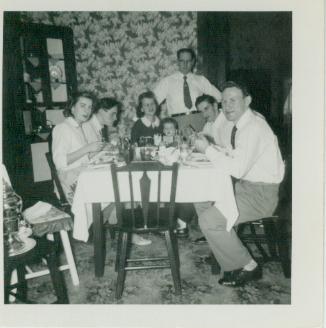
Dinner with Rev. Davis & Family 1954
This became a regular routine, even though I thought that I was becoming a person who was receiving more than I was giving back. This didn't seem to bother them. They believed that their son had a good friend whom they could trust, I guess. Again, God was good to me. It eventually became a routine for me to go home with the pastor and his wife and John for dinner, where I enjoyed many a delicious meal. Since this was now after my brother had graduated, in June 1954, and I had moved into a room near the campus, it was a real blessing to be given a home-cooked meal instead of cafeteria food. Also, I received the blessing of fellowship with wonderful people.
I soon realized that I was a sinner, and that God was good to me despite my sins. After church one Sunday, I felt very strongly that I was taking advantage of the minister and his wife. John had left for college and they had no children at home. As I shook hands after the service, I started walking up the street to catch a bus back to my room. Pastor Davis spoke loudly to me, and told me to get back there. He said, "You know where you are to go after church!" They told me that afternoon that I was always to go home with them, unless I got another invitation. They kidded me that maybe one of the young ladies in the church would invite me for dinner. I did receive several invitations, but I really was only interested in finishing my education.
When I had first started attending this church, I was dating a young lady of the Lutheran denomination. I was introduced to her towards the end of my freshman year by my sister-in-law, JoAnn, who worked with her sister in an insurance firm. We went on a blind date with my brother and his wife, to a square dance in a barn out in the country. God blessed me again, by my winning the door prize, a bushel of groceries. This I gave to Harold and JoAnn.
The young lady was a senior in high school, and a very nice, moral girl. The next fall she entered Capital University, a Lutheran college, to major in nursing. We dated mostly on Saturday evening, as both of us were busy with school and work. I liked her family, too, and they liked me.
That fall, and the next, her dad got me a job at the main post office during the Christmas season. He was the Superintendent of the Columbus U.S. Postal Service. My job was from 10 p.m. until 6 a.m. The post office was just a couple of blocks from Lazarus where I worked from 8 a.m. to 5 p.m. during the Christmas season, as well as during the spring and summer breaks.
When I finished working at the post office at six in the morning, I would walk over to Lazarus and sleep in the lounge area of the employees' cafeteria. I had someone to come down and wake me so that I would be ready to work by eight. The only other sleep I got during those two weeks of working sixteen –hour days was what I got in the evening before I went back to work at the post office. I can't even remember when I ate my breakfast and dinner! I did have a full lunch hour, in which I spent a little time taking a nap. One of the benefits of working at Lazarus was that, on Mondays, when the store stayed open until 9 p.m., the employees were given a free dinner.
One day, while working at Lazarus, Mr. Klarman, the supervisor, came to me and asked if I was working at the post office at night. I told him it was true. I got worried that I would have to give up one of the jobs, and I didn't want to, because I was making a lot of money at the post office. I explained to him that I was doing it to help pay for my tuition and board. His answer surprised me, as he told me that it was okay, just do the best you can. I think he had an appreciation for me and my desire to get an education. I know that God was watching out for me.
As much as I liked the young lady I was dating, however, I never felt the desire to ask her to marry me. It was hard, when the time came, for me to break up with her. She was a wonderful girl.
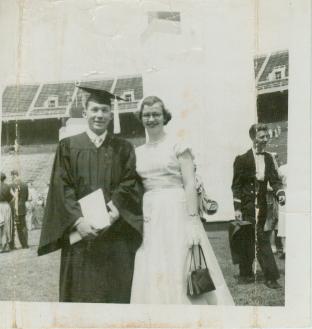
Harold and Wife Joanne
When June 1953 came my brother Harold graduated from OSU. I was both happy and sad. I was happy for my brother and his wife, but sad because now I would be completely on my own. I was thankful for their love and guidance during the last three years. I rented an upstairs room in an elderly Italian couple's house. They were very nice people.
My room was on the third floor, and it was almost like living in an attic, though a very nice and comfortable one. I felt very lonely, except I knew that the Lord was always there with me. School, church and work kept me busy, so that I didn't have much time to continue to feel lonely.
One of the things I remember about living there is that I was taking a Geology course. The professor loaned us twelve rocks to take home and study. One day when I came in, I couldn't find the rocks, which I had left on my desk. I asked the landlady if she had seen them when she cleaned the room. She said that she had thought they were there to be thrown away, and she had put them in the garbage. She was really good about cleaning my room, and unfortunately, the garbage had already been collected. I was relieved when the professor was very understanding. I had no idea what those rocks would have cost me to replace.
The next year, the landlady's husband got very sick, and she had to give up taking in renters. I found a place just one block from the campus, where there were several boys staying. I wasn't completely happy with the situation at first, because we were all in a big room upstairs. One of the boys was from near my hometown.
As a young Christian, I never felt part of the gang. I was trying to live for Christ, and to not be rude. One time they offered me a coke. I took it, but then gave it back to them. They all laughed and said that I was too smart for them! They didn't know it was the Lord who'd told me that they had mixed alcohol in it. I had never told them that drinking alcohol was a sin. I didn't preach to them. I was simply trying to be true to my convictions. After that, I felt better around them. They seemed to be friendlier and to treat me with more respect.
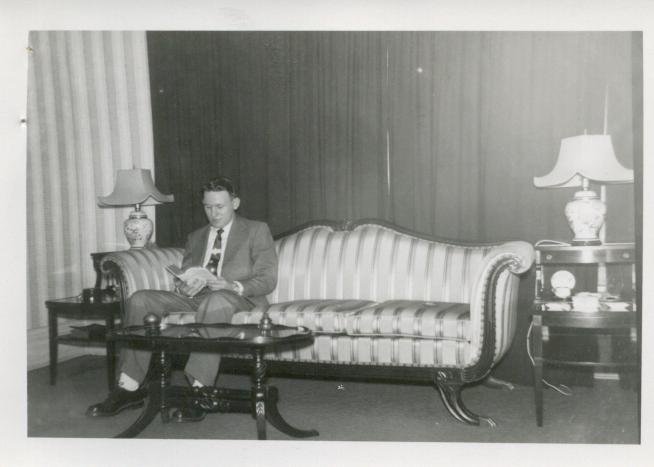
Tater Winter of 1954
During my stay in that house, which was a big place, the owner's wife and child left him. I had heard them getting into arguments at times. He became very despondent. He asked me to come down to the living room, as he wanted to talk to me. There, to my surprise, he poured out his heart to me. Here I was, just a new Christian, and God had given me this opportunity to counsel and help a man in this situation! After that, the man became very friendly to me, and often came to me for advice. He also asked me if I wanted to move down to the main floor and have my own room. This room was big and had a double bed in it. Also, it was close to the kitchen, which gave me more privileges with no increase in rent. I don't know if he ever accepted Christ as his Savior. All I can say is, God is good all the time, and all the time, God is good!
When I went back to college in the fall, I knew that I would have a difficult time going to school and working 28 hours every week, and also find time to attend two services on Sunday as well as mid-week prayer service. Pastor Davis must have realized this, because he told me that anytime I needed to, I could just bring my books and study at the parsonage.
In the fall of 1953, I felt God convicting me of my sins and one night, during the invitation to come forward, I went to the altar and confessed my sins. The battle started heating up at that point. The devil tried to tell me I wasn't a bad person, and God wouldn't send me to hell. But Romans 3:23 says that we "all have sinned and come short of the glory of God". In John, chapter 3,Jesus said, "Ye must be born again". Having such a wonderful pastor who stood by me and gave me wise counsel made it easier for me.
This reminds of when I was a senior in high school, and our family all drew names for Christmas. My brother, Bob, drew my name, and I was told by one of my siblings what Bob probably would get me. Sure enough, they were correct. He gave me a Bible that had large, easy-to-read print. At the time, I was disappointed, but I kept this to myself. I took it to college with me, but it remained on the shelf most of the time. When I surrendered my life to Christ, that Book became very precious to me. Thank you, Bob, for a wonderful present!
Reading the Bible became a daily part of my life. I started memorizing scriptures, and my biggest regret as I got older was that I didn't keep on learning scripture, reading good books, and daily bible-reading. It's a lot easier to learn scripture when you are young! It's also one of the best defenses against the enemy of our souls.
Pastor Davis and his wife Myrtle soon became my parents away from home. They were my mentors in my new life as a young Christian. Pastor Davis gave me a book titled, "Can a Young Man Trust?" I read it and learned much about God's Word in the Bible. When it seems that there is a contradiction, the book was very helpful in explaining that God's Word isn't contradictory at all. Being interested in mathematics, I searched the scriptures to see if I could find mistakes. To this day I haven't been able to find any. Now, if I don't understand something in His Word, I am able to simply trust Him, as God is so much wiser than I. I find that some things take me more faith to believe in, such as the theory of evolution, than for me to accept the theory of intelligent design in Creation.
During this time I also felt convicted of my smoking. I did very little smoking, and I have to admit that I didn't particularly enjoy it. When I would get close to church, I would put my pack of cigarettes in my front pocket. During Sunday School class, as I was getting some change out for the offering, my cigarettes fell out. My friend looked at me, and I can't tell you how bad I felt, since he thought that I had quit. That was a turning point. I felt like a hypocrite. Not just because of the cigarettes, but for the deception. You can't hide from God.
On that day, January 25th , 1954, I completely surrendered my life to Jesus Christ. I'm glad today that I can say that I haven't had a cigarette or a drink since then, because both can be very damaging to your body. I also didn't want to be a stumbling-block to others, especially my family. In later years, I have struggled with pushing myself away from the table and eating less. If I did so, and exercised more, I would probably be happier. I know I would be healthier, and perhaps not suffering with Type II diabetes and neuropathy. I'm not saying that you won't make it to heaven if you smoke or drink. As a former pastor of mine said when asked if one could smoke and still get to heaven, 'You might make it sooner than the rest of us'. I have to remind myself that sin is not in things, it is in the heart.
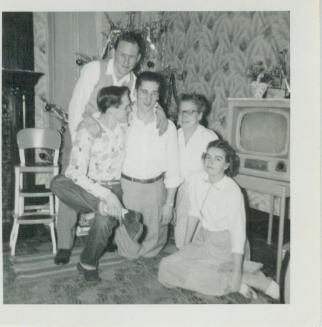
With the Davis Family 1954
To point out just how Pastor Davis was really like a father to me, he knew that it was important for me to get to the mid-week prayer meetings and special services. One evening he told me, when I got off work, to come to the parsonage for dinner. He knew that I wouldn't have time to return to my room and eat and then get back to church for the service. As I came out of the employees' entrance, there he was, waiting for me. Tears came to my eyes. I told him I could have taken the bus to the parsonage. As a pastor, I knew he had to be very busy. He said that I was just one of his boys and he would do the same for them.
What a lesson in life this taught me! Pastor Davis showed by his example how important it was to be a people person, to live humbly and serve others. And God has blessed me with a wonderful family, more than I ever could deserve!
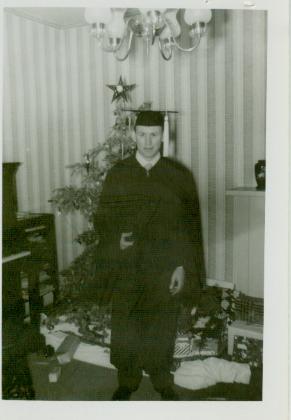
OSU Graduation Day 1954
On December 17, 1954, I received my Bachelor of Science degree in Engineering. I was happy that my mother was there along with other members of my family. The reason I didn't graduate in June is that I was two courses short of my degree. What a relief that I only had to take two classes that fall!
As I was about to graduate, the head of the statistical department at Lazarus offered me a full-time position in his department. I had gotten to know him, as well as most of the managers throughout the store. I also got to know Fred, Robert, and Charles Lazarus. This was because of my work in the mail room and receiving room. Often, I had to take merchandise out to the floor, and of course, in the mailroom I had to deliver mail throughout the store.
I really enjoyed my work in the mailroom because of the opportunity it gave me to meet lots of people. I turned down the offer of work in the statistical department because I didn't feel it was part of God's plan. I was thankful for the boss in the mailroom, too, because he was a Christian and gave me encouragement as well as good advice.
During my senior year I was put in charge of the mailroom on Saturday, since the boss there was off that day. I didn't really have to tell anybody what to do, since they all knew their jobs. I had the responsibility of handling any questions that might arise during the day, and seeing that the mail went out in the evening. I had to run a lot of mail through the Pitney-Bowes postage meter to stamp the letters. Some outgoing mail also had to be sealed.
One elderly lady in the mailroom seemed to resent the fact that I was put in charge on Saturday. The others there had no problem with me being in charge. I tried simply to be respectful to the lady. Here was an opportunity for me to show what God had done in my life in the last year.
Occasionally on a Saturday, Pastor Davis would come in and have lunch with me and his son. He also had a 30-minute radio program on Saturday morning at 6:30, which was the same time I had to be at work. I asked Mr. Klarman if I could bring my radio in to listen to it. The pastor had a wonderful voice and was very good in explaining the Word of God. The song that he sang in church and on the radio was "His eye is on the sparrow, and I know He watches me".
Mr. Klarman told me that I didn't need to bring in my own radio. I could use the one in his office and then put it back. The first time I used his radio like this, the same lady told me that she was going to tell Mr. Klarman that I'd done so. She also reminded me that he was a Catholic. I simply kept quiet. On Monday when I came in to work she said to me, "Why didn't you tell me that he said you could use his radio?" I replied, "You didn't ask". I wonder now if it would have made a difference if I had. Maybe I didn't handle the situation the way God would have had me.
One day my pastor wanted to know the names of all the people who worked in the mailroom on Saturday. He said he wanted to dedicate a song to us. When he mentioned each name, he forgot the lady who had been upset with me. She jumped all over me and accused me of deliberately leaving her name off the list. This is all I heard from her all morning! I felt really bad, and I wondered why God let this happen. I called Pastor Davis in the middle of the morning, and he said he had just forgotten her name when he'd read the list. He said not to worry about it, and he would come in and have lunch with me. When he came in he told her how sorry he was and that it had been his fault. The next Saturday, he mentioned that he had forgotten a lady in the mailroom at Lazarus and he wanted to dedicate a special song just to her. She was very happy the rest of that day. God's way is not always our way.
Part 7: Life in Ohio After College
After I received my degree, I wasn't sure what work I should pursue. If I'd had the money, I might have gone on to graduate studies. I felt that God had a plan for me, but I wasn't sure what that might be. In the winter of 1955 the president of a Bible college in Michigan came to our church for some special meetings.
I got to know him, as he was staying at the parsonage and I was also there on Sunday afternoon. He approached me about my coming up to the college and doing part time teaching while taking Bible courses. Even though this seemed a good thing to do, as the time passed I never felt in my heart that this was part of God's plan. One lady in the church told me that she felt that God was calling me to be a minister. I never felt that that was in His plans either.
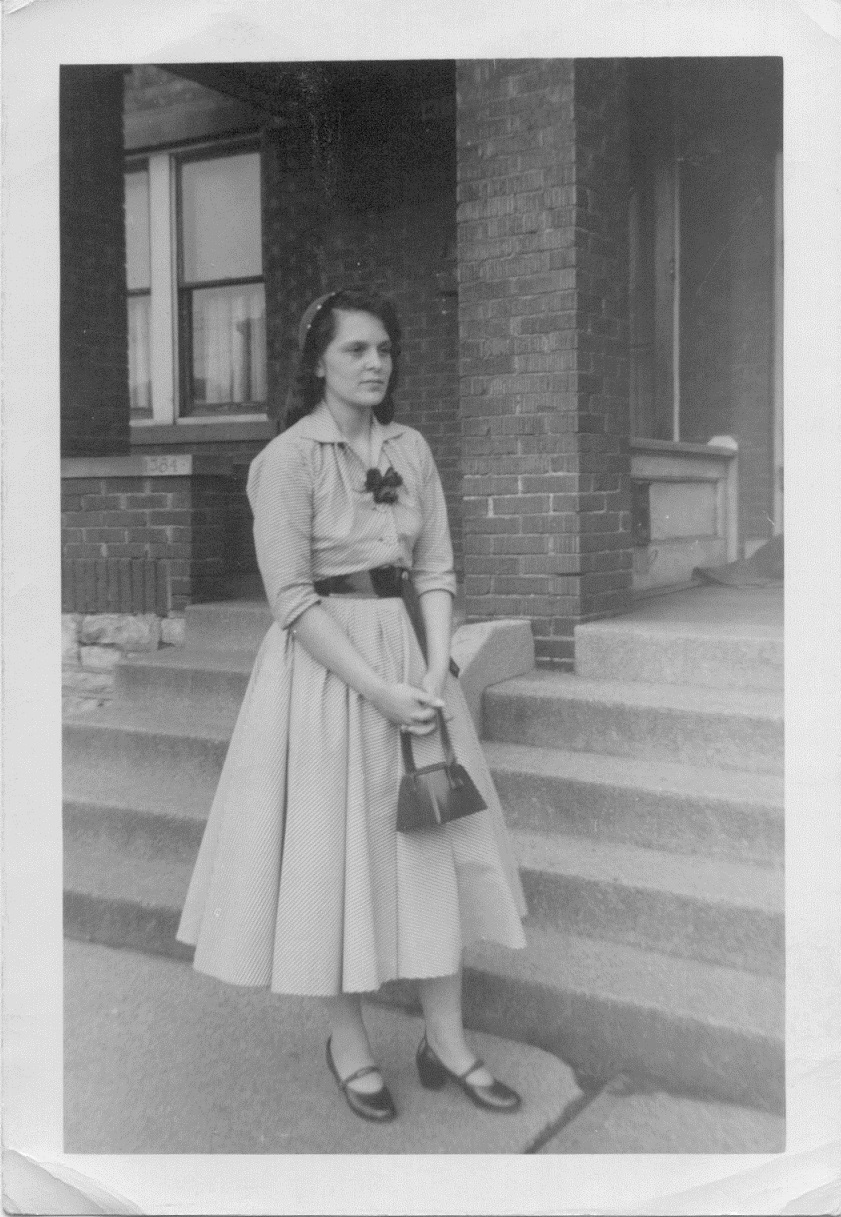
Nancy Ellen VanBuskirk 1952
In the meantime, I just kept my job at Lazarus. The lady in the mailroom that I'd had the conflict with kept saying to me, "When are you going to use your education and get a better job?" I kept quiet and went about my work. Sometimes I felt that the devil was fighting me from every angle. Again, I was thankful for a good pastor, a Christian boss and other employees in the mailroom giving me good advice and to just hold steady. The only explanation I can give for waiting upon God to give me an answer is that I knew people were praying for me. I believe God was telling me to wait and He would give me the answer in his time, not mine. Maybe He did want me to go to Bible College and I was just being stubborn! I must admit, that would have been a big jump for me, and I was scared, even knowing there would be students there who were older than me.
During the winter of 1955 I also met my future wife at a youth rally at her church. She sang in a trio and played the guitar. Another young lady played the accordion. They were well known in other churches in the Columbus area and were often asked to sing. My friend Milton, whom I'd met at Lazarus, went with me to the rally. Here I was, still without a car and a driver's license. Milton had a car and he was also going to OSU and majoring in engineering.
After the girls sang, I whispered to Milt that we should ask a couple of them out to go get a bite to eat after the service. I told him I wanted to ask the one playing the guitar, and he could ask one of the others. They seemed like nice, quiet young ladies who loved the Lord. Guess what? They weren't the quiet girls we thought they were! In fact, we were lucky to get a word in. Before we parted later that evening, I asked the one, Nancy, if I could have her phone number. She gave it to me, but I soon found out that she was dating another man. I did get my date with her, though, and as the year went by, we began dating more seriously.
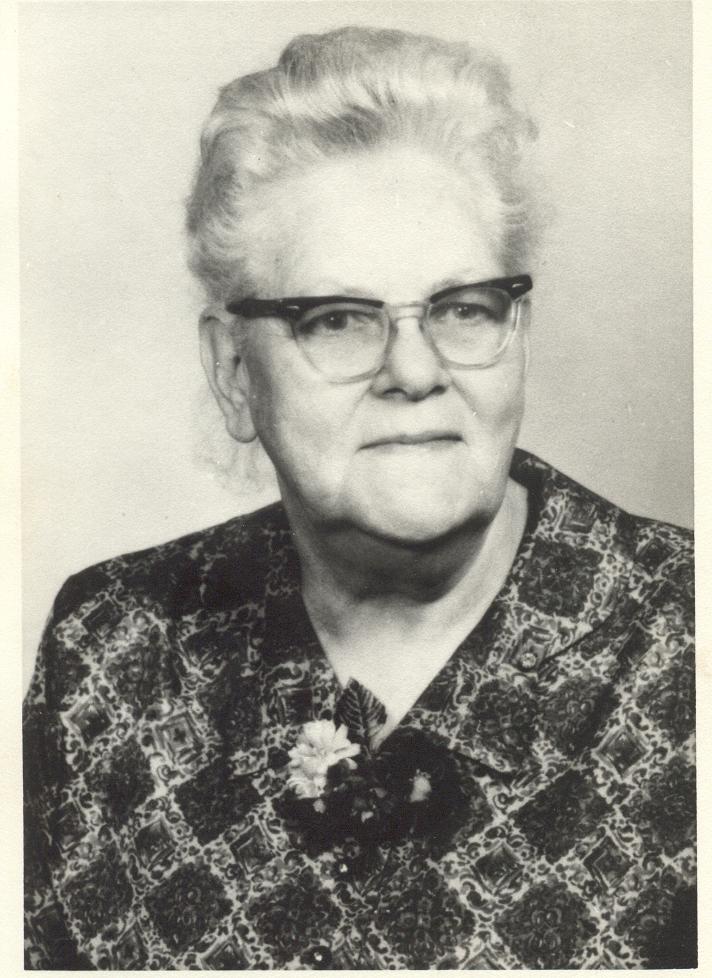
Nancy's Mother, Bessie VanBuskirk
I grew to love Nancy's mother, Bessie Buskirk. She was a lot like my own beloved mother. Both of them were divorced and raised large families. They were both good cooks, too. They say you can tell how good a cook your wife will be by how good a cook her mother is. I believe this to be true. Bessie was a very godly woman as well. Nancy had accepted Christ at the early age of nine and was very knowledgeable about scripture.
In the summer of 1955, while still working at Lazarus and waiting on the Lord for an answer for my life, a man came to Ohio State to work on his Master's degree. He had a room at the same place I did. Most of the students had gone home for the summer. One day he asked me to play tennis with him. I said, "Dick, I am not a tennis player". If you had ever seen me play tennis, you would know in a moment that I was telling the truth. He told me that at least I could get the ball and hit it back to him! This would keep him from having to go get it himself. I agreed, and we played tennis together two or three times.
All I knew about Dick was that he was working on an advanced degree and was a Business teacher at a high school. A few weeks later, he called me and said he had been hired as Superintendent of Schools in Oakwood, Ohio, which was located in the northwestern part of the state, 130 miles from Columbus. He said he needed a Math teacher, and he wanted to hire me. I told him that I did not have an Education degree, or a teaching certificate, and I had no teaching experience. All I had were a couple of education courses, which I didn't tell him I thought were worthless. He told me not to worry, he would get me certified by the State of Ohio, and I could do my student teaching on the job. This meant that I didn't have to take any student teaching courses in college, and that I could get my permanent teacher's certificate by going to summer school. He said that he and the county superintendent would be my supervising teachers at the time.
Since the owner of the rooming house had taken the call and knew that I didn't have a car or driver's license, he offered to drive me up to Oakwood that weekend. When I got there and looked over the school, I knew that this was God's plan for my life. I signed my first contract, for $3100 a year.
What were the chances that a hay-seed Depression boy, meeting a man in the same rooming-house, and getting acquainted by playing tennis, would find his start in his life's vocation? I was excited, but I also had some fears. I knew that God had been good to me, and He would be with me.
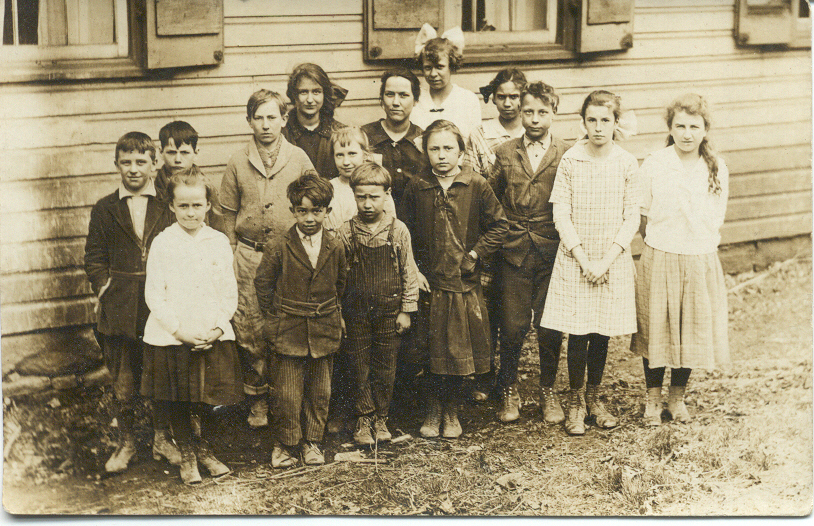
Aunt Hannah and class
I was reminded at that time of something Pastor Davis' wife Myrtle said to me. She had said that she believed God wanted me to be a teacher. She had told me that in the spring of that year. Her counsel resonated with me, too. I come from a long line of teachers. My mother was a teacher for a few years and her sister, Aunt Hannah, was a teacher for 51 years. After she retired, she would go back and substitute. One of her nieces became a teacher, and one day, Aunt Hannah was her substitute. I believe this was a 3rd grade class and the students had no idea Hannah was their teacher's aunt. When her niece came back to teach the next day, a student told her that the substitute must have been 100 years old!
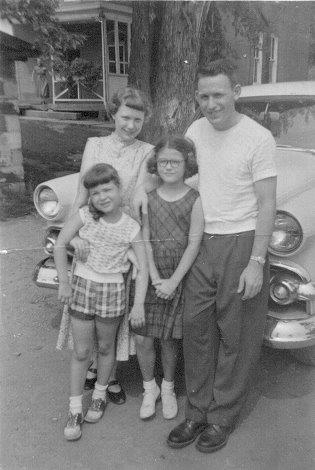
My First Car
My Sister Nancy is the taller girl
The owner of the rooming house said he wanted to help me get my driver's license and a car. He was the first person that offered to do this for me. He took me out to practice several times and then helped me find my first car, a 1955 Ford Fairlane that had been repossessed. I remember going to downtown Columbus to take my driver's exam. I was very nervous, especially about parallel parking. I prayed all through it that God would help me pass! After I parked, the officer told me that it was perfect. "Praise the Lord" I whispered to myself. God knew that I needed a license and a car for my new job.
Nancy, whom I was now dating, was happy for me. I also knew that she was praying for me. I knew, too, that we wouldn't get to see each other as often. She had her job as a key punch operator for Blue Cross, and also a car in which she could take her mother to church. She would have loved to have gone to college after high school but didn't have the funds to leave home and attend Bible College. She often regretted that she hadn't even been able to take classes at OSU, which was right in Columbus. She was very close to her mother, and didn't want to leave her all on her own, as well. Nancy's older brother, Bill, who was a father figure to her, was helping to support the family, and he also assisted her in getting her first car. Bill bought a house in which Nancy, and her mother and younger brother, Mike, lived with him.
In my first year in Oakwood, I taught 8 th grade Math, Algebra I, Geometry, Algebra II, and Chemistry. I also taught Solid Geometry on the three days I didn't have Chemistry Lab. In addition, I had to supervise a study hall which had a lot of 7th graders in it. (The school was a small high school that included the 7th and 8th grades). There were eight periods in the school day. I had one period a day for planning. I'd had no idea when I'd taken the job that I would have to teach Chemistry. I do remember my 8th graders, a class of fifty students. With a small blackboard, and five rows of ten students, I thought I would have a lot of discipline problems. However, I really enjoyed this group of students, and I felt that God helped me in this class, as well as all of the others.
I was also given the job at Oakwood of being the advisor to the student council. One responsibility I had was being in charge of the students after lunch, while they played games in the gym. Another responsibility was to have a minister come in every Wednesday to speak to the student body during our religious assembly. With a list in hand, I soon gave the job of calling a minister or priest to the president of the council.
John, a student in my Chemistry class, always seemed to get into trouble. He was an adopted son of the school board president. His parents were wonderful Christians, but John didn't seem to want to follow them in the way of the Lord. He had some serious behavior problems. One day, he got into a fight at noon in the gym. It took myself and another teacher to get him to the office. He was suspended for a couple of days.
Having John in my Chemistry class caused me concern. I was afraid that he might do something that would cause injury to himself or one of his classmates. There were about fifteen in this class. We had no fume hood to do certain experiments. Some we were able to do by opening the windows.
One day during Lab I heard John tell another student, "We should make a bomb and throw it out and blow up the school". I spoke up and said, "John, you've got it wrong! You should make the bomb, get out and throw it IN!" The students erupted in laughter. I know that today, if I made a joke like that, not only would John be expelled, but I would be out of a job! Looking back, I realized that maybe I shouldn't have said it, but we were living in a different time then, and really didn't have problems like that. The sad thing about John is that he was killed a couple of years later in an automobile accident. He was speeding, and missed a turn in the road.
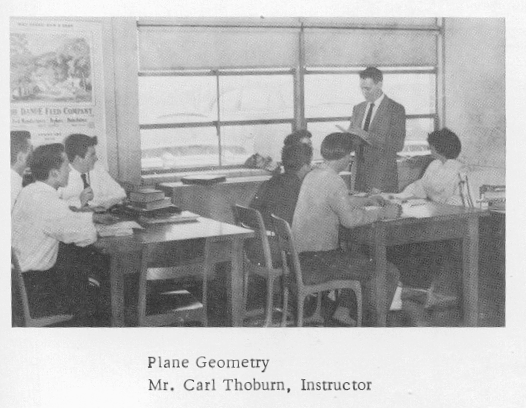
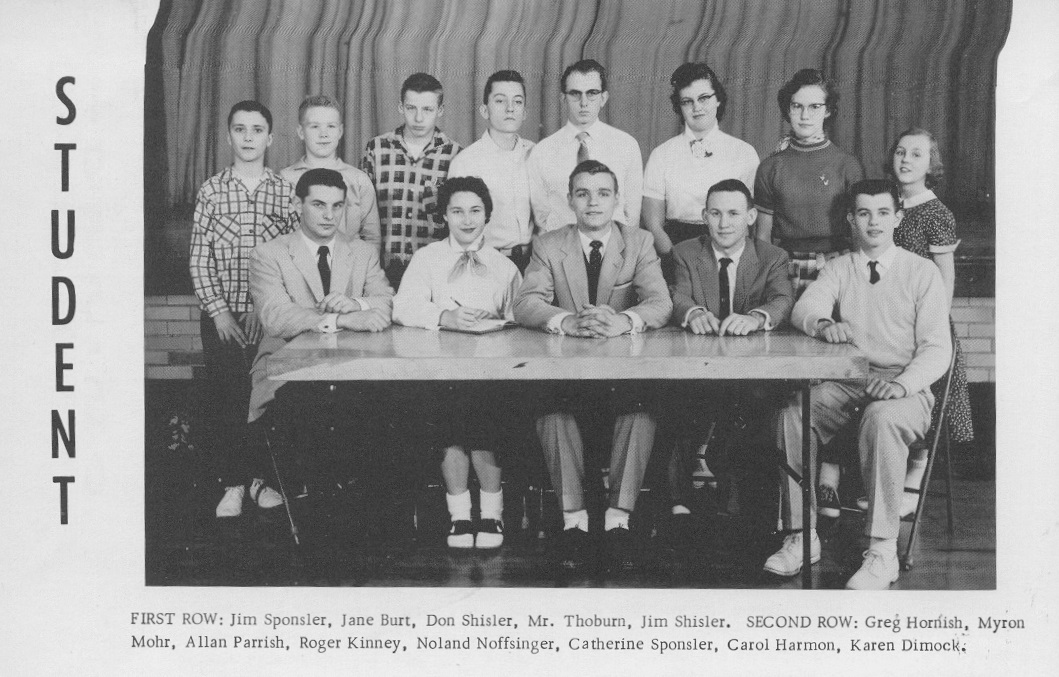
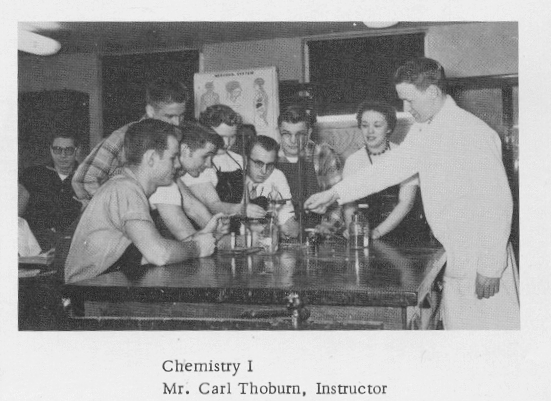
My biggest discipline problem, besides dealing with John, was with two or three of the 7th grade boys in my study hall. They would just do little mischievous things like throwing paper airplanes when I wasn't looking. I was reminded of how much I had been like that as a boy. In my case, it wasn't in school, because I knew the stern punishment I would receive. One day, I sat in a student chair in the back of the room, and one of the boys looked this way and that for me, and when he didn't see me, he threw a paper airplane. I hollered his name, and he almost literally came up out of his seat.
Around November, I told the superintendent about these boys. He asked me if I had ever entertained the thought of spanking any of them. I told him that I had never spanked anyone in my life and that I hated the idea of spanking someone else's child. The next day, one of the boys misbehaved, and I told him to come out in the hall with me. I got the paddle from the principal's office, and another classroom teacher to be a witness. This was required if we spanked anyone, and we also had to report it to the superintendent's office before we left school that day. I gave the boy two or three whacks with the paddle and he burst into tears. One of the other boys came to the pencil sharpener and pretended to sharpen his pencil, so he could listen. As he was doing this he was laughing. I told the second boy that if he thought it was funny, maybe he deserved a couple of whacks too.
To be honest with you, I felt bad the rest of the school day. As I gave the names of the students to the superintendent, he remarked, "Don't you feel better now?" My answer was, "I think I do." Thankfully, I had no more trouble the rest of the year in the study hall, and had little discipline problems in my classes.
Early in my career, I had a young man come into my classroom and say, "Good morning, Carl." I said, "Good morning, Mr. Parrish." I had no more trouble with him calling me by my first name. It is not that I felt that I was better than he was, but you do it out of respect for your elders. Later in my career a few teachers started allowing their students to call them by their given names. I never was comfortable with this, though, and continued to use titles and surnames with my superiors.
It was a wonderful feeling while I was teaching, that I was not only instructing young men and women in academic subjects, but I was also helping them learn to be good citizens in life. I felt sure that this was where God wanted me to be. I was very busy that first year, and had little time to think about Nancy during the week. I often went back to Columbus on the weekend, though, to see her, and either go to her church or my own.
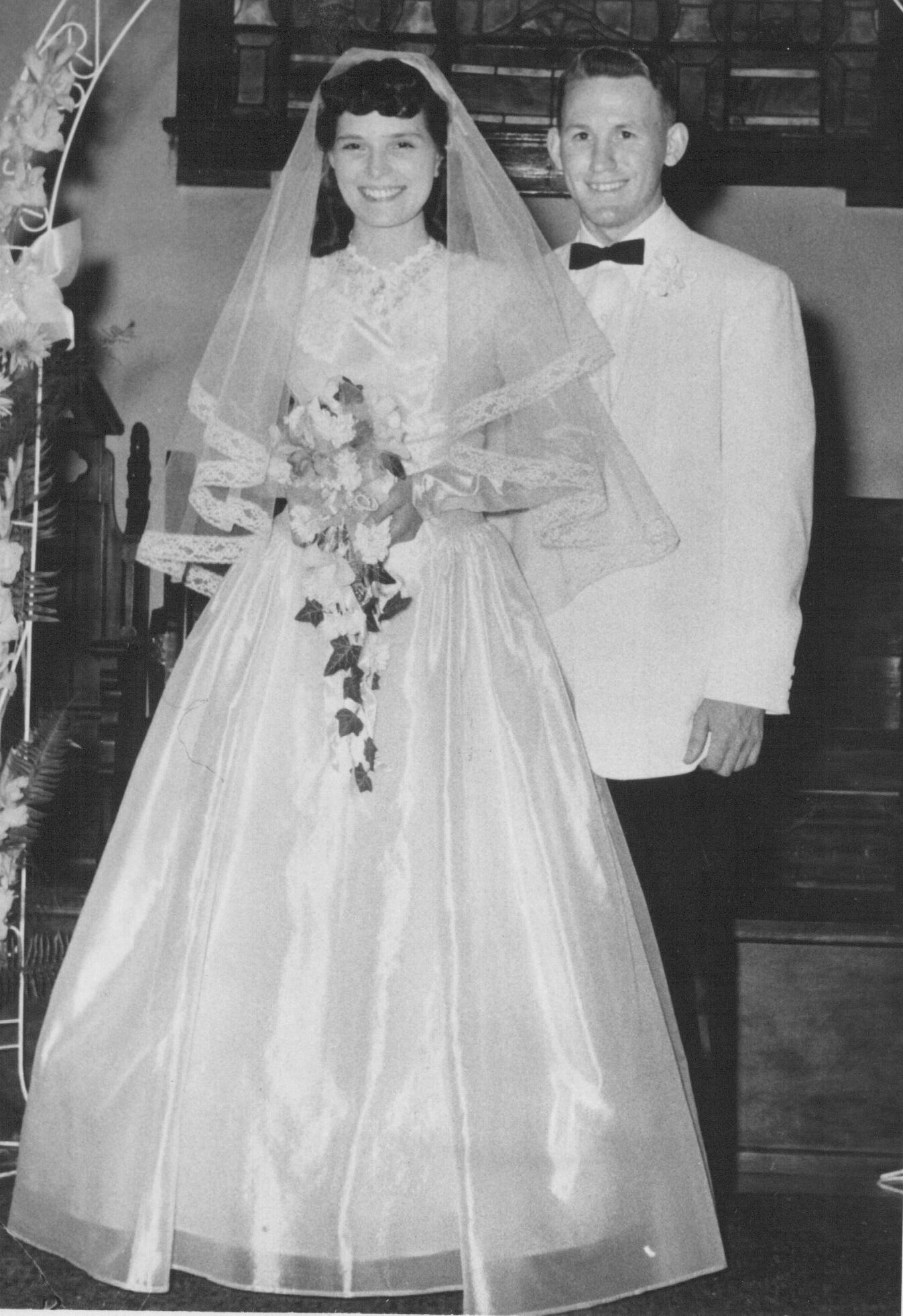
Our Wedding, June 9th, 1956
Once, when I was grading the Chemistry Lab books, I saw a note from one girl to another. It read, "You are not going to marry Mr. Thoburn, because I am". I showed it to the school secretary, since she was one of the girls' aunts. She laughed, and told me I should hear the girls when they were over at her house. I was very flattered. I thought maybe it was time to ask Nancy to marry me, and let it be known that we were engaged. I asked Nancy around Christmastime and she accepted. We were married the next summer, on my birthday, June 9th . My brother Harold was my best man, and the other girls from the trio were maid-of-honor and a bridesmaid. My younger sister, Nancy, and my fiancé's niece Kitty were bridesmaids, too. Her nieces Sue and Patti were flower girls. We were married in Nancy's church and spent our honeymoon in Indiana. We had to be back in Columbus the next week, as I had to attend graduate school at OSU. I went on over the next two summers and completed my teaching certificate.
Nancy and I rented a house in Oakwood close to the school, and I was able to walk across my lawn and the school's ball diamond to get there. This enabled Nancy to have use of the car. It was a nice place to start our marriage. The rent was $40 a month. Nancy went into Defiance, fifteen miles away, to apply for a job. Defiance had a population of about 15,000, and offered more opportunity for work. Nancy was told that the export manager at a muffler factory needed a secretary. My first reaction was that I didn't want my new bride working in a place like that, with all those men. It turned out to be a good job for her. The reason he needed a secretary was that he needed someone who could take dictation in Spanish. Fortunately, Nancy had taken two years of Spanish in high school and passed the test. She not only got the job, she made more money than the other secretaries because of her Spanish language ability.
You never know when you are taking something in high school whether it might be beneficial to you later in life!
This was true in my life, also. Having an Engineering degree helped me to explain at times to my students why certain facts are being taught to them. One example is when I am teaching them about parabolas, ellipses, and hyperbolas in Algebra and Analytic Geometry. Many of my students seemed to appreciate my teaching them how certain lessons were used in the real world. I was seeing more and more why God was leading me this way.
I often said to my co-workers that I felt that having a degree in your field was more important than all the education courses that are required. I would say that around 98% of the education courses at that time were worthless. Also, I believe that a teacher should have at least three years' experience teaching before they get their Master's degree, and three to five years teaching before going into school administration. I know some disagree, but that's my opinion.
After teaching for three years at Auglaize Brown High School in Oakwood, I applied for a job at Defiance High School. It was closer to where Nancy worked, and where we went to church. I received a letter back saying that they had no openings in my field. I wasn't all that disappointed, as I was enjoying my work in Oakwood. While I was teaching at Oakwood, they built an addition to the school which included a new Science lab. We now had a fume hood and a better supply of chemicals and apparatus to teach Chemistry and Physics. An increased enrollment in these two subjects resulted in my teaching both of them in the same year.
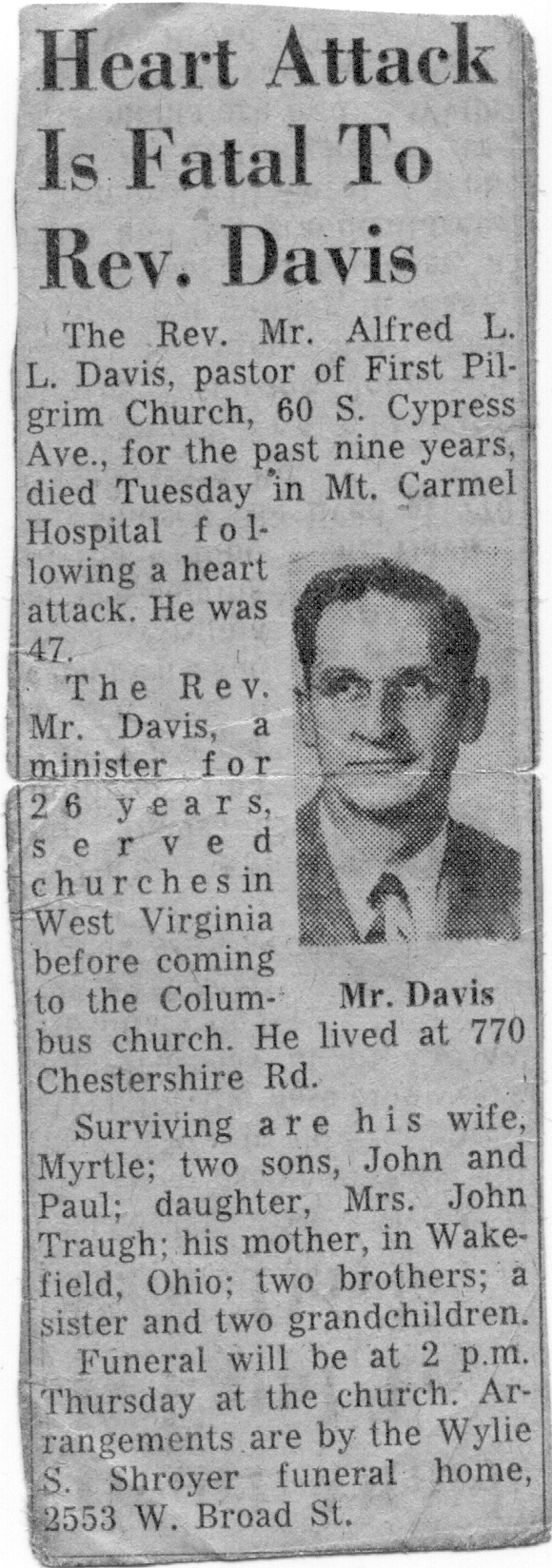
Rev A. L. Davis
On January 14th ,1958, I received some very sad news. On the way to church that evening, my wife told me that Pastor Davis had had a heart attack while in his office in Columbus, and had died on the way to the hospital. Believing that the funeral would be on Saturday, I thought that I would be able to attend. We were in the middle of semester exams, and I knew it would be hard for me to attend during a week day. To my surprise, the funeral was held only two days later, on Thursday, and then another service in Huntington, West Virginia, where Pastor Davis had grown up. I am still rather sad to this day that I wasn't able to attend his funeral, but I do have the assurance that I will see him again in heaven.
My fourth year at Auglaize Brown High School was a very good year. We found out that we were expecting our first child in May. During our first year of marriage, Nancy had suffered a miscarriage, so we were very excited about the baby.
In February of 1959 we had a huge ice storm which covered the Auglaize River, which ran through Oakwood. People who lived in small houses near the river had to move out. The music teacher came to live with us for about two weeks. His wife was also expecting their first child in May. We missed eleven days of school. We didn't have to make them up, though, because the storm was declared "an act of God". Later in my career, students would ask why we had to make up snow days. My answer to them was that we had removed God from the schools, and we could no longer call it an act of God. Though I was being humorous, I felt that God made it possible for me to witness to my students through these remarks.
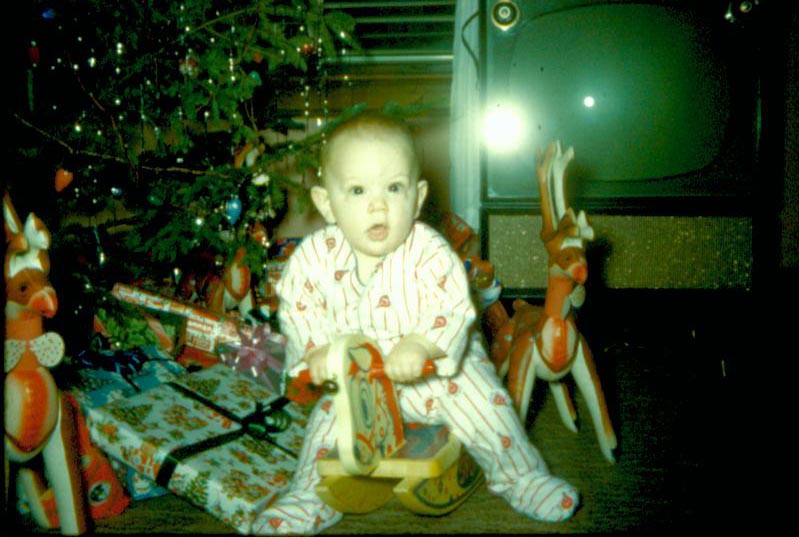
Steve - First Christmas
On Mother's Day, appropriately, May 10th , God blessed Nancy and me with our first child, a boy, whom we named Steven Carl. I didn't want him to be named after me, but I accepted Carl as his middle name. Steve was a bouncing baby boy, the pride and joy of young new parents. He was sturdy and pretty, with big brown eyes and a tiny bit of blond hair.
In early June 1959, not long after school was out, I was elected Sunday School Superintendent of our church in Defiance. I didn't feel worthy to take on this responsibility, but it gave me an opportunity to grow spiritually. A couple of days after that, I got a letter from the superintendent of Defiance High School that they now had an opening for a math teacher and wanted me to come in for an interview. I was offered a job and immediately accepted. Again, Nancy and I praised God for the way He was leading us!
While in Defiance, Nancy taught the adult Sunday School class at the Church of the Nazarene. We had been unhappy at the Pilgrim Holiness church there, and had decided to go to the Nazarene church, a denomination that we continued in for almost twenty years. I was and still am very thankful for her obedience to our Lord and Savior, and her willingness to be used by Him.
The new position in Defiance gave me an opportunity to work in a larger high school. It was very hard for me to tell the superintendent in Oakwood that I was resigning. He said he was happy for me, and that he had known that I would probably leave. I assume he made a good recommendation for me. I found out the next year that he had accepted a new position, as well, at Bowling Green High School.
We moved to Defiance in the summer, just across from the high school. Again I could walk to school letting Nancy have the car during the day. Another blessing in this job was that it made it easier to do my work as the Sunday School Superintendent.
I enjoyed teaching in Defiance, since I only had to teach math, and not science, courses. However, they did put me in charge of the Science Fair while a teacher there. Though no credit to me, we did have some wonderful ones. I had a young man in my class named Phil who asked me for suggestions as to a math project he could do. Liking combinations and probability I suggested this to him. He decided to do his project on the subject, and occasionally came to me for advice; but mostly he did it on his own. One of the judges for Phil's project was a Math professor at Defiance College. The professor told me that this young man, only a freshman, knew more about the subject than his students. He invited him to come to the college and explain his project. Phil went on to win first place in the District Fair and then he won first place in the State! Later he enrolled at Ohio State, majoring in Mathematics. Unfortunately, like many of my students, I lost track of him after that.
My second year at Defiance High School, I was given a National Science Foundation scholarship in Calculus at Bowling Green University one night a week for a 2-1/2 hour class. I also got the scholarship for the second semester. The Chemistry professor who was in charge of the National Science Foundation program came to see me before class and told me that one of my students back in Oakwood, Jack O., had enrolled there at Bowling Green and had done so well on the Chemistry placement test that he was allowed to bypass his first two Chemistry courses. My remark was that Jack would do well no matter who his teacher was.
The next summer I took a course at Bowling Green in Analytic Geometry. In the summer of 1962 I was given a National Science Foundation scholarship for eight weeks at Kent State University. Even though I was offered NSF scholarships at two other universities, I took this one. It was a paid scholarship, too, $135 tax-exempt. It was simply God working His will in my life and bestowing more blessings upon this ornery little farm boy, born in the Depression.
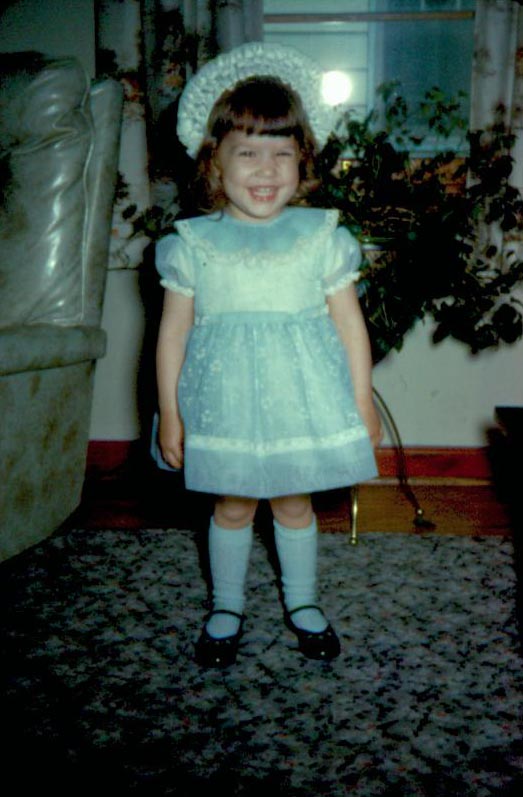
Our Second Child, Beth
In the meantime, our second child, Elizabeth Lynn, was born on October 22nd, 1960. Beth, as we called her, was born with dark hair. She was smaller than Steve, and very lively. Our friends thought she looked just like her mother, but the older she got, the more she looked like me.
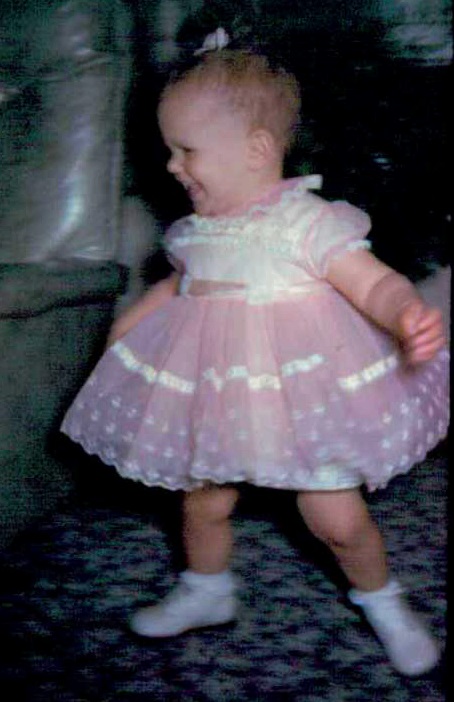
Our Third Child, Anne
The following year, our third child, Anne Christine, was born on November 20th . All three of our children were born at Defiance Hospital. Annie was a happy and healthy little girl who looked a lot like her brother at birth. Somehow, she survived infancy, and thrived, in spite of being the third child in 2 ½ years. And in 1962, here I was, going away for eight weeks in the summer and leaving my wife to care for three children, the eldest of whom had only just turned three!
I must say that Nancy did a wonderful job rearing our children. I was able to get home on some weekends during those eight weeks, and Nancy and the babies spent one week with her mother in Columbus. Then she came up to Kent State the last weekend I was there, to spend some time with me and enjoy a banquet, and a concert directed by one of my professors. He not only was one of my three professors, but he enjoyed music, as well, and often directed concerts throughout his career.
While I was at Kent State, I had difficulty with my right ear. When I got back to Defiance, I traveled to Toledo to see an ear specialist. He told me that I had a bacterial infection. I made several trips to the specialist for treatments, but I continued to have trouble with my ear.
At Kent State, I was fortunate enough to take the SMSG (School Mathematics Study Group) under the chairman of the committee. I later came to jokingly call it 'Some Math, Some Garbage'.
A couple of years after I started teaching in 1955, I began selling World Book Encyclopedias, mostly during the summers. I would never go to a home where I was teaching their child at the time in school, though. In fact, I enjoyed going to homes where there were young children. After my training, one of my first homes was one where there was a young child about six years of age. I was showing the Birds article to the family and the little girl asked, "What can a bird do that an airplane can't?" I couldn't think of an answer right away, and told her I gave up. She said, "Birds can flap their wings!" I was very nervous, but the father told me they were going to buy a set, but to please finish my presentation. He really helped to put me at ease.
With God's help, I had great success selling World Book. In both 1964 and 1965, I earned trips to the World's Fair in New York City. I was able to take the whole family as well as Nancy's mother, Bessie, the second year. Our kids really enjoyed the encyclopedias growing up. The Birds article became one of Bethie's favorites; Steve could often be found reading the volumes just for fun. There wasn't much TV back then and there weren’t any video games either. Kids had it tough, hahaha! Now of course, kids have all the information of the world at their feet, through the internet. Sometimes this isn't a good thing, I know, but I support kids having the chance to learn as much as they can about God's creation, and the history and stories and mathematics of the ages. Another publication of the encyclopedia company was a set of volumes called "Childcraft". One of the volumes was of poetry for children. When Beth was two, her favorite was one about a popcorn man. I came home from teaching, and Nancy told Beth to get the book and show me the poem. She searched for it by herself for a few moments, until Stevie, age three-and-a-half, piped up, "Why don't you look in the index?" Beth tells me she was emotionally scarred by how smart her older brother was— she's kidding, of course!
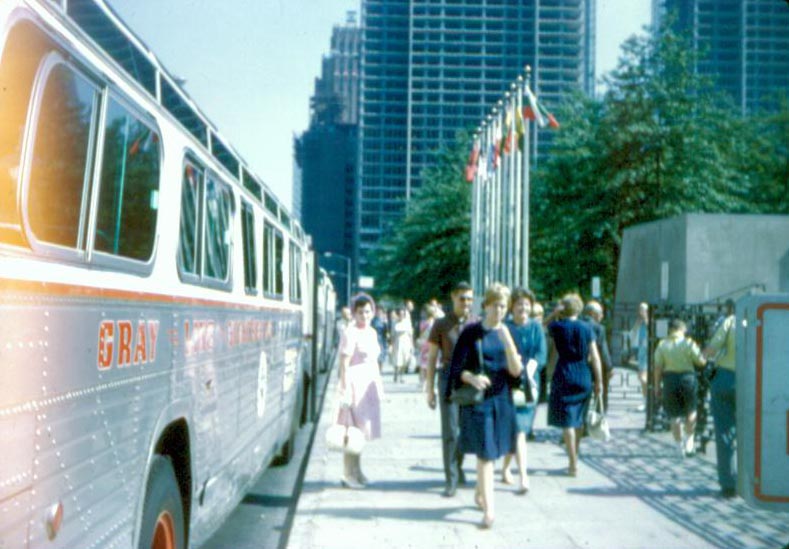
Nancy (Pink dress) Worlds fair, NYC
Steve was obviously smart and cute and was becoming a bit of a comedian. While having breakfast with me, we were reading the word 'c-a-r' on the cereal box. I asked him, "How would you spell my name, 'Carl'?" "Oh!" Stevie said, "that's easy! 'D-A-D!'" By the time Steve was four, he was telling knock-knock jokes to his Grandma. I don't have any idea where he could have gotten his sense of humor, of course!
Beth had a remarkable vocabulary of her own, though! She was still a toddler, when the babysitter opened the dishwasher, and Beth said, "This is where you put the detergent!" She continued to grow into a cute, smart little girl.
While teaching mathematics at Defiance High School, I had the privilege of teaching a workshop to Elementary school teachers, and another workshop to parents. They wanted to learn more about the math program. I'm sure I learned plenty as well, by teaching, as my workshop students did in my classes.
I also had the privilege of getting to know the janitors in every school in which I taught throughout the years. I always found at least one who was a Christian. Sometimes I would take my lunch and eat it with them in the furnace room. I had great respect for the custodians and their service to the school. If I caught a student writing on a desk, I made him or her come in after school and clean every desk, including mine. I provided them with the 409™ spray and a sponge. I remember one occasion when I caught a student just a few days after another student had cleaned the desks. I sent him across the hall to clean the desks in Ms. Medlen's classroom. The students soon learned respect for the job the janitors had.
In the spring of 1963 the principal called me in to tell me that they were going to begin having department chairmen in each department. They had selected me to be the chairman of the Math Department, and planned to announce it at the next faculty meeting. This bothered me because I knew that two of the math teachers had been raised in Defiance, and had been there longer than me. But before I could say anything, the principal told me that there would be some disappointed, maybe even angry, that they didn't get the job, but not to let it bother me. The administration felt that I was best qualified for the position. Once more, I saw this as a blessing from God, not without added responsibility, and maybe some resentment from others. Again He helped me through the year without any problems.
One of my first responsibilities as Chairman of the department was to go to a neighboring county and speak to the math teachers on the new approach to mathematics. This resulted in a lot of prayer and preparation on my part. I felt inadequate to the task, knowing there would be many teachers there with more experience than me. Yet again I was reminded that God doesn't call the qualified, He qualifies whom He calls. It reminds me of that great old hymn, Trust and Obey. Of course, this doesn't mean that we shouldn't prepare ourselves as best we can. I ended up really enjoying the time I spent with this group.
In the spring of 1964, my brother, Bob, called me and asked if Nancy and I were interested in coming to Fairfax, Va., just outside Washington, D.C., to teach in his Christian school, begun in 1961. I took a thirteen-hour train ride from Defiance to Washington, during the Easter break, and visited with him and the school. I really enjoyed the train ride, especially the scenery through the Appalachian Mountains.
The school was still in its infancy when we came to Virginia to accept jobs and enroll our children there. It was housed in a big building in the city of Fairfax and another house nearby on Main Street. The house was a large wooden house, which was probably over 100 years old. It had a beautiful yard, with box hedges and a small fishpond, in the back. Three sides of the house had porches, some screened and one on the upper story. This house would be where my family would live on the second floor, with the kitchen and classrooms on the first floor.
It was very difficult for me to tell the administration in Defiance that I was resigning my position to take this job. They even offered to put me on the top of the pay scale if I stayed. It was hard to refuse the offer, but I felt that Nancy and the children would benefit more if I took the position in Virginia.
Nancy and I felt strongly that God was calling us to move to Northern Virginia, despite my success teaching in Defiance, and our happiness living there. At the fledgling school in Fairfax, I would be the only Math teacher for the third through the twelfth grades!
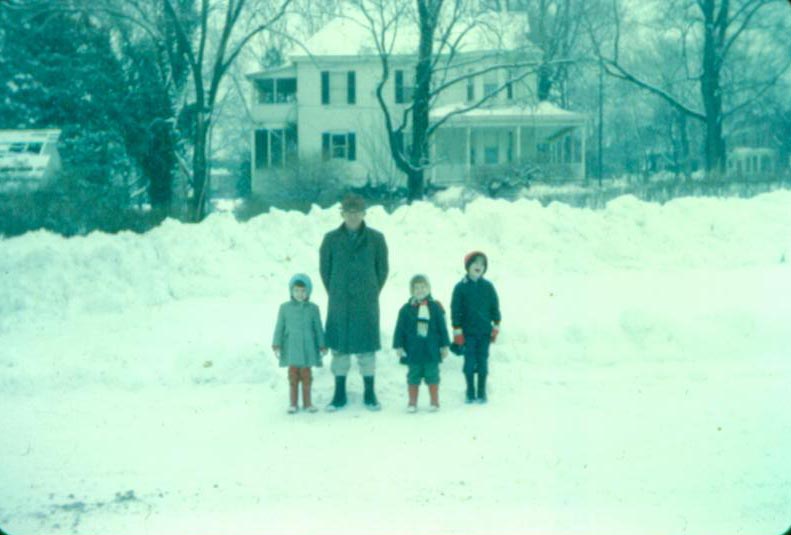
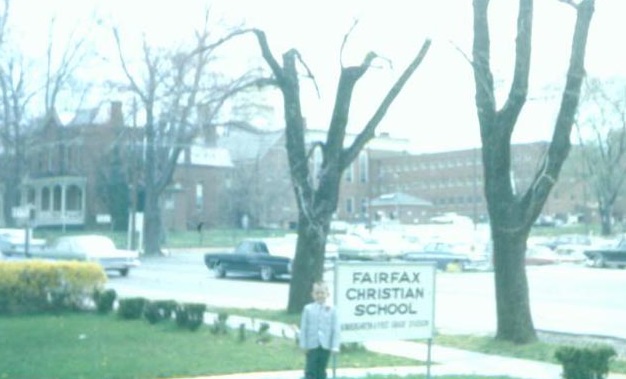
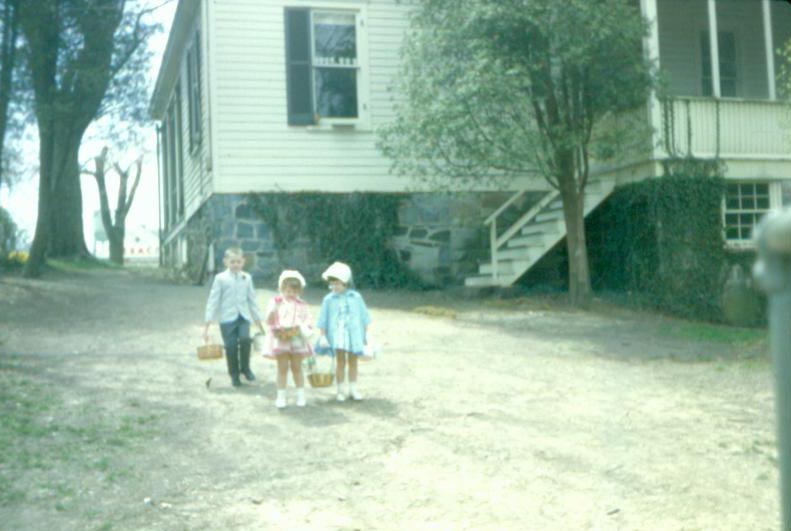
Both my brother and his wife, Rosemary Sweet, were graduates of Muskingum College in New Concord, Ohio. Rosemary trained my wife Nancy in the teaching of reading through the use of phonics. Rosemary was a great teacher and Nancy was a quick learner. I am positive that Nancy learned more from her than she would have if she had gone to college. Back then, the emphasis was on learning to read by "sight-reading" and the old phonics method was being discarded. To this day I cannot understand why. We soon learned what a difference the use of phonics in teaching reading made. I always felt that our move to Virginia was an opportunity for Nancy to begin her teaching career.
Nancy already had a lot of insight into how to teach young children. She gives me credit for giving her pointers in how to teach arithmetic. That first year, Nancy's job was teaching the pre-kindergarten class. Our own little girls, aged three and four, were in her class, along with our nephew, Lloyd, and his cousin, Dawn. Eight other little tots joined them. Nancy says she doesn't know who had more fun, her or the kids.
Beth has a few vivid memories from our time in that old house. She remembers finding a robin's egg on the ground, and the scent of the boxwood hedges. The kids were fascinated by the small goldfish pond, an old-fashioned concrete oval a few feet deep, and the fact that the fish could live under the ice in winter. It really was a heavenly setting for children to play and learn in.
After all these years of teaching, I will admit that Nancy was a better teacher than me. I can't imagine teaching such little children! Nancy began as a kindergarten teacher, but most of her career over the span of nearly forty years was as a first grade teacher. When our church started a Christian school in 1981, she was their first teacher. In Virginia, Nancy was given the priceless opportunity to help shape young lives in God's Word. I became amazed at how God used her, given her limited higher education.
The move to Virginia was also good for our children, as they were able to get their start in a Christian school. It was wonderful too, that they learned to read by the phonics method. Steve learned to read by the age of five, even reading the newspaper! He loved reading so much, that one Sunday as we were leaving for church, he took a book with him and on the way out the door, was so absorbed in it that he fell down the steps. Fortunately he didn't get hurt! Beth and Anne followed by being good readers also. It's no wonder we were sold on the phonics method!
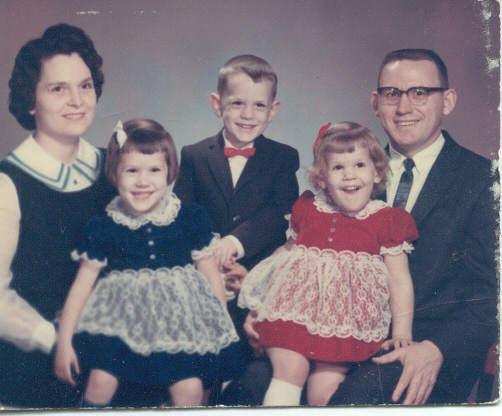
Our Family - 1965
We had purchased a new camera when Steve was born, and had taken many photographs of the kids as they came along. The negatives were slides which could be viewed via a projector and screen. After dozens of pictures of her older brother and sister, Annie would become quite annoyed. She folded her arms together, and demanded, "WHERE is ME????" Anne had blonde curly hair in her childhood, and the same big, expressive brown eyes as her brother and sister. She was a very outgoing kid who made friends easily.
Beth had a timid nature, but once one gained her confidence, she had a sparkly personality that also enjoyed funny stories and jokes. When she was seven, a friend made the comment, "Beth looks like a china doll!" She was smaller in size and it was easy to see how she could be described that way. She often was made the 'pet' of others in her class, which probably delayed her in some ways, but she was happy to be a little mouse, reading or drawing, snug and secure. She was an extremely affectionate little girl.
Anne's leadership qualities were evident at an early age. When she was four, she asked Nancy, "Mommy, why didn't you marry the king of the world, so I could be a princess?" At age six, she saw that I was lying on the sofa, groaning and pretending that I was sick. She put her hands on her hips, and said with great authority, "Daddy, you're going to cry wolf once too often!" She would develop her own prank-playing ability to a tee as she grew up!
Anne could hold her own with the boys, too, no matter how rough their games were. She would often come in with scrapes from playing hard. She excelled in athletics as well as academic subjects. Often people would mistake her for the older sister, she was so willing to grab the bull by the horns in various situations. If the kids were playing touch football in the street, Beth would be nowhere to be found, but like as not, Anne would score the winning goal. Both she and Steve had their share of breaks and sprains!

Liberty Street - Backyard
After teaching for three years at Fairfax Christian School for my brother, I applied for a job in the Arlington County public schools. I felt that I could be more of a witness for God there, and I knew He would be with me. In the spring of 1967 I was offered a teaching position in Arlington. My brother Bob knew a lawyer in Arlington who had a house to rent there, and we moved.
When we were getting ready to move, the owner of the house said he wanted to paint it first. My wife told him that her husband was a good painter and had the summer free to paint. He agreed to let us move in and paint it ourselves. He said he would not raise the rent, and we could pick out the paint and he would pay for it.
Just after we moved in, the math supervisor called and offered me a position teaching summer school at Washington-Lee High School, which would pay me one sixth of next year's salary. The high school was just two miles from our house, which made it possible for Nancy to keep the car when she needed it. I taught in the morning and painted in the afternoon, and graded papers in the evening. What's more, I got to teach Geometry, one of my favorite subjects.
I spent two years teaching in the middle school there. In the spring of 1969, the county Math supervisor asked me if I wanted a position at Washington-Lee High School. I taught at Washington-Lee for the next twenty-seven years, and enjoyed my time there. It was ranked then as one of the top ten high schools in the country, and has a high rating still today.
To our great sorrow, my beloved sister Nancy died at the young age of thirty, in childbirth with her second son, Michael, in 1969. I am most thankful that my wife and I got to spend some time with her before she died, when we took our family for a visit to Columbus during the holiday season. My wife's mother lived about a mile away and we were able to spend some time together. When Nancy died in January, my mother was already there, to help her with Bobby, six years old, and with the new baby, Michael.
When I received the news, I almost went into shock. I put on my heavy winter coat and simply walked the floor, wondering why this had happened to my beloved sister. My pastor came over that evening to help comfort us, and he understood, having lost his two-year-old son to pneumonia. All I can say is that our loss was Heaven's gain. I knew it was really hard on my mother to see one of her children precede her in death. Being a Christian herself, I am positive, gave her much strength through the pain.
In November of that same year, my wife Nancy's younger brother and childhood playmate, Michael Buskirk, died from injuries from a traffic accident. Our whole family, even the children, was in deep grief, and sometimes confusion, over such personal tragedy.
Today, I know my sister would be proud of her two sons. One grew up and married a lady he met at Bible College, and they are both Christian school teachers today and raising two lovely girls. The other son works for the Columbus Fire Dept. A few years ago, I went with them to visit her gravesite. It was a very touching time. My sister's husband, Bob Crace, remarried a little over a year after my sister's death, and his wife Joan had a boy of her own. She was a beautiful Christian and we all came to love her like another sibling.
One day while teaching I overheard one student say to another, "Who is he looking at?" As I said earlier, I was born with a lazy eye. God immediately brought to my mind one of the answers that Rev. David Ring gave in a sermon, when answering a person about his handicap, a speech impediment: "I don't have a handicap. What's yours?" The rest of the class cheered. After class two of the students came up and told me they were glad I had put the student in his place; he was being a jerk.
One of my regrets as a teacher is that I didn't keep a record of all the students that I taught over the years. I wish I'd made a 3x5 card with their names, addresses, and the subject and year that I taught them. Warren Beatty and Shirley MacLaine had grown up just down our street, but of course, they were long since moved away. We would meet many family members of the rich and famous during our years there, and I would go on to teach some of them.
I had the privilege of teaching several students who were the children of well-known people in government and private enterprise. I taught five of the ten children of James Schlesinger, Secretary of Defense under presidents Nixon and Ford, and first secretary of the Department of Energy under President Carter. Later I taught Secretary of State Colin Powell's daughters. In my Intensified Geometry class, I taught the twin boys of an astronaut, whose name I can't remember. Several of my students became doctors and lawyers, and several were Christians, for which I am thankful that I had a part in their lives. Of course, God is no respecter of persons, and I knew that each one of my students was important in His sight.
Probably the most recognized student that I taught was Sandra Bullock, who was in my Geometry class as a sophomore. She was a nice young lady, a good student, and she was well-liked by her peers and teachers. I don't know if I ever told her particular class to shoot for the stars, and I certainly had no idea she'd become a famous actress! I did always encourage students to do their best and I personally hoped they would reach all of their God-given potential.
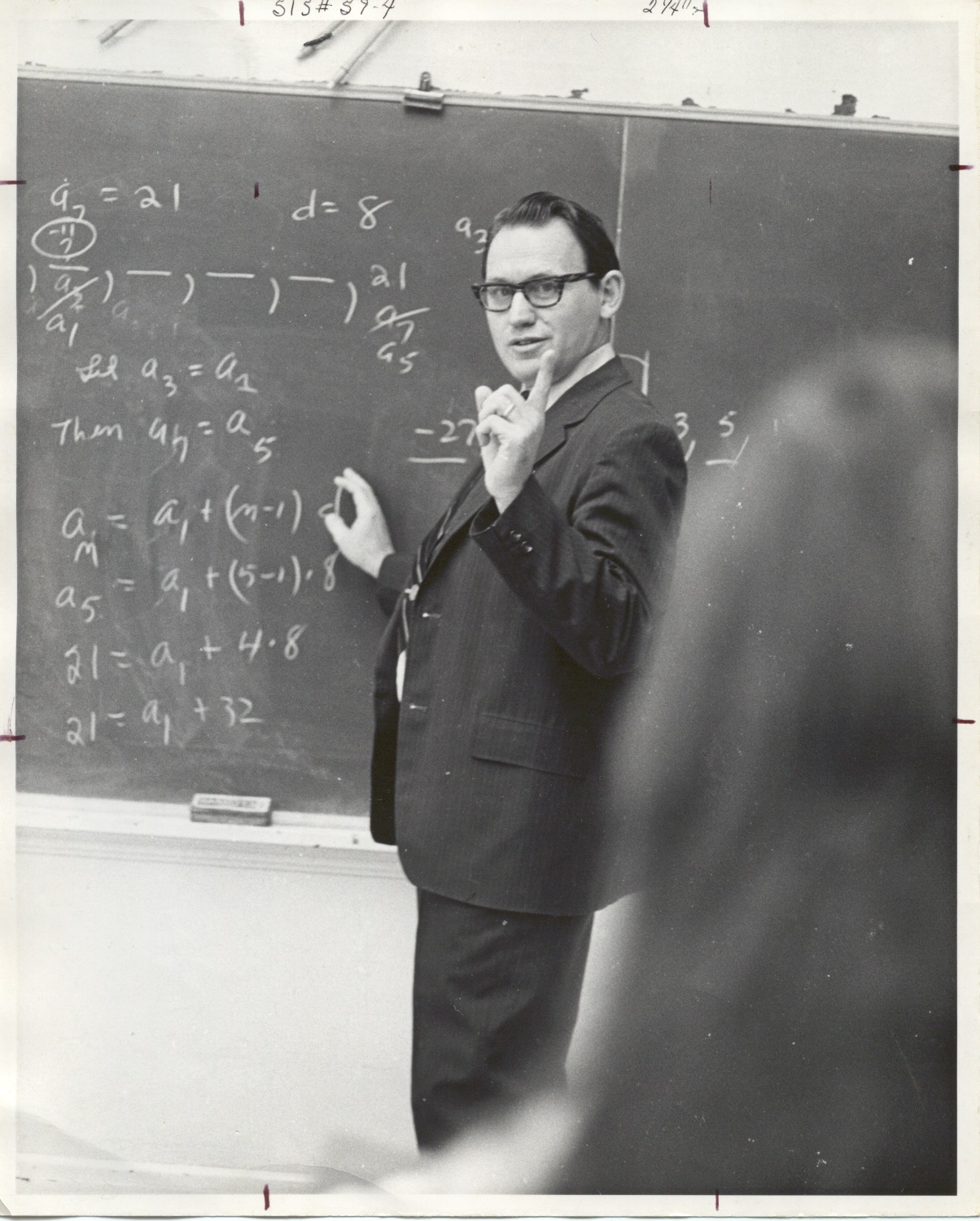
Teaching At W-L, Early 1970s
One of the finest students I taught at Washington-Lee was Susan Muskett. She asked me if I would write a college recommendation for her and bring it in to school with me. Normally I would give these to the guidance counselors or mail them to the colleges the students were interested in attending. But this time, she insisted that I give it to her personally. I knew she was a fun-loving person, so I wrote one that was very negative. I took it to her at school, and after she read it she came up to my desk with a red face, and asked me if I was serious. I took it back from her and gave her another one, the genuine one which I knew would make her very happy. The next day she asked me if I still had the copy of the first one. I still had it but I assured her I had done it for fun and didn't mean anything by it! She then told me that her mother had thought it was very funny and wanted it to use for fun at the family dinner table. There were around ten children in the Muskett family. I can only imagine the prank that was played with that letter!
Later Susan's mother told me she was going to punish me by making me teach all of her children. I had the privilege of teaching five of them. One of Susan's brothers came back to teach at W-L and was also the head football coach for a few years.
Susan went on to Georgetown University, graduated with honors, and received her Law degree from the University Of Notre Dame. She worked for the U.S. Commission on Civil Rights for several years, where she worked on issues surrounding Latinos, Native Americans, and children born with disabilities. Today, if you get a copy of the National Right to Life newspaper, you may see her picture there, for she is the Legislative Counsel for the organization.
Several of my former students came back to Washington-Lee to teach. I had not only had the privilege of teaching them, I got to serve on the staff with them as well. None of them became Math teachers there, but I do know of one who became a Math teacher in another high school in a neighboring county. Her counselor told me that she had said that if she ever encountered a problem in the classroom, she was going to do what Mr. T did. My students started calling me Mr. T early on in my career.
Many of my students went on to Christian colleges and universities, including Liberty University, which I highly recommend. Once, a colleague of mine in the Math Department began giving me a hard time for refusing to join the National Education Association, calling me a 'freeloader' because I received benefits without paying dues.
I refused to join the NEA for several reasons. First and foremost, I thought of them as a political organization. Also, to join the local association I would have to join the State and National organizations. I didn't like reading the newspaper or watching the news and hearing that the NEA had endorsed a candidate for president or for a local office such as a county supervisor or a school board member, even if they were the candidate I would choose. Finally, after years of harassment by this coworker, I told her that if she pestered me about it one more time, I was going to write a check in the amount of the dues and send it to Liberty University. I was going to show her the check, place it in the envelope, and have the secretary mail it. I would even show her my receipt afterward to prove I had gone through with it. She never bothered me after that! We did remain friends, which made me happy.
None of the students I have mentioned so far were my most important pupil. That's because I had the joy of teaching my own son, Steve, in Algebra II Trigonometry. In class, you would hardly know he was my son. When we had our first test, I heard some of the other students ask if he'd seen a copy of it. He just shook his head no. Later in the year, Steve was absent one day, and I took the opportunity to tell the class that I kept all of the tests away from him. Then I told them that if I laid a copy of the test with answers on the table, and Steve saw that it was a test, he wouldn't look at it. I avoided doing that, though, because I didn't believe in tempting him. The rest of the class told me that was a wonderful compliment to my son. I never told him about our class conversation that day; when he reads this he will finally know.
The next year, I had my daughter Beth in my Geometry class. The second day of school, she didn't show up. I knew she was in school, because she rode with me earlier that morning. I asked the class if they knew where she was. They told me she was in the counselor's office getting her schedule changed. There was great laughter when I said, "I guess one day in her dad's class was too much". I later learned that she had a conflict because the Honors English class was the same period and it was the only time it was taught. Anne was the smartest of my three children: she never had me as her teacher, hahaha! Our three children all graduated from Washington-Lee, three years in a row.
Steve, Beth and Anne were all wonderful kids, good-looking and trustworthy. We were proud of them. We all survived the rigors of being a family with high standards and a low budget. We are happy we were able to spend time with them, especially due to Nancy's willingness to sacrifice other things, and feel that it is the most important gift you can give your children.
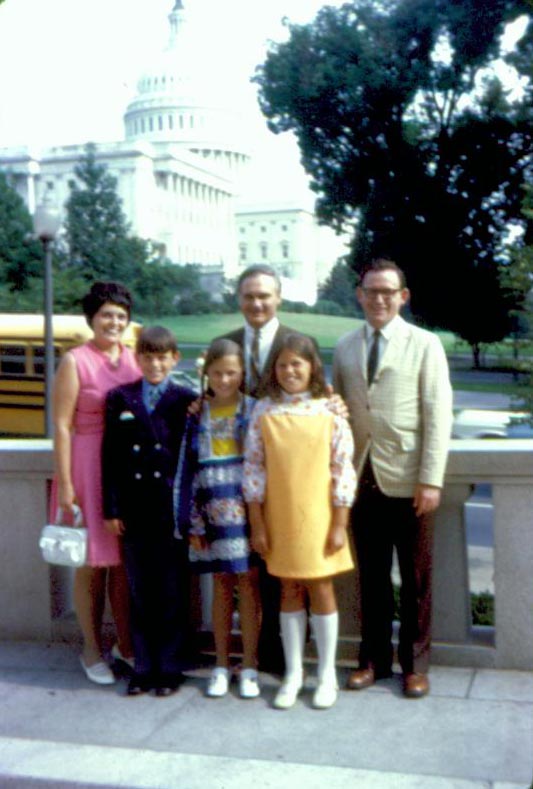
My Family With Congressman Latta
I almost always worked at least one part-time job in addition to teaching. In the early 1970s I worked in Congressman Delbert Latta's office one summer, and he invited our family to tour the Capitol and House of Representatives. The kids really enjoyed that summer, since we were able to afford a pool membership for them, and in those days, they could walk over in the morning, swim all day, and walk themselves back at supper time.
Another part-time job of mine was at the Arlington County Public Library's central branch. They had a wonderful children's section, and often I would take one of the kids with me. There, too, they had the freedom to browse and read by themselves, and were even encouraged to be there on their own. How times have changed!
Beth fell in love with the "Fairy Book" series: volume after volume of color-coded collections of classic fairy tales. Her favorite was the Blue Fairy Book. She would find a little reading nook there in the library, and curl up there with a beloved volume. All of the kids cultivated a love of reading.
Many evenings, after we moved to Arlington, I would tutor in Math as a private tutor. My kids had to keep quiet and stay out of the dining room while the session went on, which was not an easy thing to do, since the small kitchen and side door was right off that room. Sometimes, children being tutored were their friends or acquaintances. When they were older, I think they enjoyed hearing my tutoring and all the old familiar terms and examples I gave. I had a stock of illustrations for math processes. I'm sure some of the giggles I overheard from the kitchen were my own children's amusement at their dad's way of teaching.
While the kids were young, in Arlington, Nancy wanted to be home during the day, so she began a Family Day Care business. She had one or two babies or preschoolers, all day, and school-age children before and after school. Some of those children and their families became close friends. The internet has allowed us to be reconnected today; I am still "Bud-Dad" to them and Nancy is "Nanny". Our kids learned a great deal about babies and small children from their roles as surrogate big sisters and brother. In later years, when Nancy went back to teaching, they would lament at Christmastime that we didn't have any little kids around, and they sometimes threw a party for the former child care kids just for fun.
In 1976, I started working part-time for a friend in his ladies' shoes store. Three years later, I rented the branch that was six miles away, the Heel 'N Toe on Braddock Rd. After the corporation sold the stores, we bought it and called it "Shoes by Nancy". We operated the store for 16 years. Beth was our first employee; after she married and had a baby, Nancy and Steve did stints in the store, too. We were able to finance college for our kids because of the store; especially Anne, who attended George Washington University at this time and was the only one to complete college in her early twenties.
I would often go to work in the store after school and on Saturdays. We were closed on Sunday. I kept the books and hired an accountant to do my taxes at the end of the year. In the evening I was able to work in the stock room on schoolwork and grade papers. We also had several high school students work for us part time after Nancy went back to teaching. We were blessed in that we were able to collect from every customer who wrote us bad checks, and only had to go to court twice over it. One lady showed up in court carrying the handbag that she had stolen from us!
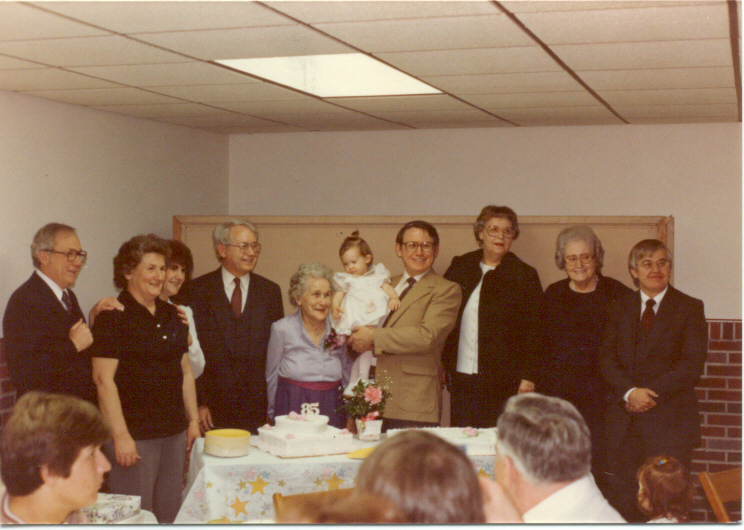
My Mother's 85thBirthday - 1983
Steve spent a few years in the Navy, then came home and worked at the shoe store full time for a while. He and Nancy did a great job there and made my work much easier. Steve brought his dry sense of humor to the workplace, and when he would get bored, compiled a list of "Snappy Answers to Stupid Questions", which he kept under the counter for comic relief. He was always nice and helpful to the customers, but after hours, we'd share some laughs about the silly things that happened that week.
Once a customer came in and saw "8N" above a rack. She asked what the N stood for. Naturally Steve told her it was for "Narrow"; on his list he wrote, "N-Nitwit". Another lady wanted to know what "man-made material" meant. He explained it and then wrote on his list, "that is the Spanish phrase for leather". When a customer asked, "Where do I save?" he jotted down two answers: "At the Bank" or "Only Jesus Saves". Probably the funniest was when a lady came in and asked, "How do you get to Shoe Town?" He wrote, 'If you wait, our free bus will be here to take you'. You'd have to know Steve and his sense of humor. I can't think where he might have gotten it from!
One day Steve had a customer who was upset with him. It must have been something unfair on her part, because we were always willing to help customers with any reasonable requests. We tried to treat them the way God would want us to. She angrily told him that she was going to tell all of her friends not to come to the store. As she stormed out, he muttered to himself, "Both of them".
My beloved mother died peacefully on New Year's Eve, 1983, at the age of 85. She had called me around Dec. 20 th , to ask me if I were coming home for Christmas, which was unusual for her. Because of the weather and distance, I told her that I wasn't going to make it, but we planned to come for her birthday in March. I think she had a premonition that she wouldn't live until her next birthday. My sister and her husband had gone out for something, and came back within the hour to find her lying on the sofa, the washing machine running. Just like my mother, to work until her last breath! What a wonderful way to depart this life and immediately be with Jesus, our wonderful Savior!
Our first grandchild, Carolyn Adele, was born April 7, 1980. We were typical new grandparents. We had an advantage of being rather young, 44 and 48 years old. These were the "good old days" to us, when our children grew up, married, and had babies to bless us all.
Carolyn was a fine, pretty baby with hair the color of a copper penny. When she was born, 'Uncle Steve' was in the Navy and 'Auntie Anne' was in college. We almost fought over who got to hold the baby. As she grew, she kept us entertained, with sage remarks and a zest for life she still exudes today in her thirties. At age two, I took her with me to chaperone a dance at Washington-Lee, and she was the last one to leave the dance floor. When her mother's college-aged friends came to our door once, three-year-old Carolyn stated, "I told you, we don't have any beer here!" And you know what, she was right!
Eighteen months later, on October 8th , we welcomed a sister for Carolyn, Rebekah Lynn, into the family. She had more hair, dark brown, and looked like a little papoose. Rebekah was sweet and cuddly, a very loving little girl who grew to become a very caring, loyal person. As she grew out of infancy her hair changed to a dark ash blonde, which would get platinum streaks in it in the summer sun. When Beth and her husband, Osa, moved to San Diego, Rebekah fell in love with Shamu at Sea World. During the mid-eighties, Kool and the Gang had a major hit, "Cherish". But to little Rebekah, it was "Shamu". She had her own set of lyrics for the song.
In November of 1985, Steve and his wife Meg were blessed with an adorable baby girl, Nicole Alexandra, with blue-grey eyes and fair hair and skin like her mother. She was very bright and a little joy to be around. Nikki would attend pre-school, going with me to Fairfax Christian School, and was in the same class as her four-year-old little second cousin, William Thoburn. She followed in her parents' footsteps and became an early and voracious reader.
Virginia Grace Atwood was born sixteen months later, in March of 1987, to our daughter Anne and her husband, Mark. Ginny was a strong and pretty child like her mother, with the darkest hair and eyes, and tall and athletic. She was fun-loving and adventurous like her parents, and wasn't afraid to make her own rules if required. She did well in school and was able to attend Fairfax Christian for some years. She looks like Nancy did as a young woman. The resemblance is sometimes startling.
Ten months later, in January of 1988, Beth and Osa presented us with their third daughter, Eowyn Emily. They had just moved from San Diego to St. Mary's County, Maryland, so that Osa, a Navy helicopter pilot, could attend the U.S. Naval test Pilot School. Eowyn almost didn't arrive, as she was three-and-a half weeks late. She was a big baby (having an extra month in the oven!) but turned out to be a tiny child. Once when Beth and the kids came for Easter, Eowyn slept with Nana in her bed, and Nancy said, "It's like sleeping with a little bird!"
Rebekah began taking Ballet and Tap at age six, when Eowyn was born. Rebekah started 'teaching' Eowyn to dance as soon as she learned to walk at one. Carolyn, taking Jazz, helped out, too. Eowyn began taking formal dance lessons at age seven, and she is still dancing today, with her new studio opening in Salt Lake City this fall.
We were extremely blessed with our five beautiful and charming grand-daughters. They made such a pretty picture, lined up like stairsteps in their Easter finery or Christmas dresses. Nancy especially enjoyed all the 'girl time' with them and their mothers, who were all close friends.
Imagine what a change in the atmosphere in November of 1990, then, when Nathaniel Thoburn Fitch was born weighing 9lbs 11oz ! Despite Beth swearing she was going to raise a gentle boy, Nate came bouncing onto the scene, the "Powerful Pudding" as his daddy called him. With three big sisters to dote on him, he was very loved and perfectly at home in a world of girls. When he was four, and Beth and Osa returned from Japan to Maryland again, he loved running and playing on their rural two-acres full of trees and bugs and frogs. Nate grew into a handsome, hairy hunk with a brain that she says often left his poor mom bewildered for answers.
Imagine what joy and fun it brought us all, then, when eight months later, in July of 1991, Christopher William Atwood was born. He was a sweet little boy with blond hair and the same beautiful dark brown eyes as his mother. Sensitive and thoughtful, even as a toddler, Christopher displayed a love of good music and a natural talent for it. While he was still in diapers, classical music would set his feet to dancing. Christopher also inherited his Pappy's gift for playful pranks. It was really cute at Christmas to see Nate and Christopher run through the house with excitement! When they were still very little boys, Beth remembers them opening some kind of new toy or game, and Christopher shouting, "Get the DESTRUCTIONS!"
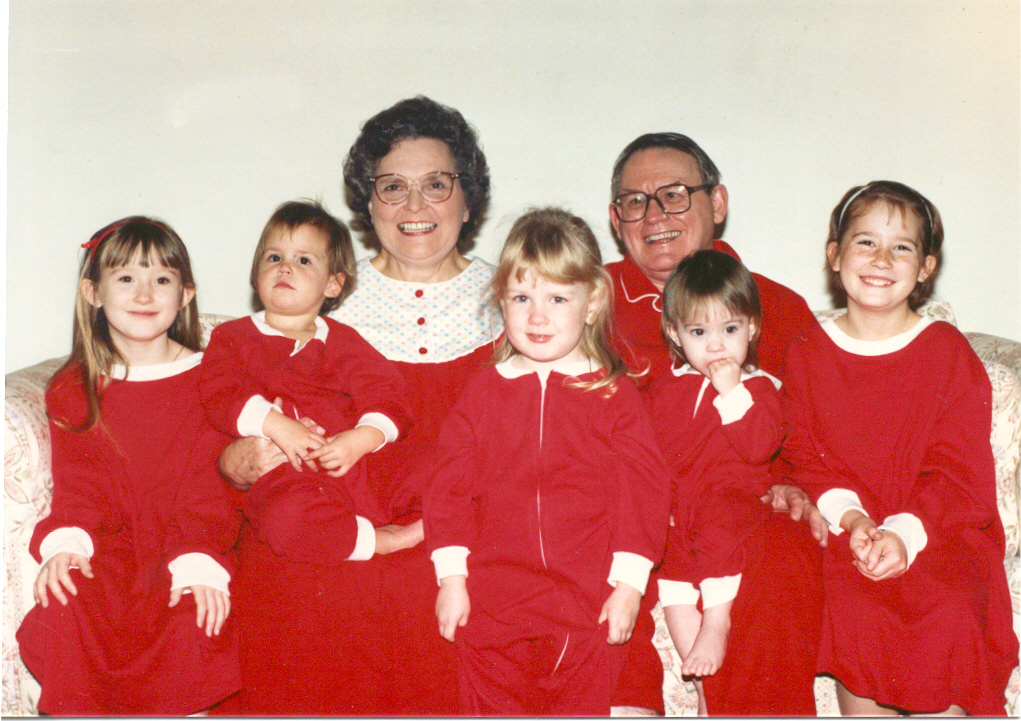
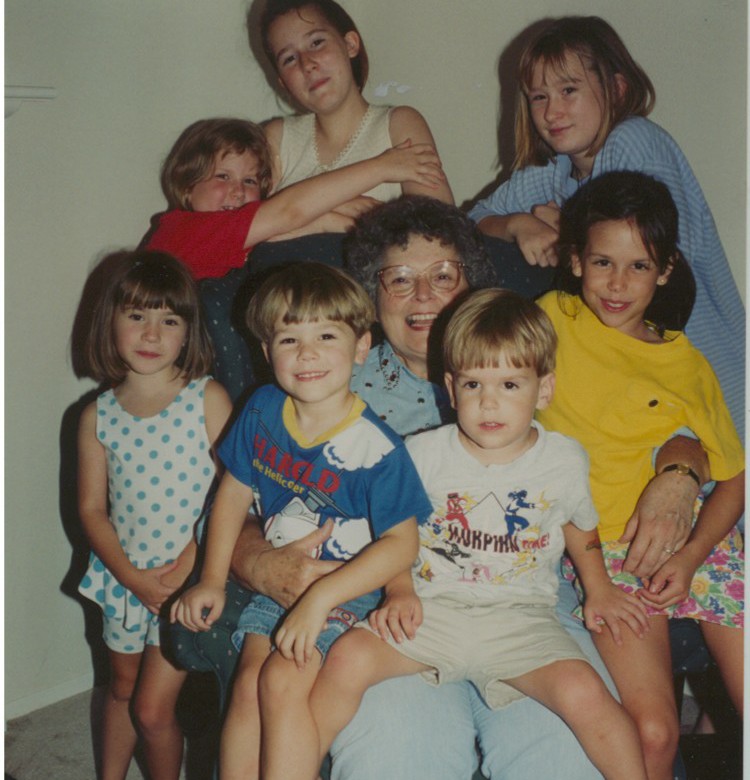
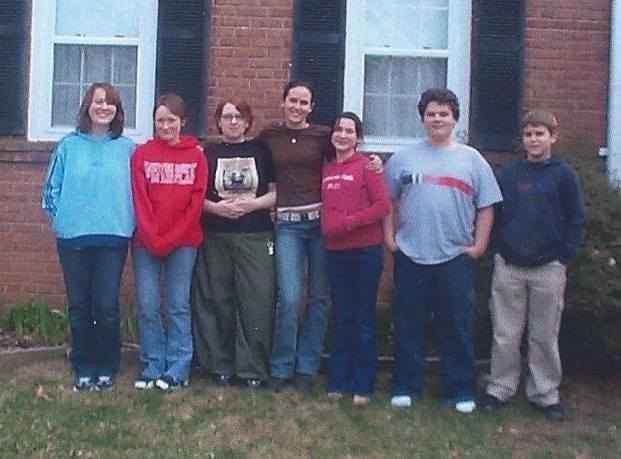
In a little over ten years, we were blessed with seven wonderful grandchildren. We were still young enough to enjoy them and be involved in their lives. To us, they were little sunbeams of joy.
They are grown now, and we are old. They are accomplished, talented, and of good character. The three oldest are married to fine young men. We look forward to Ginny, Eowyn and Nate's future happiness in their companions, too.
Part 10: The 1990s to Present Day
About a week before I retired from full-time teaching in 1996, one of my colleagues asked me about the biggest changes I had seen in the school system over the past forty years. I think I could sum it up by saying that when I started teaching in 1955, we had the Ten Commandments on the walls. Prayer was permitted in school, even praying in Jesus' name. We even had religious assemblies where certain hymns were sung that had moral points to them, or historical significance.
As I am typing this I can look up from my desk in my home office and see a plaque hanging there titled, "MORAL CODE FOR SCHOOL CHILDREN". It was hanging in my classroom at W-L when I started teaching there in the 1960s. When they tore that part of the school down to replace it with a new addition, one of the custodians came to me and asked me if I wanted it to take home to keep. I said certainly! They recovered it out of the trash and gave it to me. My daughter Beth had the broken glass replaced and had the old frame fixed. There is just a small bit of water damage on the lower right hand corner. I was given to understand that it had been there since the school had been built in 1925, when it was presented by the Arlington Lions Club.
Now, in most public schools, you can't even mention the name of Jesus. Prayer is not part of the school day and the Ten Commandments have been replaced. I mentioned this in my farewell speech to the faculty at the luncheon when they presented me with a gift and asked if I had anything to say. The five rules I had observed in the school that morning, posted on the walls, were:
No Drinking No Drugs No Fighting No Smoking No Weapons
Now I believe they should add a sixth rule, No Bullying.
Most of my days teaching at W-L were normal days. I thank God for his blessings in allowing me to have a good relationship with my students and peers. It must have been evident how much I enjoyed teaching, and felt that it was God's will for my life, because students often told me that I must enjoy my job since I usually came to work with a smile and lots of energy for teaching. I remarked at times that I felt my job was really more like a hobby.
It's no wonder to me that we have more parents sending their children to private schools or home schooling today. Many are making a tremendous sacrifice to send their children to private or parochial schools, and I know of many who send their children to Christian schools despite the fact that they are not Christians themselves.
I thank God for the privilege I had of teaching in the public schools, but I pray that my great-grandchildren receive a God-given education.
Carolyn and her husband, Shingo Yamamoto, have three wonderful children and Nikki and Mitchell have one special little girl. We feel extremely blessed to be able to spend time with and enjoy our four great-grandchildren, Anika, Harley, Ema and Tobi.
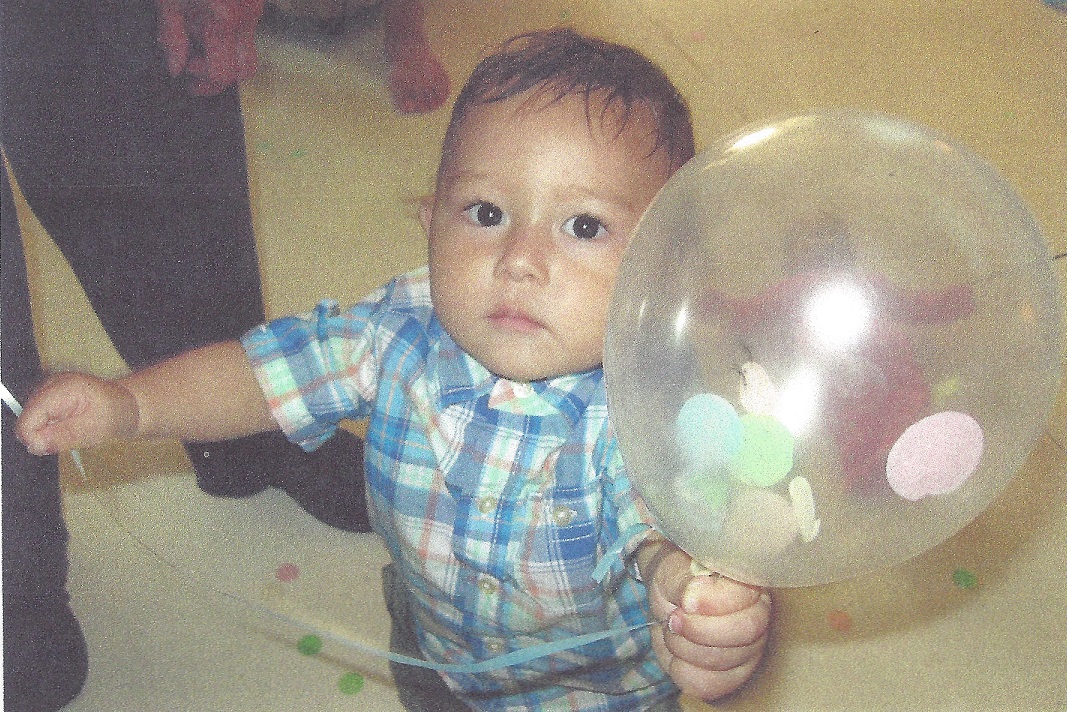
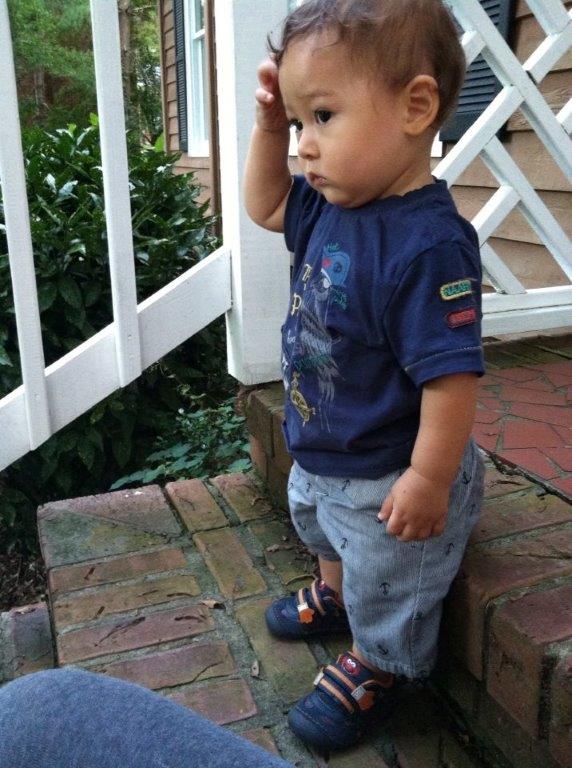
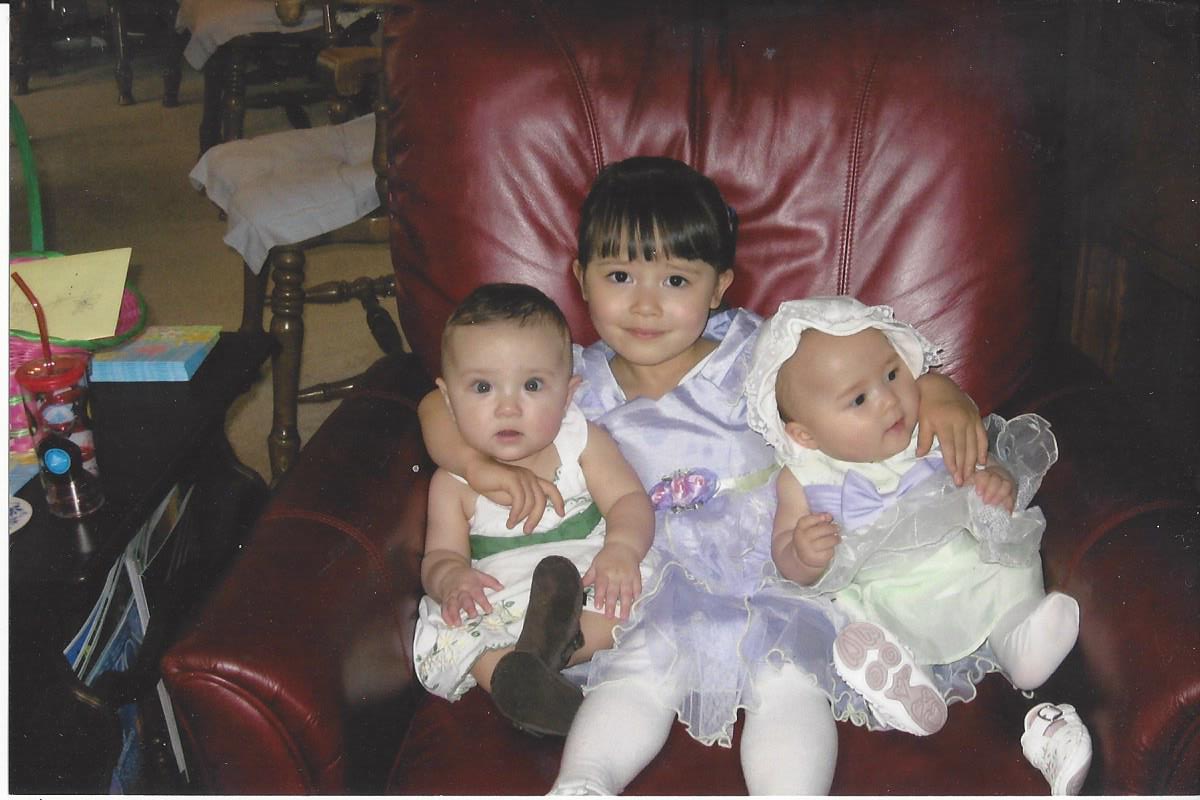
I was blessed to spend some time with my older sister, Venie, in January 2003, when Ohio State played Florida for the national college football championship. Don’t ask me the score. My daughter, Anne, surprised me and bought two tickets to the game even before we knew Ohio State would be playing in it. She thought we could sell the tickets while we were there and enjoy the eight days visiting with my sister in Phoenix. Venie was now living alone (she had been divorced by then) and in a wheelchair. I was amazed at how she was able to get around. Other than her legs, she was in good health. I was able to meet one of her sons, Ed, from Flagstaff. I really enjoyed my visit with him and his wife, and Anne enjoyed meeting another cousin. While there we visited the Grand Canyon. What a beautiful sight! Would you believe, my sister insisted on going with us! We even encountered snow in Flagstaff.
When she was eighty-nine she flew to Virginia to visit with us for two weeks. I will always cherish those few years when I really got to know her better. She died in 2011, on New Year's Day, at the age of 93.
Three years after retirement I went to teach part time at Fairfax Christian School. After two years there, I attempted to retire again, only to go back to the Arlington school system and substitute, as well as teach Geometry for three summers of summer school. I thought that I had finally retired for good in the spring of 2006, when Nancy and I moved twenty miles west to Sterling, Va. I didn't want to make that long trip back to Arlington in rush hour.
In the fall of 2008 I was asked if I would help students in our church school who were taking Calculus online. They didn't have a teacher to supervise them or answer any questions they might have. I couldn't refuse, since it was just one hour per day and only seven miles from my home. I could also take off any days that I needed to. They offered to pay me, but I refused, because the church means a lot to me and Nancy. We are Charter Members of Christian Fellowship Church, which was begun in 1978, and today has around 3000 in attendance.
Two years after that, in August of 2010, the headmaster of Oak Hill Christian School, my nephew Robert Thoburn (my brother Bob's son), called me to ask if I would come in to teach Geometry. I love teaching Geometry because you can relate it to so many areas of life, and it can be taught in a way that will glorify God. Once again, I really enjoyed that group of students and the opportunity to help influence the minds of teenagers.
The next year I went back and taught Pre-Algebra and Algebra II, followed by Geometry and Pre-Algebra for the 2012-2013 school year. I am reminded of the question my dentist asked me, about twenty-five years ago: he asked when I planned to retire. I told him, "Probably the day before the viewing". As long as God gives me health, and the guidance to do so, I will be willing to continue teaching.
In 2011, Nancy had major surgery on a hiatal hernia. Her entire stomach had to be repositioned because it had herniated into her chest wall behind one of her lungs. We felt really blessed because she ended up with one of the best thoracic surgeons in the world, Dr. Farid Gharagozloo, performing the surgery, using a new robotic machine. It took less than half the time of traditional surgery, and tiny incisions were made instead of giant ones. When she was recovering that evening in her room, somebody told her the extent of the hernia the surgeon found. Her eyes grew a little wider, and she said, "I didn't think it was that bad…". But that's Nancy. She is a real trooper!
As we were coming out of Dr. Gharagozloo's office once, we met his assistant, who immediately recognized me and exclaimed, "There is my Math teacher!" She reminded me that she had been in the same class as Sandra Bullock. That wasn't the first time we met one of my former students; just a few months before that in the Reston Hospital Emergency room, the doctor there was another one of my former pupils. When I had wrist surgery after a fall, I found a former eighth grade pupil of mine on the list of surgeons. Later I went to a post-operative check-up and when I finished, went to the desk to settle my bill. The office assistant said, "Mr. Thoburn, there isn't going to be any bill. The surgeon said that you were the best Math teacher he ever had!!" You can imagine how wonderful that made me feel! It's also very humbling.
In 2013, our beloved youngest grandchild, Christopher, went home to be with the Lord. He had bravely fought a battle with drug addiction for six years, from the time he was only fifteen years of age. I know Christopher is free now and is safely sheltered in the arms of Jesus, his Savior.
If you had the opportunity of knowing Christopher, you would have liked him for his wonderful smile, and the friendship he extended to everyone. He was a person full of life and liked to play pranks on people. I can't think who he was taking after!
At family gatherings, you could always count on Christopher to liven things up. There never was a dull time when he was around. He had the ability to make up funny things on the spot, and was always quick to laugh with anyone who wanted to share in his fun spirit.
But more than that, Christopher had a kind heart and was always willing to help others, especially those who were less fortunate. He would call his dad and ask if he could bring a homeless person home with him, to sleep on the couch so he wouldn't have to sleep out in the cold. He was good to Nana and me when he was at our home. The last summer, he visited us for lunch, and wanted to talk about Creation, a subject he knew Nana enjoyed. We spent a long time talking about scripture and really enjoyed his contributions to the conversation.
A few years ago at Christmas, he wanted us all to sing, "Count Your Many Blessings", and the whole family gathered around to do so. What a precious memory that is!
Sometimes he would be visiting and I would be sitting in my favorite chair in the living room, and he would get on my lap. I would say, "Christopher, you are heavy!" He would respond, "Pappy, I just wanted to give you a bear hug!"
Christopher, I wish you were here to give me another one of your hugs, but I know that you wouldn't want to leave where you are to come back to this very sinful world. All I can say is that Heaven is more real to me today than it has ever been. I am looking forward to seeing you there with so many other loved ones and friends.
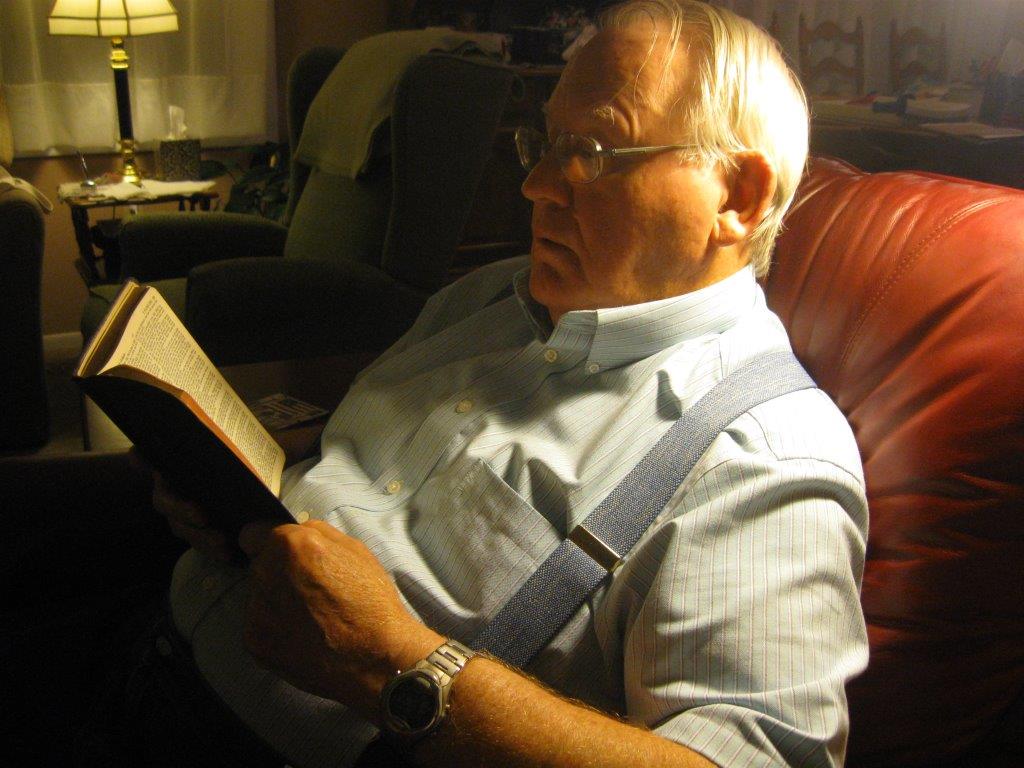
Tater Reading His Bible in 2014
~Proverbs 3:5-6~
Trust in the Lord with all thine heart;
and lean not unto thine own understanding.
In all thy ways acknowledge him, and he shall direct thy paths.
Last year, I promised my dad that I would help him finish his book. Being nothing if not persistent, he reminded me frequently over the winter of 2013-14 that I had done so. In February, I read his rough draft while visiting. He and I and my mom all sat down to have a brainstorming session about it. I made him another promise then: I would get his book ready to print by his birthday in June.
Life has its way of throwing all kinds of extra stuff at us, and June came and went, and I was still editing and tweaking Dad's rough draft. His stories would pique my curiosity, and I would ask him about the details, or do a little research, and found that there was always something more to say. I was discovering what a rich, fulfilled life my dad has lived!
As I sit here to write this Afterword, I am taken back to that sunny February day in Mom and Dad's sunroom in Sterling, when I had just read his story the night before. I was overwhelmed with one all-encompassing thought: this account was my dad's testimony. I told him that was my impression. Tears filled our eyes as he affirmed this and from then on, our driving purpose has been to relate the events of Dad's life so as to glorify God to the utmost.
To my dad, Jesus Christ is just as real as anyone. He believes the scriptures from Genesis to Revelations. Many places in his rough draft are punctuated with, "To God be the glory", or "Praise God!" He could recognize God's help and guidance in so many instances.
From his birth in the old farmhouse, my dad was blessed with a mother who genuinely loved God and tried to live as Jesus Christ would have wanted her to. Her example to all of her children left a legacy that will echo through the ages. This little, humble farm woman had reserves of inner strength that amaze us today. Her faithfulness and trust in her Lord are precious treasures which we have inherited, blessing us sometimes even in the midst of the deepest grief.
The beautiful farm with its springs and fields was a Heaven on earth to Dad, and there he didn't feel that he had disabilities, only possibilities. He loves nothing more than to return to the old place, where he once again is simply "Bud".
When Dad left home for the first time to attend Ohio State University, he had to be frightened and unsure of his future. God gave him a loving big brother, Harold, who mentored him and walked him through each step until he was able to stand on his own two feet.
When Dad needed spiritual nurture, he was blessed with a pastor who loved him like a son, and welcomed him into the church community with open arms. Dad's growth as a Christian during those years would stand him in good stead throughout his life's work.
In the move to Virginia, God challenged my dad and mom to go out in faith many times, and because of the opportunities provided by another brother, Bob, they became confident, capable career teachers. They were instrumental in the founding of an independent church congregation, and a Christian school. They blessed us kids with wonderful educational opportunities which carried over to our children and grand-children too. It's impossible to say what this has meant in our lives.
Dad didn't separate daily life from his walk with Jesus. His Bible was kept on his desk in his classroom, because he read it during his lunch hour. Though he was not permitted to talk about it to his students in the public schools, he insisted on this small privilege as one he would never be too embarrassed to exercise. In any failing, or trial, Dad would always end up acknowledging God and his own need for His forgiveness and love. He was helped in this by my mom, herself the daughter of a loving, Christian mother.
I often tell Mom that she needs to write about her family, as well. Her heritage would influence her life with Dad, too; and together, they were beautiful examples of devoted Christians, and truly decent human beings.
It has been difficult to avoid over-use of the words "blessing" and "privilege" in this book. My dad's life has been filled with the rich gifts only God can give: a sense of His guidance and presence every step of the way.
Dad and Mom's youngest grandchild, Christopher, went to be with the Lord in February of 2013. He was only 21. My nephew's amazing and too short life is a story all its own, and is for someone else to tell, but I watched my parents once again face tragedy with steadfast faith, and the indomitable courage that comes from knowing that God sees, and God cares. Dad still can hear Pastor Davis' voice singing, "His eye is on the sparrow, and I know He watches me". These voices bless us, in ways which cannot be numbered.
Elizabeth Thoburn Fitch
Clements, Maryland
July 23, 2014
Site prepared and managed by Steve Thoburn
© 2014